KRN Shareholders
April 30, 2022 - Toronto Star Article - This Canadian mining company is sitting on billions worth of potash. Inside the battle that has angry shareholders alleging vote rigging and stock sabotage
The Toronto Star has published an article about this mess.
We ask all who click here to sign up for their fees to see the full article. It is well written and worth the wait.
PS. Some people on the BullBoards are already slamming the article. Remember they are all accountants who make up all of Karnalyte Resources Staff, board and posters on the Bullboards. Accountants do not know how to run mining companies, they know how to count.
April 30/22.
ALSO, SEE TORONTO STAR ARTICLE Link above
Leaked Pre-AGM Voting Tallies
Resulted in Votes Changed to
ensure KRN Board re-election in 2018......
To KRN Shareholders and whomever else it may concern:
Leaked 2018 KRN AGM voting information has been revealed to the
KRNShareholders.com website. It shows how numerous votes were
changed by AST/ D.F.King (now TSX TRUST) with the re-use of the
control number after shareholders voted - from WITHHOLD ALL to
ABSTAIN*. ABSTAIN was not even an option on your ballot. * Abstain =
not counted.
The information taken from the KARNALYTE RESOURCES Inc. website, (in
red ink below) clearly shows how D.F. King was paid a bonus to
ensure that enough votes were manipulated to re-elect the existing
board. It appears that someone at the head of Karnalyte ordered
multiple vote manipulations to ensure their re-election, using
shareholders’ money.
History of KRN 2018 Election
Vote Manipulation Strategy:
2018 - Jan - April - KRN board rejected nominations of 6 extremely
qualifed shareholders seeking board seats in order to ensure
re-election of the existing board. [Court described this suppression
as corporate terrorism
LINKS: [2020 ABQB 119]. [2021 ABQB 26]
2018- May 28 - KRN board initiated court actions against shareholders Robin Phinney, Dave Van Dam and Dan Brown claiming defamation of board on Stockhouse Bullboard and illegal proxy solicitation. Phinney, Brown and Van Dam were cleared of these charges by the court [2020ABQB 119 Page 25 VII Conclusion]
2018 - May - KRN board gained access to voting numbers to date and
realized that they didn’t have enough votes to win an “uncontested”
election (50% +1 vote
required)
2018 May 29 - KRN engaged D.F. King, a subsidiary of AST (now TSX
TRUST) to “ensure” an election win, posting this action on their
website:
“ABOUT D.F. KING:
The Company has engaged the services of D.F. King, a division of AST
Investor Services Inc. (Canada), as its proxy solicitation
and information agent. Engaging a proxy solicitor is very common for
publicly traded
– companies as it helps facilitate shareholder engagement in the
governance of the company. Initiating a targeted shareholder
engagement effort supports shareholder democracy by ensuring that
all shareholders, despite the size of their holdings, receive
timely, current, and comprehensive
information about the Company and the matters to be voted on at its
shareholder meetings. D.F. King has been engaged at an anticipated cost of $125,000 consisting of a base fee of $50,000 and an additional fee of $35,000, if management’s nominees are elected and each of the resolutions recommended by management is passed, and a further
$40,000, based on the number of votes cast in favour of, or withheld from voting for, each of management’s nominees. The total potential cost will be borne by the Company. “
- From the May 29, 2018 Press Release, Karnalyte Resources
Website
2018 May 29 - Jun 7 - On instructions from KRN, D.F.King issued a
second
election yer 4 1/2 days prior to the AGM, targeting major
shareholders only With full access to voter response to date, KRN
Board could see that they had
approximately 7.4 million votes in their favour with the potential
of 10.5 million
votes against them. On instructions from KRN Board representative,
D.F. King
started changing voter positions from WITHHOLD to ABSTAIN in order
to swing
the vote to the favour of the existing board. D.F. King failed to
check the names
of the shareholders for whom they were manipulating votes. MANY of
the victims
were members of the founder Robin Phinney’s family and close
friends. They
voted to WITHHOLD, not Abstain. The vote records supplied by Mr
Frank
Wheatley Exhibit #2 clearly show the original votes cast. CIBC
records, however,
show a number of those family members as having Abstained. Copies of
their
Voting Control sheets prove otherwise.
C ross referencing the names of those who were later reported as
appointing
management as proxy designate, provides further evidence of vote
tampering.
***** Proof of pre-election vote proxy monitoring:
(Leaked to krnshareholders.com Jan 14/22 )
“Confidential
From: **************
Sent: Tuesday, September 25, 2018 10:18 AM
6. On May 29, Robin Phinney was granted proxies for 1,954,599 shares;
7. On May 30, Robin Phinney was granted proxies for 209,842 shares;
8. On May 31, Robin Phinney was granted proxies for 1,127,227 shares;
9. On June 1, Robin Phinney was granted proxies for 69,029 shares;
10. On June 4, Robin Phinney was granted proxies for 29,818 shares;
11. On June 5, Robin Phinney was granted proxies for 552,662 shares
[Total = 3,943,177];”
According to F Wheatley affidavit, the company took it upon itself to disqualify over 4 million votes during the election which the above email clearly states had been authorized by the ASC to be counted]:
.
(April 30/22 - Further recent court testimony revealing vote
manipulation to follow............)
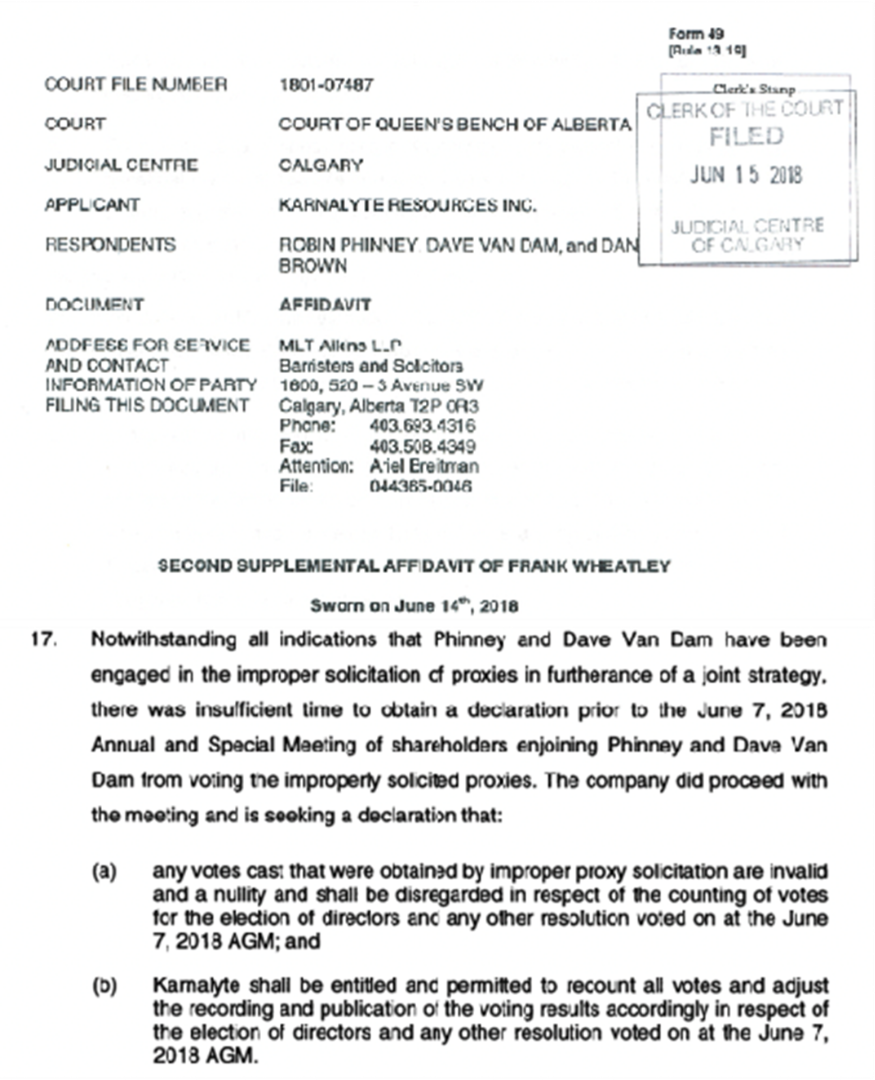
Knowing that AST/D.F. King and KRN Management changed the votes in the KRN election of officers in 2018...........
We have proof that the proxy voting system at AST/ TSX TRUST is not secure.
We know first hand that our securities regulators are not protecting shareholders.
We know that the major banking institutions are not protecting their investment clients.
We know that foreign take-over of a prime Canadian natural resource is being permitted to happen with no investigation at any level, so.........
....The Multi-million Dollar Question is:
How many other companies in Canada have had their voting results intentionally manipulated too?
Who can we trust? Who is blocking this investigation? Is this bigger than WorldCom Scandal?
Thanks again for your efforts to help our company realize its full potential.
Stan Phinney, Shareholder.
(Also see www.krnshareholders.com)
------ Original
Message ------
From: [email protected]
To: [email protected]; [email protected];
[email protected]; [email protected]; [email protected];
[email protected]; [email protected];
[email protected]; [email protected];
[email protected]; [email protected]; [email protected];
[email protected]; [email protected];
[email protected]; [email protected]; [email protected];
[email protected]; [email protected];
[email protected]; [email protected]; [email protected];
[email protected]; [email protected]; [email protected];
[email protected]; [email protected]; [email protected];
[email protected]; [email protected]
Sent: Thursday, January 27, 2022 10:26 AM
Subject: Fwd: voter fraud
STILL WAITING FOR ANSWER
APPARENTLY YOU DON'T LISTEN TO THE COURTS ALSO
WOW, WOW, WOW
WWW.KRNSHAREHOLDERS.COM

Via Courier
Alberta Securities Commission
Suite 600, 250-5th St. SW Calgary, Alberta, T2P OR4
Dear Sirs/Mesdames:
Voting Irregularities at Annual General and Special Meeting of Karnalyte Resources Inc. held on June 7, 2018 in Saskatoon, Saskatchewan
We are local counsel to Robin Phinney, an individual resident in the Town of Okotoks, in the Province of Alberta ("PhinneV') in connection with the solicitation of proxies in connection with an annual general and special meeting of the shareholders of Karnalyte Resources Inc. ("Karnalyte"), which occurred on June 7, 2018 (the "Meeting") in Saskatoon, Saskatchewan.

 We are writing in order to draw your attention to certain voting irregularities that we witnessed at the Meeting. We are concerned with both the number of shares that voted at the Meeting in favour of management's proposed items of business, as well as a number of votes for dissident shareholders which appear not to have been counted. We are also concerned with the conduct of management of Karnaltye and their attempts to intimidate possible dissident shareholders.
We are writing in order to draw your attention to certain voting irregularities that we witnessed at the Meeting. We are concerned with both the number of shares that voted at the Meeting in favour of management's proposed items of business, as well as a number of votes for dissident shareholders which appear not to have been counted. We are also concerned with the conduct of management of Karnaltye and their attempts to intimidate possible dissident shareholders.
Firstly, voter turnout has historically been relatively high for annual meetings of Karnalyte, falling between 12.17 million and 16.04 million shares voted since 2014, with an average of 14.42 million shares during the years 2014 to 2017 inclusive, representing slightly more than half of the shareholders of Karnalyte. However, the number of shares voted at the Meeting were an unusually large aberration from historical norms. At the Meeting, the shares voted were 18.25 million, representing almost 2/3 of the shares of Karnalyte and an increase of almost 4 million shares voted as compared to the historical average, or close to a 30% increase from the historical average. This was especially surprising given that many of the shareholders that Phinney spoke with had not received their proxy materials prior to the Meeting and the mailing of the Meeting materials appears to not have happened until the 21st day prior to the Meeting (based on the certificate of dissemination filed on SEDAR by the transfer agent for Karnalyte), being the very last day when materials could have been sent out in compliance with applicable securities laws, allowing for the minimum amount of time possible for shareholders to receive their proxy materials and vote their shares.
In addition to this, Phinney had been in contact with various individuals regarding voting their shares against the matters put forth by management and was also independently contacted by various shareholders that he knew personally and who provided him with evidence that they had voted their shares against management's proposed items of business. When Phinney attended the Meeting and asked the scrutineer for the numbers represented by these shareholders, the numbers provided to him did not match those that he was expecting based on the evidence presented to him ahead of the Meeting. The shares represented by dissident shareholders that Phinney knew or had been in contact with appear not to have been counted in many instances. In addition, most or all of the additional shares that voted
T 
at the Meeting appear to have voted in favour of management's proposals. It is also noteworthy that management hired a proxy solicitation firm, D.F. King, despite the fact that there was no active proxy battle and that Phinney did not even obtain an order from the Alberta Securities Commission to solicit proxies until less than a week prior to the Meeting. It is noteworthy that D.F. King is a company affiliated with AST Trust Company, Karnalyte's transfer agent, and therefore had access to the control numbers on shareholders proxies and was also able to reach out to shareholders who had previously voted and try to convince them to change their vote.
Lastly, management created an environment at the Meeting meant to stifle active discussion and debate and intimidate possible dissidents. Management hired a total of four (4) uniformed Saskatoon police officers who were present in the room during the Meeting and all of whom were carrying sidearms. Management could have easily hired a private security company if it had concerns about security at the Meeting, but instead chose to hire armed police officers in full uniform, which created a chilling effect on possible discussion and debate by the dissident shareholders about their concerns with how the company was being run and the actions of the management team. We can provide photographic and video evidence of the environment at the Meeting upon request.
It is also worth noting that my client, as well as another shareholder, David Van Dam, an individual resident in the Town of Kenora, in the Province of Ontario, both proposed certain nominees to be elected at the Meeting as far back as January, 2018, such nominees to be put forth as a shareholder proposal, and were rebuffed by management of Karnalyte as well as their counsel in such attempts. Often, management and their counsel would take a considerable amount of time to respond to these proposals and come up with various administrative or procedural reasons to refuse to include these proposals in any future annual meeting of shareholders of Karnalyte. These appear to be clear attempts to cause the proposals to fall outside of the applicable time limits for same and provide further reasons to deny the proposals being considered by the shareholders at an annual meeting of shareholders. As such, the actions of management and the board of directors of Karnalyte have been part of an orchestrated effort to entrench themselves and refuse to give the shareholders of Karnalyte the opportunity to have input on anything other than the status quo.
We would ask that the Alberta Securities Commission conduct an investigation into these allegations of voting irregularities and also be prepared to oversee any possible special shareholders meeting which may be requisitioned by Phinney in the near future.

 T
T
If you have any questions or concerns in respect of the foregoing, please do not hesitate to contact the undersigned. Thank you.
Yours truly,
EnerNEXT Counsel
Peter W. Yates (403) 971-9104 [email protected]
------ Original
Message ------
From: [email protected]
To: [email protected]; [email protected];
[email protected]; [email protected]; [email protected];
[email protected]; [email protected];
[email protected]; [email protected];
[email protected]; [email protected]; [email protected];
[email protected]; [email protected]; [email protected];
[email protected]; [email protected];
[email protected]; [email protected]; [email protected];
[email protected]; [email protected]; [email protected];
[email protected]; [email protected]; [email protected];
[email protected]; [email protected]
Sent: Tuesday, January 25, 2022 11:04 AM
Subject: Fwd: Fwd: Court case krn
BETTER READ THIS AGAIN.
WERE IS MY ANSWER
WWW.KRNSHAREHOLDERS.COM
------ Original Message ------
From: [email protected]
---------- Original Message ----------
Date: January 11, 2021 at 3:32 PM
Subject: Court case krn
Court of Queen's Bench of Alberta Citation: Karnalyte Resources Inc
v Phinney, 2021 ABQB 26
FILED JAN 11 2021
Date: Docket: 1801 07487 Registry: Calgary
Plaintiff / Applicant
Between:
KARNALYTE RESOURCES INC
- and -
ROBIN PHINNEY, DAVE VAN DAN and DAN BROWN
Defendant / Respondents
_______________________________________________________
Costs Decision
of the
Honorable Madam Justice BE Romaine _______________________________________________________
I. Introduction
[1] This decision addresses the issue of costs sought by two of the Respondents in the within action. My reasons for judgment are dated February 14, 2020 and can be found at 2020 ABQB 119.
[2] The Respondent Robin Phinney seeks costs on a “solicitor-client” basis, or alternatively on a scale that is a multiple of Schedule C costs as set out in the Rules of Court. Mr. Phinney was entirely successful in defending against the application brought by the applicant Karnalyte Resources Inc. He seeks solicitor-client costs on the basis that the conduct of Karnalyte,
Page: 2
including as described in my reasons, brings the fundamental issue of fairness and efficiency that
underlie the Rules squarely into play and justifies an award of solicitor client costs.
[3] Karnalyte opposes such an award of costs, submitting that the appropriate quantum of costs should be calculated on the basis of column 3, with appeal costs awarded for item 20(1) in accordance with item 8(1) of Schedule C.
[4] For the reasons that follow, I award Mr. Phinney solicitor-client costs inclusive of disbursements of $213, 513.19.
[5] The Respondent Dan Brown also seeks costs on a solicitor-client basis for many of the same reasons. Mr. Brown submits that Karnalyte’s motivation has been to weaponize this and other litigation against the Respondents in order to cause the Respondents as much expense and hardship as possible, both professionally and financially.
[6] Mr. Brown was substantially successful in the litigation, other than my finding that one posting he made on an internet chatroom on the day the application was filed constituted an unlawful solicitation of proxies. I found that Karnalyte had suffered no damages from this solicitation, and given Mr. Brown’s subsequent conduct, no remedy need be imposed against him.
[7] Karnalyte submits that Mr. Brown is not entitled to costs as he is an unsuccessful party, that each party should bear their own costs, or in the alternate, that Mr. Brown is only entitled to costs in accordance with Schedule C, column 1. Karnalyte also seeks costs for its written submissions on costs.
[8] For the reasons that follow, I award Mr. Brown solicitor-client costs of $49,649.50 inclusive of disbursements and other charges and dismiss Karnalyte’s application for costs of the costs submissions.
II. Mr. Phinney’s Application
[9] As Mr. Phinney was entirely successful, he is entitled to costs. The only issues are whether he is entitled to solicitor-client costs, and if so, in what amount.
[10] Mr. Phinney agrees with Mr. Brown that the litigation was conducted as a “weapon” in order to ensure that Mr. Phinney (and the other Respondents) were put to as much expense and hardship as possible, in a situation where the allegations against them were serious, as well as personally and professionally damaging.
[11] Karnalyte makes much of the fact that the application was not complex and was heard in a half day. However, this fails to indicate the history of the application and the voluminous briefs and materials that were filed by the parties in advance of oral argument.
[12] As noted by Mr. Phinney, the steps taken to move this matter from filing to hearing involved the following:
(a) Two Originating Applications (the second being an Amended Originating Application).
Each application was about 20 pages in length and included significant allegations of wrongdoing, including allegations that Mr. Phinney attempted to obtain a personal gain because of his prior position as CEO
Page: 3
of Karnalyte. I agree with Mr. Phinney that Karnalyte essentially alleged fraud against Mr. Phinney without using that term. The Amended Originating Application asserted that, during his tenure as Karnalyte’s President and Director, Mr. Phinney attempted to extract significant personal benefits as part of a proposed financing transaction between Karnalyte and its strategic partner and largest shareholder. Karnalyte states in the application that this attempt was ultimately rejected by the shareholder, and partially formed one of the grounds for Karnalyte’s just cause to terminate Mr. Phinney’s employment as President.
The application also asserts that Mr. Phinney’s shareholder proposal of March 27, 2018 was a clear attempt to redress past grievances, specifically Mr. Phinney’s termination as Karnalyte’s President, his failure to be re- elected as a Director, and his failure to obtain significant personal benefits as part of the proposed transactions between Karnalyte and its strategic partner and shareholder.
These allegations of significant wrongdoing by Mr. Phinney were unnecessary in terms of the issues in the application. They did not need to be addressed in the reasons for decision, and were not proved by the evidence before me.
(b) Four affidavits sworn by representatives of Karnalyte which were many hundreds of pages in length.
(c) Two affidavits filed by Mr. Phinney. Mr. Brown filed one affidavit and the Respondent Dave Van Dam filed two affidavits.
(d) Two full days of questioning on Mr. Phinney’s affidavits (and several more days as the other Respondents were questioned on their affidavits).
(e) Questioning of three non-parties by Karnalyte without prior notice to Mr. Phinney. Karnalyte did not provide Mr. Phinney with the transcripts of two of the questionings, nor did Karnalyte include these or the questioning transcript of Stan Phinney in the record it put before the Court although the transcript was later produced and referred to in the decision.
(f) An application filed by Karnalyte to gain access to unredacted versions of Mr. Brown’s telephone records, which was dismissed with costs to Mr. Brown.
(g) A contested adjournment application wherein Mr. Phinney and the other Respondents were successful in obtaining an adjournment and costs in the cause.
(h) A Norwich application brought by Karnalyte in British Columbia without notice to Mr. Phinney and without disclosure of any materials contained therein to him despite requests that this information be provided.
(i) A special application scheduled for a full day with lengthy briefs. In support of the application, a four-volume record was filed with the Court
Page: 4
totalling 4100 pages. Despite this, additional material was filed before and during the hearing.
[13] In addition to the complexity of the application as a reason for enhanced costs, Mr. Phinney submits that Karnalyte engaged in misconduct in the litigation, including the following:
(a) failure to advise Mr. Phinney that non-parties had been questioned, and delay in providing information about the questioning;
(b) obtaining an order without notice from the Supreme Court of British Columbia against the internet website that hosts the chatroom in order to learn the identity of “theend6543”, which Karnalyte had asserted in its application was Mr. Phinney’s alias. No party to the application received information with respect to the result of the Norwich order, which did not yield evidence that “theend6543” was Mr. Phinney or any of the other Respondents. Karnalyte refused a “with prejudice” request to disclose the material accompanying the application against the internet website and any resulting production;
(c) filing a late affidavit with the brief for the application, thus depriving Mr. Phinney of the right to cross-examine or respond;
(d) mischaracterizing the questioning evidence in its brief, as noted in the reasons for decision, not less than five times;
(e) misstating the number of telephone conversations between Mr. Phinney and Mr. Brown in its brief; and
(f) advising the Alberta Securities Commission that it would not be challenging the exemption order that had been granted to Mr. Phinney after the ASC objected on the basis of jurisdiction, and then, in its submissions, doing in effect exactly that, as I noted in the reasons for decision.
[14] The parties agree that the law in Alberta relating to the awarding of solicitor-client fees is aptly set out in Secure 2013 Group Inc. v Tiger Calcium, 2018 ABCA 110 at para 15:
Solicitor-client costs are generally awarded only when there has been reprehensible, scandalous or outrageous conduct by a party ... They are only awarded in rare and exceptional circumstances and may be available if misconduct occurs in the course of litigation ... A careful analysis of the facts is required...
[15] The Court in Tiger Calcium set out factors to be considered by a court at para 15, including the following relevant to this case:
a. blameworthiness in the conduct of the litigation;
Page: 5
b. when justice can only be done by a complete indemnification for costs;
c. where there was evidence that the appellant hindered, delayed or confused the litigation;
d. where there has been an attempt to conceal material documents and failure to produce material documents in a timely fashion;
e. positive misconduct, where others should be deterred from like conduct and the party should be penalized beyond the ordinary order for costs; or
f. untrue or scandalous charges.
[16] The Rules of Court also recognize as factors to be considered in determining an award of costs conduct that unnecessarily lengthens or delays the action or any of its steps, whether a party has engaged in misconduct, and any offer of settlement made, regardless of whether or not the offer for settlement complies with Part 4, Division 5: Rule 10.33(1) and (2).
[17] Relevant to the latter, counsel for Mr. Phinney, in a “with prejudice as to costs” letter dated March 29, 2019, correctly pointed out that Karnalyte’s pending 2019 Annual General Meeting rendered the outcome of the application moot. Karnalyte disregarded this letter.
[18] Given all these circumstances and factors, I find that this is one of the cases where justice can only be done by a complete indemnification of costs. Mr. Phinney’s claim for solicitor-client costs totals $213,513.19 inclusive of fees, disbursements and GST.
[19] Karnalyte submits that this amount is too high, and proposes a lower amount. It is noteworthy that Karnalyte’s 2018 “Management Discussion and Analysis” published on the SEDAR website discloses the following under the heading “Accounting and Legal”:
... expenses for the year ended December 31, 2018, ... [saw] an increase of $841,000 ... the legal expenses were principally incurred ... with respect to the filing by the Company of an originating application with the Alberta Court of Queen’s Bench seeking declarations from the court that the Respondents acted jointly and in concert to conduct various activities, including an illegal proxy solicitation, in connection with the 2018 AGM in contravention of the provisions of the Canadian corporate and securities laws, and that those proxies should therefore be disallowed. (emphasis added)
[20] Karnalyte’s submission that Mr. Phinney’s fees are unreasonable is untenable in the circumstances, particularly given that its own fees and disbursements appear to be considerably higher. Its complaint about the size of Mr. Phinney’s legal team is also not justified. I accept Mr. Phinney’s evidence that, between June 7, 2008 and May 5, 2020, he was represented first by Southern Alberta Law Offices, then Enernext Counsel and finally Borden Ladner Gervais LLP. Mr. Phinney was defending himself against serious allegations relating to his personal and professional ethics and entitled to counsel appropriate to the escalating litigation. I therefore award Mr. Phinney costs in the amount of $213,513.19.
[21] Given my decision, it is not necessary to consider the alternatives suggested by either Mr. Phinney or Karnalyte.
Page: 6
III. Mr. Brown’s Application
[22] Mr. Brown relies on many of the same factors that I have found justify an award of indemnification costs to Mr. Phinney. He also notes the following relevant factors:
(a) It is apparent from the evidence that Mr. Brown made repeated attempts to resolve issues with Karnalyte without resort to litigation. Months prior to the application, his counsel provided Karnalyte with redacted copies of Mr. Brown’s cell phone and home phone records for the material time period between May 1, 2018 and June 7, 2018, and a thorough explanation of any communications between Mr. Brown and Mr. Phinney on a without prejudice basis.
Karnalyte applied for unredacted copies of the records, and was unsuccessful in that application, with costs levied against it payable “forthwith”. Despite repeated requests, Karnalyte has not paid the cost award.
(b) The single posting that I found to be an unlawful solicitation of proxies was never mentioned in Karnalyte’s Amended Originating Notice. It was followed by Mr. Brown’s fulsome public apology.
(c) On June 29, 2018, Karnalyte filed a statement of claim against Mr. Brown claiming damages of approximately $1.4 million on the basis of defamation. As was the case with Mr. Phinney, Karnalyte alleged many of the same allegations in the application that it pleads against Mr. Brown in the defamation action. As in Mr. Phinney’s case, many of these allegations were unnecessary to the application, and unproven by the evidence before me.
(d) As Karnalyte failed to provide an affidavit of records in a timely manner in the defamation action, Mr. Brown brought an application to compel it to produce its affidavit of records and was successful, including with an award of costs payable “forthwith”. Again, Karnalyte has not paid the costs. Karnalyte submits that events connected with a separate application are not relevant to this application, but it is clear from the fact that the allegations set out in the defamation action were repeated in this application that the actions are related. Karnalyte alleged in the application that Mr. Brown posted defamatory messages “in furtherance of his strategy to support his improper solicitation of proxies”.
(e) Mr. Brown made a formal offer to Karnalyte for a consent dismissal order in regards to the remedies sought against Mr. Brown on January 25, 2019, on the basis that Karnalyte would pay Mr. Brown’s costs pursuant to Schedule C, column 2. Karnalyte did not accept the offer.
Karnalyte submits that this offer is irrelevant as it was partially successful against Mr. Brown. Although the offer does not support an award of double costs, when combined with Mr. Brown’s other conduct in the litigation, it illustrates his attempts to shorten or avoid the action.
Page: 7
[23] I note that Karnalyte claimed the following relief against Mr. Brown in its Amended Originating Notice:
(a) a declaration that Mr. Brown had engaged in improper proxy solicitation;
(b) a declaration that Mr. Brown was acting in concert with Mr. Phinney and Mr. Van Dam;
(c) a declaration that Mr. Brown failed to discharge his obligation to comply with the early warning system set out in securities regulation;
(d) a declaration that Mr. Brown failed to comply with the requirements of corporate and securities regulations with respect to solicitation of proxies, disposition of shares, filing of early warning disclosure, dissident proxy circulars, continuous disclosure obligations, proxy forms and collective and joint communications;
(e) a declaration that any votes cast that were obtained by improper proxy solicitation were invalid and a nullity and to be disregarded with respect to the counting of votes at the 2018 AGM; and
(f) a declaration that Karnalyte shall be entitled to recount all votes and adjust the recording and publication of voting results for the 2018 AGM.
[24] As noted, the only relief sought by Karnalyte with respect to Mr. Brown’s conduct that was successful was my finding that Mr. Brown had published an improper proxy solicitation on May 28, 2018. I found that the posting was the only evidence against Mr. Brown relating to proxy solicitation, that it was not evidence that Mr. Brown was acting in concert with Mr. Phinney before the posting and that Karnalyte suffered no damages from this solicitation.
[25] With respect to the other relief sought, I concluded that there was no evidence of Mr. Brown and Mr. Van Dam acting jointly or in concert in any way and that the uncontradicted and credible evidence of both was that they had never met, and had never communicated with each other. I found that there was no persuasive evidence that Mr. Brown and Mr. Phinney were acting jointly or in concert with each other.
[26] I further noted that, given that Mr. Brown had issued a full public apology prior to the AGM, had refrained from posting any further negative comments about Karnalyte’s management nominees and in fact had posted a message to the chatroom requesting that other parties not display the names of any Karnalyte directors, management or any other party involved in the forum in a negative light, no further remedy was necessary against Mr. Brown. I commented that Mr. Brown was caught up in a vicious battle among old enemies.
[27] Therefore, despite Karnalyte’s marginal success in the application, I find that, given Karnalyte’s conduct during the litigation and Mr. Brown’s attempts to shorten or avoid the litigation against him, it is in the interest of justice that Mr. Brown be awarded solicitor-client costs in the amount of $49,649.50 inclusive of disbursements and other charges.
[28] Again, it is not necessary to address the alternative relief sought.
Page: 8
IV. Other Relief
[29] Mr. Phinney applies for an order that the Karnalyte action 1801-09478 against him filed on July 4, 2018, which sets out many of the same allegations against Mr. Phinney that were made in the application and claims damages of $5 million plus punitive, exemplary and aggravated damages, be stayed until such time as any cost award made with respect to this action is paid in full.
[30] Mr. Brown seeks the same relief with respect to the collateral defamation action that Karnalyte filed against him on June 29, 2018.
[31] Given that Karnalyte has failed to pay costs awards made against it in favor of Mr. Brown with respect to two applications in which Mr. Brown was successful, despite directions to do so “forthwith”, I find this relief to be appropriate , and I grant it.
[32] Mr. Phinney and Mr. Brown have been entirely successful in this application for costs. In order to avoid further litigation on the point, I direct that they are each are entitled to their costs of the application in the amount of $ 3,000.00.
Dated at Calgary, Alberta this 11th day of January, 2021.
Justice BE Romaine JCQBA
Appearances:
Ariel breitman
for the Plaintiff / Applicant Karnalyte Resources Inc.
William Katz and Geoffrey Boddy
for the Defendant / Respondent Dan Brown
Matthew J. Epp / Matthew Schneider
for the Defendant / Respondent Robin Phinney
Oliver hanson
for the Defendant / Respondent David Van Dam
Robin phinney
------ Original
Message ------
From: [email protected]
To: [email protected]; [email protected];
[email protected]; [email protected]; [email protected];
[email protected]; [email protected];
[email protected]; [email protected];
[email protected]; [email protected]; [email protected];
[email protected]; [email protected];
[email protected]; [email protected];
[email protected]; [email protected];
[email protected]; [email protected];
[email protected]; [email protected];
[email protected]; [email protected]; [email protected];
[email protected]; [email protected];
[email protected]; [email protected]; [email protected]
Sent: Saturday, January 22, 2022 4:51 PM
Subject: Fwd: voter fraud
www.krnshareholders.com
Sent: Saturday, January 22, 2022 4:48 PM
Subject: voter fraud
Subject: voter fraud
https://fcaa.gov.sk.ca/public/plugins/pdfs/2581/11_704_sk_staff_notice_january_19_2020.pdf
Staff Notice 11-704
Claims for Financial Compensation
This staff notice sets out information about how to make a claim for a financial compensation order under section 135.6 of The Securities Act, 1988 (the “Act”).
What is a financial compensation order?
Financial and Consumer Affairs Authority of Saskatchewan (the “Authority”) may make a financial compensation order pursuant to section 135.6 of the Act, upon a request from the Director, following a hearing if, after the hearing, the Authority:
• determines that a person or company has contravened Saskatchewan securities laws,
• determines that the illegal activity has caused a financial loss to a claimant, and
• is able to determine the amount of the financial loss.
In a financial compensation order the Authority orders the person or company that has contravened Saskatchewan securities laws to pay a claimant the amount of money they have lost as a result of the illegal activity. The claimant is then able to enforce the order as if it were a judgment of the Court of Queen’s Bench.
What claims are eligible?
To be eligible, a claim must meet the following criteria:
• there must be evidence of financial loss by the claimant,
• it must be possible to quantify the amount of the financial loss, and
• the loss must have resulted from a person or company’s contravention of Saskatchewan securities laws.
What claims are not eligible?
The following claims are not eligible:
• losses that are caused by changes in the financial markets,
• losses that did not result from a person or company’s contravention of Saskatchewan securities laws,
• if the losses occurred prior to August 15, 2012, losses in excess of $100,000. This is because prior to this date, the Authority was limited to making financial compensation orders of up to $100,000.
When can a claim be made?
Authority staff investigate complaints that a person or company may have contravened Saskatchewan securities laws. When an investigation is complete and there is evidence that the person or company has contravened Saskatchewan securities laws, staff will determine whether to seek an enforcement order from the Authority under the Act. For example, staff may request that
the Authority order (among other things):
• that the exemptions in Saskatchewan securities laws do not apply to a person or company pursuant to clause 134(1)(a),
• that a person or company cease trading in securities or derivatives pursuant to clause
134(1)(d), or
• that a person or company pay an administrative penalty pursuant to section 135.1.
Authority staff consider established criteria when deciding whether to proceed to a hearing before the Authority. The main criteria are:
• there is evidence of a contravention of Saskatchewan securities laws,
• there has been harm to Saskatchewan investors,
• there is a public interest in proceeding to a hearing.
If the case meets the criteria, staff will issue a Notice of Hearing to those who contravened Saskatchewan securities law (the Respondents). The Notice of Hearing will include details of the allegations against the Respondent and the type of order the staff seeks from the Authority, which, if appropriate, may include financial compensation orders pursuant to section 135.6 for those who suffered financial loss.
When the hearing has been completed, if the Authority has made a finding that a person or company has contravened Saskatchewan securities laws, and if the case is one that the Director considers may be appropriate to request financial compensation orders, staff will write letters to those investors that the investigation identified as potentially meeting the criteria for a financial compensation order. In the letter staff will advise investors how to submit a claim, if they want to.
How to make a claim
To make a claim for a financial compensation order, investors must do the following:
• file a claim in Form 11-704F1,
• attach all of the documentation relating to the claim
• provide any further information that staff request, and
• if requested, attend at a hearing to present the documentation and information that supports the claim.
What happens with the claim
Authority staff will review submitted claims and any supporting documentation. Staff may contact an investor with follow up questions. Once all of the claims relating to a matter have been reviewed, staff will prepare a memo with a recommendation for the Director of the Authority’s Securities Division.
Director’s decision
Under subsection 135.6(2) of the Act, the Director must decide whether to request a financial compensation order from the Authority in respect of any claim.
The Director will meet with staff and review each of the claims that has been received in respect of the matter. Staff will provide the Director with a recommendation on each claim.
After hearing from staff, the Director will make a decision about whether, and in what amount, to
request financial compensation from the Authority.
Generally, the Director will request a financial compensation order from the Authority where:
• there is evidence that a claimant suffered a financial loss,
• the financial loss was caused by a Respondents’ contravention of Saskatchewan securities laws, and
• the financial loss is quantifiable.
The Director may not send a claim to the Authority in some situations, such as:
• where there is evidence that the claimant colluded or participated with the Respondent in the contravention of Saskatchewan securities laws, or
• where the complexity of the case and the number of claimants would make it difficult to effectively hold a hearing. In that case the Director might conclude that claim is more properly dealt with by the courts.
Actions in the civil courts
Three provisions in section 135.6 are relevant to actions in the civil courts:
• Subsection 135.6(8) requires claimants to promptly inform the Authority after commencing an action or proceeding for the same loss.
• Subsection 135.6(9) provides that once the Authority opens a hearing where a claim for compensation for financial loss is one of the matters before it, any action or proceeding by a claimant for compensation for the same loss is stayed.
• Subsection 135.6(9.1) provides that nothing in subsection (9) precludes a claimant from commencing an action or proceedings for compensation for the same loss, or any unclaimed loss arising out of the same transaction, after the Authority opens a hearing.
It is recommended that potential claimants get legal advice on these issues.
Financial compensation hearings
If the Director has made a request for financial compensation from the Authority, a financial compensation hearing will be held. Financial compensation hearings are open to the public. Reporters may be present, and they may report details of the proceedings including the name of claimants and the amounts that they are claiming. Claimants have the right to be present, and to be represented by counsel. Staff will present evidence to support the claims for financial compensation, including evidence of financial loss. Claimants may also be called upon to present their own evidence or information as well.
The Respondents have the right to challenge the evidence presented, and to present their own evidence. Part 13 of Local Policy 12-602 Procedure for Hearings and Reviews sets out procedures that apply where there is a request for a financial compensation order.
Authority’s decision following a financial compensation hearing
The Authority will consider the evidence presented at the hearing, and will make a decision, along with written reasons. If the decision is made to grant a request for financial compensation, staff will take out an order on the investor’s behalf and provide a copy to the investor.
Orders for financial compensation
A financial compensation order by the Authority will set out the amount to be paid, by whom that
amount is to be paid and to whom. Staff will notify claimants of the Authority’s decision. If you have received a financial compensation order, then you can file the order as a judgment with the Court of Queen’s Bench of Saskatchewan. You are responsible for taking whatever action is required to collect on the judgment.
January 1, 2008
Amended May 4, 2009
Amended May 7, 2015
Amended January 14, 2020
Contact:
Director, Securities Division
(306) 787-5842
Schedule A to Staff Notice 11-704 Claims for Financial Compensation
Financial compensation
135.6(1) In this section, a person or company is employed by another person or company when:
(a) an employer-employee relationship exists; or
(b) the first person or company is registered pursuant to this Act as an employee, agent or representative of the second person or company.
(2) On the application of a claimant, the Director may, when the Commission holds a hearing about a person or company, request the Commission to make an order that the person or company pay the claimant compensation for financial loss.
(3) Notwithstanding subsection 10(2), the Director’s decision whether to make a request is not subject to review.
(4) If requested by the Director to do so, the Commission may order the person or company to pay the claimant compensation for the claimant’s financial loss, if, after the hearing, the Commission:
(a) determines that the person or company has contravened or failed to comply with:
(i) Saskatchewan securities laws;
(ii) a written undertaking made by the person or company to the
Commission or the Director; or
(iii) a term or condition of the person’s or company’s registration;
(b) is able to determine the amount of the financial loss on the evidence; and
(c) finds that the person’s or company’s contravention or failure caused the financial loss in whole or in part.
(5) If the contravention or failure occurs in the course of the person’s or company’s employment by another person or company, or while the person or company is acting on behalf of the other in any other capacity, the Commission may order the other person or company to jointly and severally pay the claimant the financial compensation ordered pursuant to subsection (4).
(6) The Commission may make an order notwithstanding:
(a) the imposition of any other penalty or sanction on the person or company;
or
(b) the making of any other order by the Commission related to the same matter.
(7) Repealed. 2008, c.35, s.25.
(8) A claimant shall promptly inform the Commission after commencing an action or proceeding for the same loss.
(9) Once the Commission opens a hearing if a claim for compensation for financial loss is one of the matters before it, any action or proceeding commenced by a claimant for compensation for the same loss, or any unclaimed loss arising out of the same transaction, is stayed until the Commission makes a decision after the hearing.
(9.1) Nothing in subsection (9) precludes a claimant from commencing an action or proceeding for compensation for the same loss, or any unclaimed loss arising out of the same transaction, after the Commission opens a hearing.
(10) Notwithstanding subsection (9), a claimant in whose favour the Commission makes an order may file a certified copy of the order with the local registrar of the Court of Queen’s Bench.
(11) An order filed pursuant to subsection (10) is enforceable as a judgment of the
Court of Queen’s Bench.
From: [email protected]
To: [email protected]; [email protected];
[email protected]; [email protected]; [email protected];
[email protected]; [email protected];
[email protected]; [email protected]; [email protected];
[email protected]; [email protected];
[email protected]; [email protected]; [email protected];
[email protected]; [email protected];
[email protected]; [email protected]; [email protected];
[email protected]; [email protected]; [email protected];
[email protected]; [email protected];
[email protected]; [email protected]; [email protected]
Cc: [email protected]
Sent: Friday, January 21, 2022 1:00 PM
Subject: who is in charge
https://www.securities-administrators.ca/resources/access-rules-policies/
Access Rules & Policies
The CSA rules or regulations are largely harmonized as either National or Multilateral Instruments and are numbered in a uniform way. However, they are adopted as local subordinate legislation under each Canadian province’s or territory’s Securities Act or other applicable acts. A National Instrument is an instrument that has been adopted in all thirteen Canadian provinces and territories. A Multilateral Instrument is an instrument that has been adopted in more than one, but not all Canadian provinces and territories.
The list below includes only the National and Multilateral Instruments currently in force. These instruments, as they are in effect in each Canadian province or territory, can be found on the websites of the CSA members:
- British Columbia Securities Commission
- Alberta Securities Commission
- Financial and Consumer Affairs Authority of Saskatchewan
- The Manitoba Securities Commission
- Ontario Securities Commission
- Autorité des marchés financiers
- Financial and Consumer Services Commission (New Brunswick)
- Nova Scotia Securities Commission
- Office of the Superintendent of Securities, Service Newfoundland & Labrador
- The Office of the Superintendent of Securities (Prince Edward Island)
- The Office of the Superintendent of Securities, Northwest Territories
- Office of the Yukon Superintendent of Securities
- Office of the Superintendent of Securities, Nunavut
Click here for PDF version of this list (PDF). Note National instruments, multilateral instruments, national policies and CSA notices are not available on the CSA website but rather on our members’ websites.
1. Procedure and Related Matters
- Multilateral Instrument 11-102 Passport System
In effect: Alberta, British Columbia, Manitoba, New Brunswick, Newfoundland and Labrador, Northwest Territories, Nova Scotia, Nunavut, Prince Edward Island, Québec, Saskatchewan, Yukon
Not in effect: Ontario
- Multilateral Instrument 11-103 Failure-to-File Cease Trade Orders in Multiple Jurisdictions
In effect: British Columbia, Manitoba, New Brunswick, Newfoundland and Labrador, Northwest Territories, Nunavut, Prince Edward Island, Saskatchewan, Yukon
Not in effect: Alberta, Nova Scotia, Ontario, Québec
Note: Alberta, Nova Scotia and Québec have not adopted MI 11-103 because they are relying on their respective statutory provisions providing for automatic reciprocation of enforcement orders from other jurisdictions, which substantively provide the same result as MI 11-103. British Columbia, Saskatchewan and Manitoba also have a similar statutory provision but MI 11-103 remains in effect in those provinces. New Brunswick is in the process of repealing MI 11-103 because it has adopted a similar statutory provision. Ontario currently does not have a statutory provision for automatic reciprocation of enforcement orders.
- National Instrument 13-101 System for Electronic Document Analysis and Retrieval (SEDAR)
- Multilateral Instrument 13-102 System Fees for SEDAR and NRD
Note: This instrument has been implemented by all CSA members either by rule or by regulation. It remains a multilateral instrument because Manitoba does not have legislative authority to adopt it as a rule, and instead implemented the same requirements as a regulation: Regulation 158/2013 under the Manitoba Securities Act, System Fees for SEDAR and NRD Regulation
- National Instrument 14-101 Definitions
2. Certain Capital Market Participants
- National Instrument 21-101 Marketplace Operation
- National Instrument 23-101 Trading Rules
- National Instrument 23-102 Use of Client Brokerage Commissions
- National Instrument 23-103 Electronic Trading and Direct Access to Marketplaces
- National Instrument 24-101 Institutional Trade Matching and Settlement
- National Instrument 24-102 Clearing Agency Requirements
- National Instrument 25-101 Designated Rating Organizations
3. Registration and Related Matters
- National Instrument 31-102 National Registration Database
- National Instrument 31-103 Registration Requirements, Exemptions and Ongoing Registrant Obligations
- Multilateral Instrument 32-102 Registration Exemptions for Non-Resident Investment Fund Managers
In effect: Newfoundland and Labrador, Ontario and Québec
Not in effect: Alberta, British Columbia, Manitoba, New Brunswick, Northwest Territories, Nova Scotia, Nunavut, Prince Edward Island, Saskatchewan, Yukon
Note: The non-participating jurisdictions have instead adopted Multilateral Policy 31-202 Registration Requirement for Investment Fund Managers. The interpretation of the investment fund manager registration requirement in these jurisdictions is significantly different from MI 32-102.
4. Distribution Requirements
- National Instrument 41-101 General Prospectus Requirements
- National Instrument 43-101 Standards of Disclosure for Mineral Projects
- National Instrument 44-101 Short Form Prospectus Distributions
- National Instrument 44-102 Shelf Distributions
- National Instrument 44-103 Post-Receipt Pricing
- National Instrument 45-102 Resale of Securities
- National Instrument 45-106 Prospectus Exemptions
- Multilateral Instrument 45-107 Listing Representation and Statutory Rights of Action Disclosure Exemption
In effect: Alberta, Manitoba, New Brunswick, Newfoundland and Labrador, Northwest Territories, Nova Scotia, Nunavut, Prince Edward Island, Québec, Saskatchewan, Yukon
Not in effect: British Columbia, Ontario
Note: British Columbia and Ontario chose not to participate in MI 45-107 because they each have a measure that addresses the same issues (OSC Rule 45-501 Ontario Prospectus and Registration Exemptions and BCSC Notice 47-701 Blanket Permission under Section 50(1)(c) of the Securities Act)
- Multilateral Instrument 45-108 Crowdfunding
In effect: Alberta, Manitoba, New Brunswick, Nova Scotia, Ontario, Québec, Saskatchewan
Not in effect: British Columbia, Newfoundland and Labrador, Prince Edward Island, Northwest Territories, Nunavut, Yukon
5. Ongoing Requirements for Issuers and Insiders
- National Instrument 51-101 Standards of Disclosure for Oil and Gas Activities
- National Instrument 51-102 Continuous Disclosure Obligations
- Multilateral Instrument 51-105 Issuers Quoted in the U.S. Over-the-Counter Markets
In effect: Alberta, British Columbia, Manitoba, New Brunswick, Newfoundland and Labrador, Northwest Territories, Nova Scotia, Nunavut, Prince Edward Island, Québec, Saskatchewan, Yukon
Not in effect: Ontario
- National Instrument 52-107 Acceptable Accounting Principles and Auditing Standards
- National Instrument 52-108 Auditor Oversight
- National Instrument 52-109 Certification of Disclosure in Issuers’ Annual and Interim Filings
- National Instrument 52-110 Audit Committees
- National Instrument 54-101 Communication with Beneficial Owners of Securities of a Reporting Issuer
- National Instrument 55-102 System for Electronic Disclosure by Insiders (SEDI)
- National Instrument 55-104 Insider Reporting Requirements and Exemptions
- National Instrument 58-101 Disclosure of Corporate Governance Practices
6. Take-Over Bids and Special Transactions
- Multilateral Instrument 61-101 Protection of Minority Security Holders in Special Transactions
In effect: Alberta, Manitoba, New Brunswick, Ontario, Québec, Saskatchewan
Not in effect: British Columbia, Newfoundland and Labrador, Northwest Territories, Nova Scotia, Nunavut, Prince Edward Island, Yukon
- National Instrument 62-103 The Early Warning System and Related Take-Over Bid and Insider Reporting Issues
- National Instrument 62-104 Take-Over Bids and Issuer Bids
7. Securities Transactions Outside the Jurisdictions
- National Instrument 71-101 The Multijurisdictional Disclosure System
- National Instrument 71-102 Continuous Disclosure and Other Exemptions Relating to Foreign Issuers
8. Investment Funds
- National Instrument 81-101 Mutual Fund Prospectus Disclosure
- National Instrument 81-102 Investment Funds
- National Instrument 81-104 Alternative Mutual Funds
- National Instrument 81-105 Mutual Fund Sales Practices
- National Instrument 81-106 Investment Fund Continuous Disclosure
- National Instrument 81-107 Independent Review Committee for Investment Funds
9. Derivatives
- Multilateral Instrument 91-101 Derivatives: Product Determination
In effect: Alberta, British Columbia, New Brunswick, Newfoundland and Labrador, Northwest Territories, Nova Scotia, Nunavut, Prince Edward Island, Saskatchewan, Yukon
Not in effect: Manitoba, Ontario, Québec
Note: The derivatives product determination regime is largely harmonized across Canada because MSC Rule 91-506 Derivatives: Product Determination, OSC Rule 91-506 Derivatives: Product Determination and AMF Regulation 91-506 respecting Derivatives Determination provide substantively the same result as MI 91-101
- National Instrument 94-101 Mandatory Central Counterparty Clearing of Derivatives
- National Instrument 94-102 Derivatives: Customer Clearing and Protection of Customer Collateral and Positions
- Multilateral Instrument 96-101 Trade Repositories and Derivatives Data Reporting
In effect: Alberta, British Columbia, New Brunswick, Newfoundland and Labrador, Northwest Territories, Nova Scotia, Nunavut, Prince Edward Island, Saskatchewan, Yukon
Not in effect: Manitoba, Ontario, Québec
Note: The derivatives reporting regime is largely harmonized across Canada because Rule 91-507 Trade Repositories and Derivatives Data Reporting, Exemption for Trade Repositories from certain trade reporting requirements in Manitoba Securities Commission Rule 91-507, OSC Rule 91-507 Trade Repositories and Derivatives Data Reporting and AMF Regulation 91-507 respecting Trade Repositories and Derivatives Data Reporting provide substantively the same result as MI 96-101.
* Information was last updated on December 12, 2020.
------ Original Message ------
From: [email protected]
To: [email protected]
Sent: Wednesday, January 19, 2022 10:31 AM
Subject: Fwd: Your email to our Office
FYI
---------- Forwarded message ---------
From: INFO <[email protected]>
Date: Wed, Jan 19, 2022 at 8:13 AM
Subject: Re: Your email to our Office
To: [email protected] <[email protected]>Our File No. 401568This is in response to your email to our Office complaining about voter fraud/suppression that took place at the Karnalyte Resources 2018 annual meeting.The Ontario Ombudsman is appointed under the Ombudsman Act as an Officer of the Ontario Legislature, independent of political parties and government administrators. Our Office has the authority to conduct impartial reviews and investigations of complaints regarding the administrative conduct of provincial government organizations. We also have the authority to review the administrative conduct of municipal sector entities, publicly funded universities, and school boards, as well as complaints about the provision of French language services, children’s aid societies and residential licensee services.However, our Office’s oversight does not include private bodies, such as Karnalyte Resources and as such; we are unable to review the issues you have raised.I note that you have also sent your email to the Ontario Securities Commission (OSC). Given the available avenues to address your concerns with the OSC, our Office’s involvement is premature at this time. Our Office does have jurisdiction over the OSC, and I invite you to contact us again if you receive a response from the OSC that raises concerns about their administrative conduct.At that time we can review the response and determine our role, if any.I hope that the information provided may be helpful to you.Please feel free to contact our Office again if you wish to complain about a government organization, within our jurisdiction.Thank you for contacting the Office of the Ombudsman of Ontario.Regards,Calum McCowanInformation OfficerOffice of the Ombudsman of Ontario | Bureau de l’Ombudsman de l’Ontario
1-800-263-1830 - Complaints Line | Ligne des plaintes
1-866-411-4211 - TTY | ATS
www.ombudsman.on.ca | Facebook | Twitter
Subscribe to our e-newsletter | Abonnez-vous à notre e-bulletinThis email is intended only for the named recipient(s) and may contain confidential information, protected under the Ombudsman Act. If you receive it by error, please notify the sender and delete this message without delay, and do not use, distribute, copy, or disclose its contents.
Ce courriel est uniquement adressé au(x) destinataire(s) nommé(s) et peut contenir de l'information confidentielle, protégée en vertu de la Loi sur l'ombudsman. Si vous le recevez par erreur, veuillez aviser l’expéditeur et supprimer ce message au plus vite, sans utiliser, distribuer, copier ou divulguer son contenu.
June 4, 2018 - Running total Voter Fraud #3
[Edit : New totals - So with these 5 voter frauds, KARNALYTE LOST!! the vote in any scenario.
Regulators, there are 36 MORE voter fraud items.
At which point are you going to take action? ]
| Today's Vote Totals the Karnalyte changed (abstained) | 1,964,548 | ||||
| Election of Directors | (2018 Results) | (From Sedar.com) | |||
| Name | Votes For | %Votes For | Votes Withheld | %Votes Withheld | |
| Mark Zachanowich | 9,697,555 | 55.31 | 7,837,010 | 44.69 | |
| W. Todd Rowan | 9,639,041 | 54.97 | 7,895,524 | 45.03 | |
| Peter Matson | 9,680,555 | 55.21 | 7,854,010 | 44.79 | |
| Gregory Szabo | 9,697,555 | 55.31 | 7,837,010 | 44.69 | |
| Vishvesh D. Nanavaty | 9,594,051 | 54.72 | 7,940,514 | 45.28 | |
| Sanjeev V. Varma | 9,579,051 | 54.63 | 7,955,514 | 45.37 | |
| Diff of votes | New votes removed | New Voted For % | New votes added | Today's Diff | New Votes Witheld NOW |
| -1,860,545 | 7,733,007 | 44.10% | 9,801,558 | 2,068,551 | 55.90% |
| -1,743,517 | 7,674,493 | 43.77% | 9,860,072 | 2,185,579 | 56.23% |
| -1,826,545 | 7,716,007 | 44.00% | 9,818,558 | 2,102,551 | 56.00% |
| -1,860,545 | 7,733,007 | 44.10% | 9,801,558 | 2,068,551 | 55.90% |
| -1,653,537 | 7,629,503 | 43.51% | 9,905,062 | 2,275,559 | 56.49% |
| -1,623,537 | 7,614,503 | 43.43% | 9,920,062 | 2,305,559 | 56.57% |
| And even to give the benefit of doubt Original KRN Values NOT Changed | |||||
| not removing votes Orginal Values | New Voted For % | New votes added | Today's Diff | New Votes Witheld NOW | |
| 9,697,555 | 49.73% | 9,801,558 | 104,003 | 50.27% | |
| 9,639,041 | 49.43% | 9,860,072 | 221,031 | 50.57% | |
| 9,680,555 | 49.65% | 9,818,558 | 138,003 | 50.35% | |
| 9,697,555 | 49.73% | 9,801,558 | 104,003 | 50.27% | |
| 9,594,051 | 49.20% | 9,905,062 | 311,011 | 50.80% | |
| 9,579,051 | 49.13% | 9,920,062 | 341,011 | 50.87% | |
January 14, 2022
PROOF OF KARNALYTE 2018 VOTE FRAUD
Following an inquiry to CIBC regarding changes to his personal votes cast at the 2018 KRN Annual Meeting, Stan Phinney received confirmation of multiple vote changes that KRN management orchestrated to win an “uncontested” vote for the entire Board of Directors. A WITHHOLD vote over 50% would have resulted in the entire board resigning.
EXHIBIT 5 of 40+: See Attached Source: AST proxyvote.com
via Meera Dial, Senior Account Processing Officer, CIBC
Broker: CIBC Wood Gundy
Shareholder: Nancy PHINNEY Shareholder Vote Confirmation: June 4, 2018
Shares voted: 16,708
Votes Cast: WITHHOLD ALL
VOTE CHANGED: WITHOLD ALL to ABSTAINED (not counted)
AST Vote Record: Abstained
Page 2
Attachment 1: Screenshot of file sent to Stan Phinney from Kathy Sundell CIBC, in response to his complaint about a second voter package sent out by AST/King using the same proxy numbers. This led to the discovery that AST could reopen the CLOSED vote files and alter the vote from WITHHOLD ALL to ABSTAIN.
Attachment 2: Email communication between Meera Dial, CIBC Toronto and Kathy Sundell, CIBC Wood Gundy, Thunder Bay.
Attachment 3:
Nancy Phinney’s Control Numbers : 2294 5862 5039 6806
2571 4399 9268 8366
Attachment 4: Nancy Phinney’s Vote Record with confirmation number - Vote cast: WITHHOLD ALL
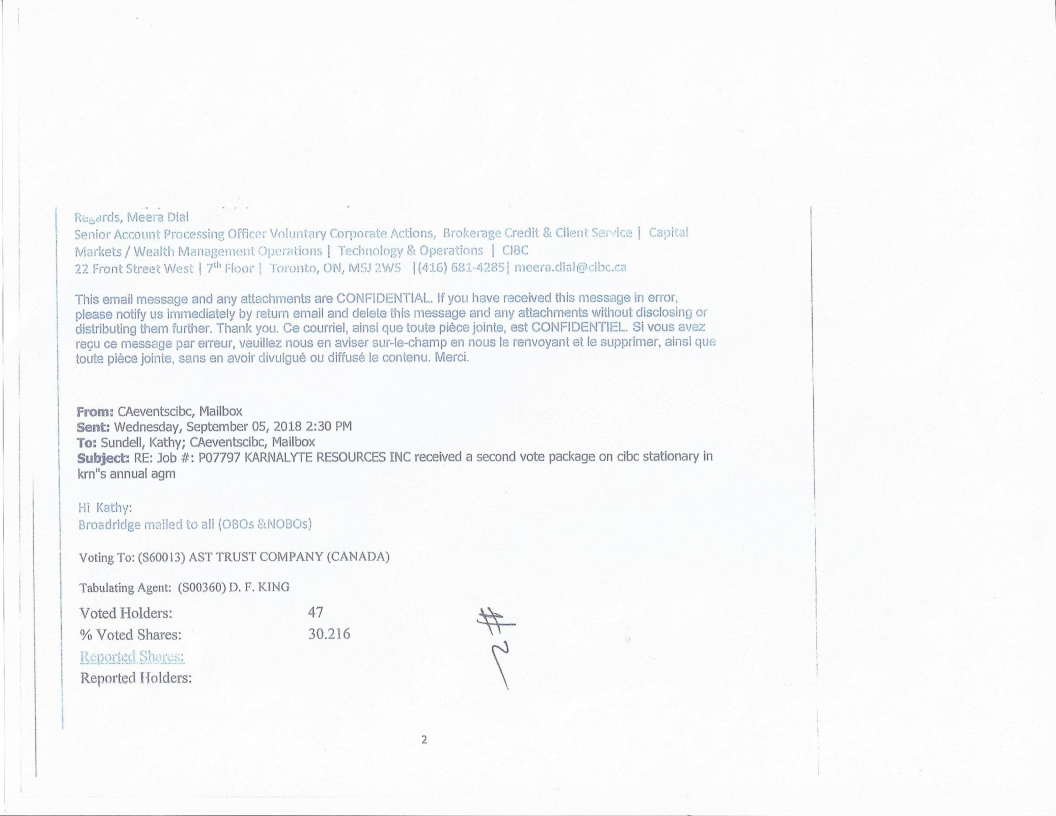
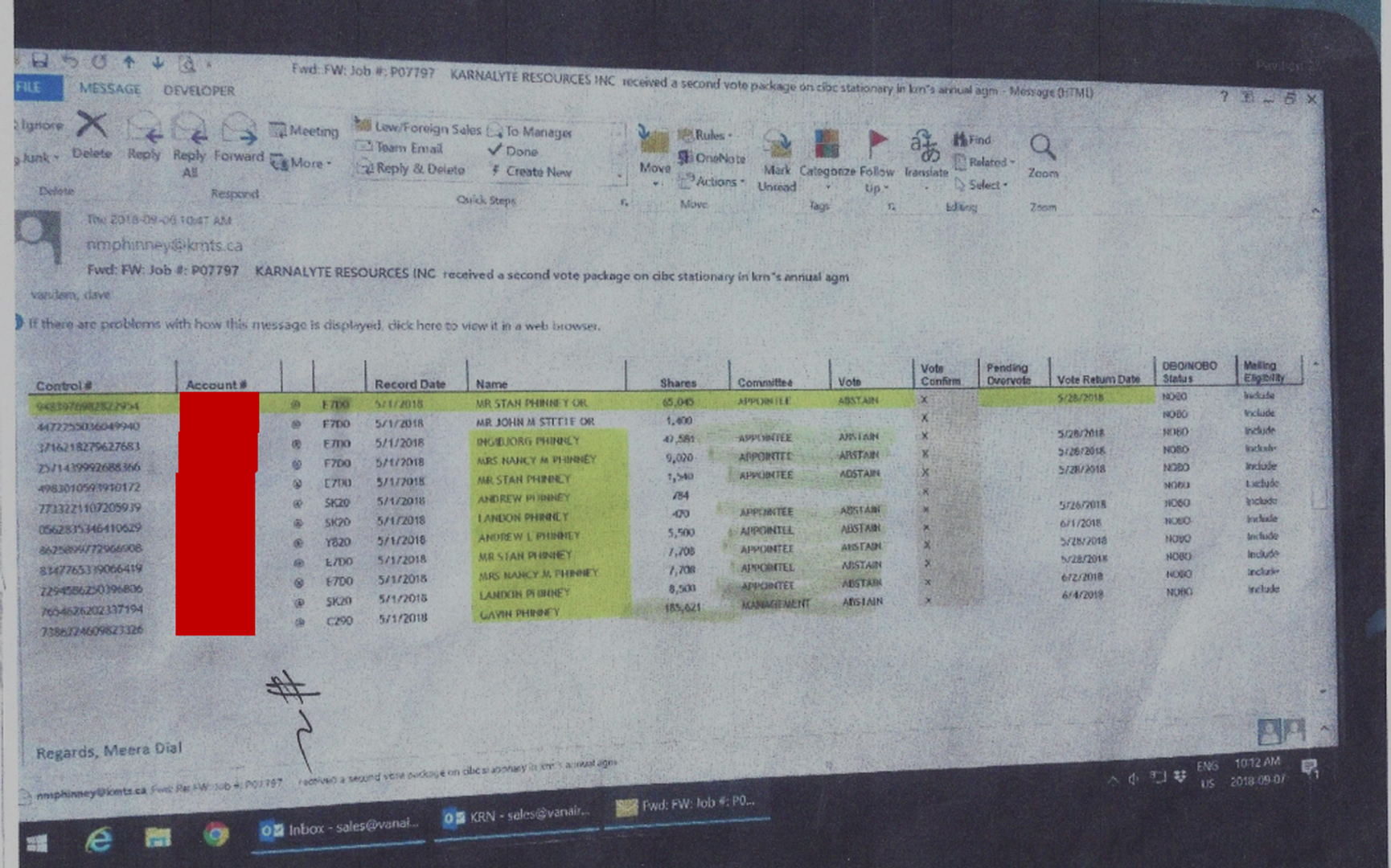
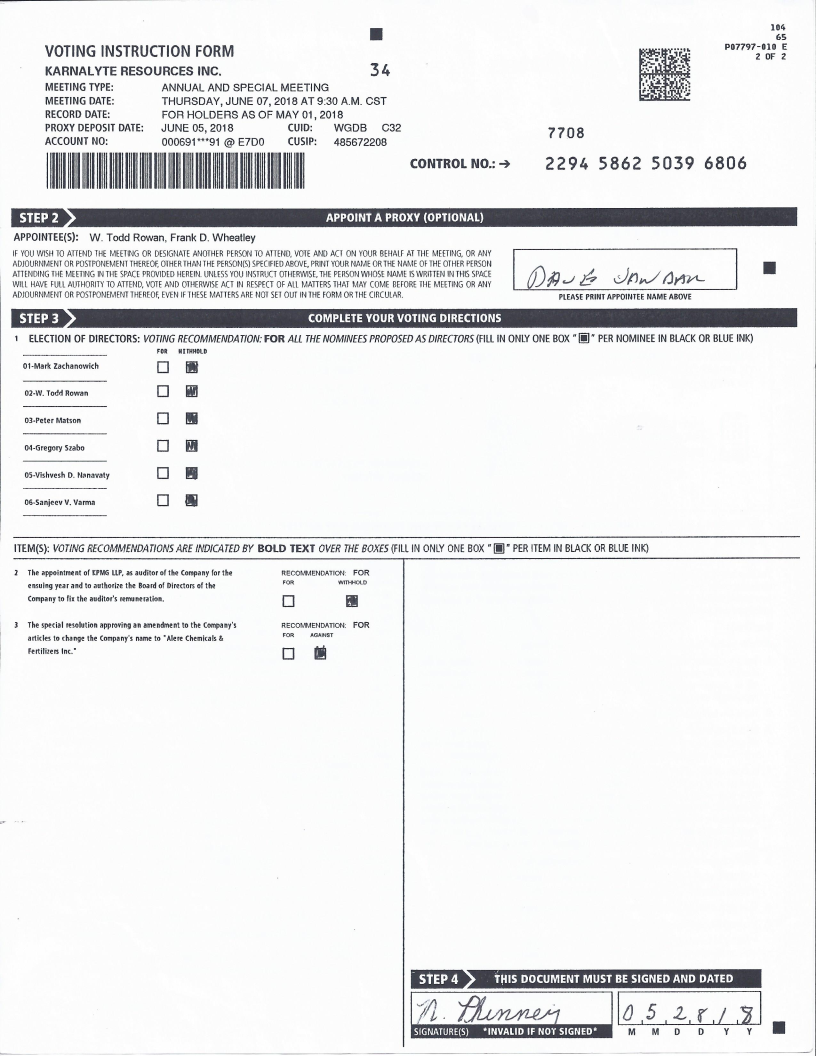
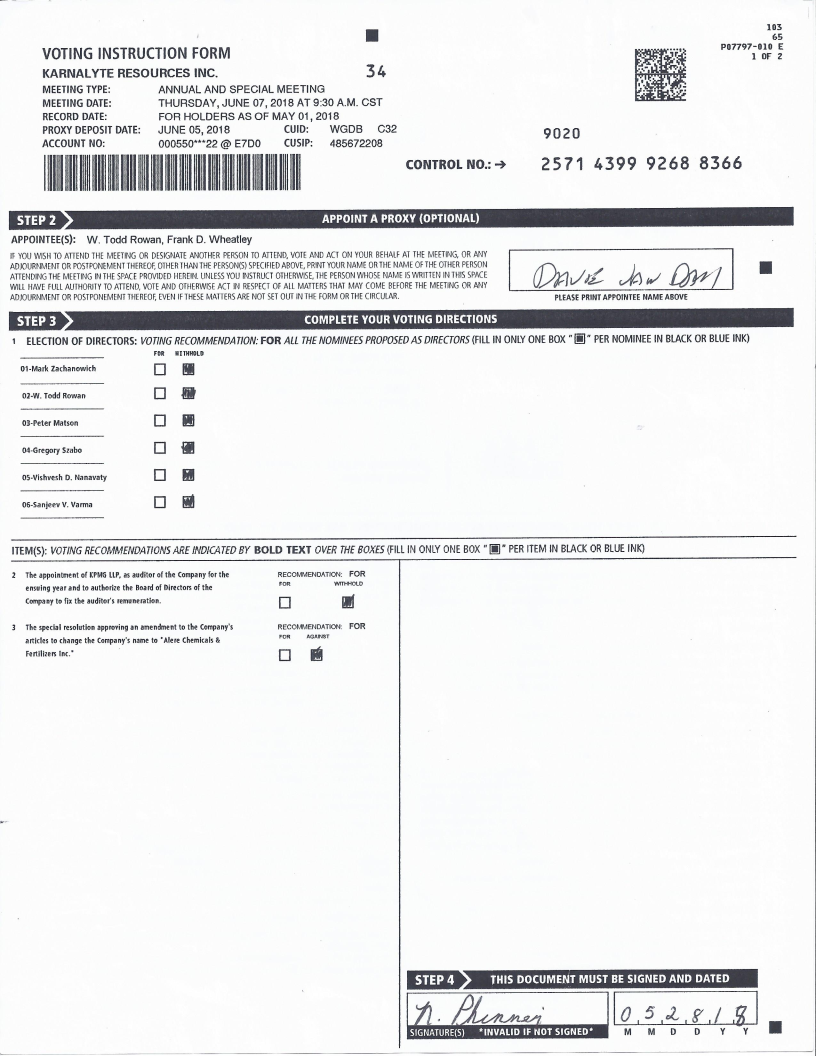
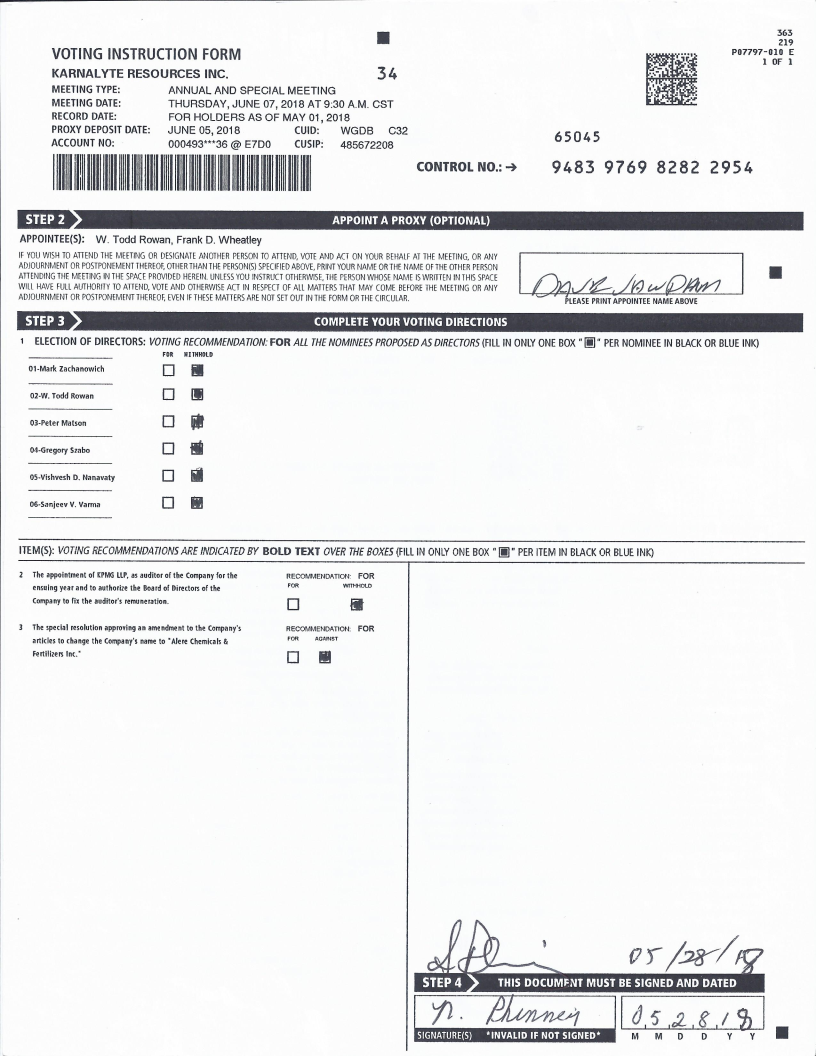
June 4, 2018 - Part 4 of Voter Fraud Evidence
January 14, 2022
PROOF OF KARNALYTE 2018 VOTE FRAUD
Following an inquiry to CIBC regarding changes to his personal votes cast at the 2018 KRN Annual Meeting, Stan Phinney received confirmation of multiple vote changes that KRN management orchestrated to win an “uncontested” vote for the entire Board of Directors. A WITHHOLD vote over 50% would have resulted in the entire board resigning.
EXHIBIT 4 of 40+: Attached Source: AST proxyvote.com
via Meera Dial, Senior Account Processing Officer, CIBC
Broker: CIBC Wood Gundy
Shareholder: Stan PHINNEY
Shareholder Vote Confirmation: June 4, 2018
Shares voted: 74,288
Votes Cast: WITHHOLD ALL
VOTE CHANGE: WITHOLD ALL to ABSTAINED (not counted)
AST Vote Record: Abstained Proxy: Management
Page 2
Attachment 1: Screenshot of file sent to Stan Phinney from Kathy Sundell CIBC, in response to his complaint about a second voter package sent out by AST/King using the same proxy numbers. This led to the discovery that AST could reopen the CLOSED vote files and alter the vote from WITHHOLD ALL to ABSTAIN.
Attachment 2: Email communication between Meera Dial, CIBC Toronto and Kathy Sundell, CIBC Wood Gundy, Thunder Bay.
Attachment 3:
Stan Phinney’s Control Numbers : 9483 9769 8282 2954
8347 7653 3906 6419
4983 0105 9391 0172
Attachment 4: Stan Phinney’s Vote Record with confirmation number
- Vote cast: WITHHOLD ALL
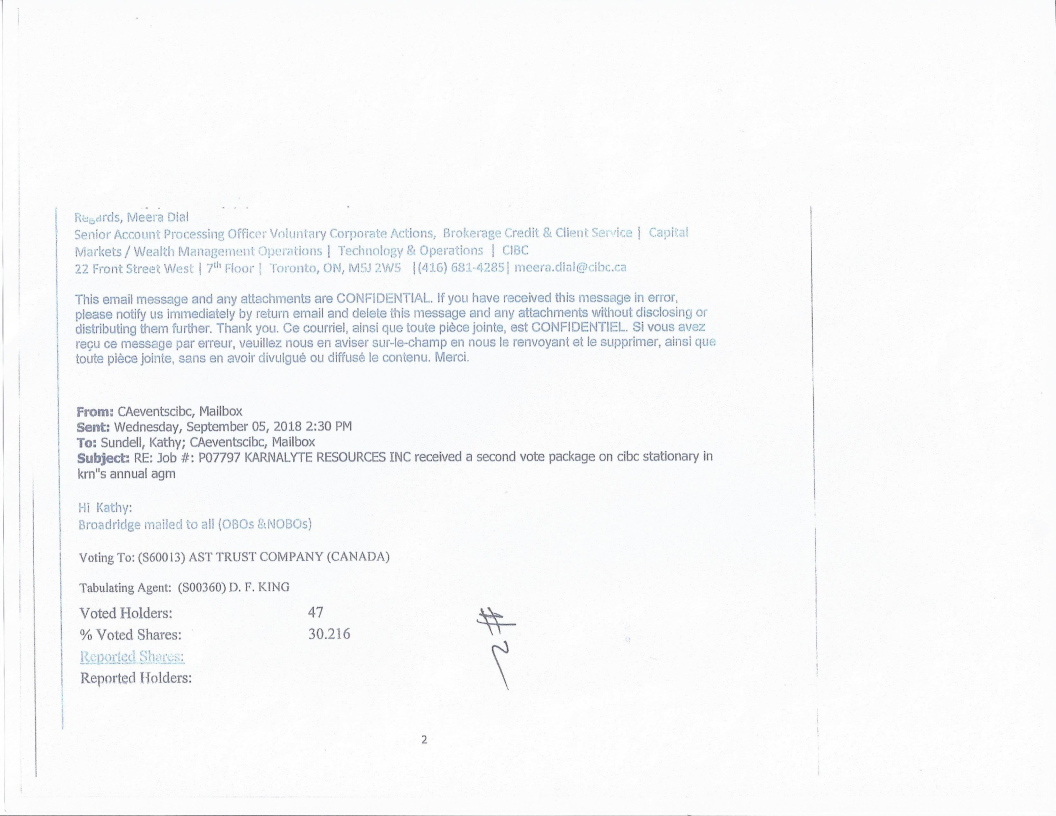
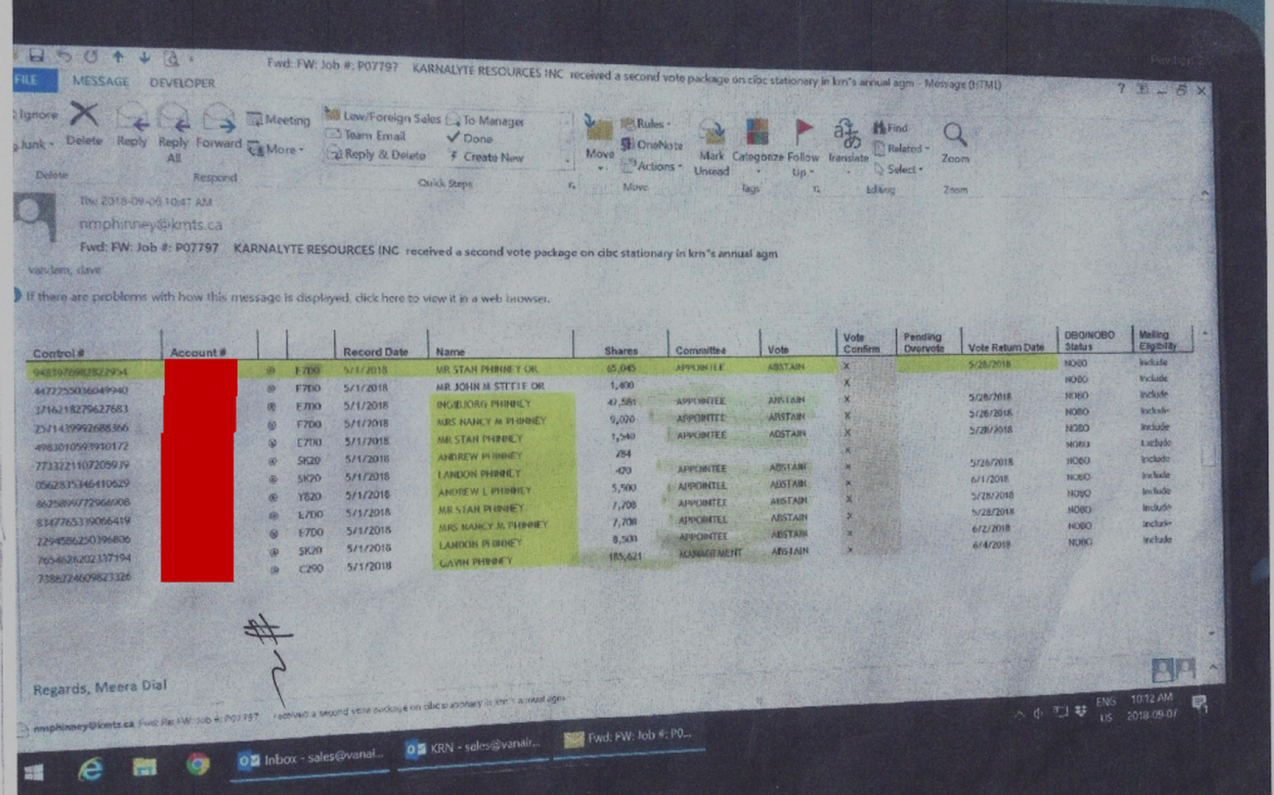
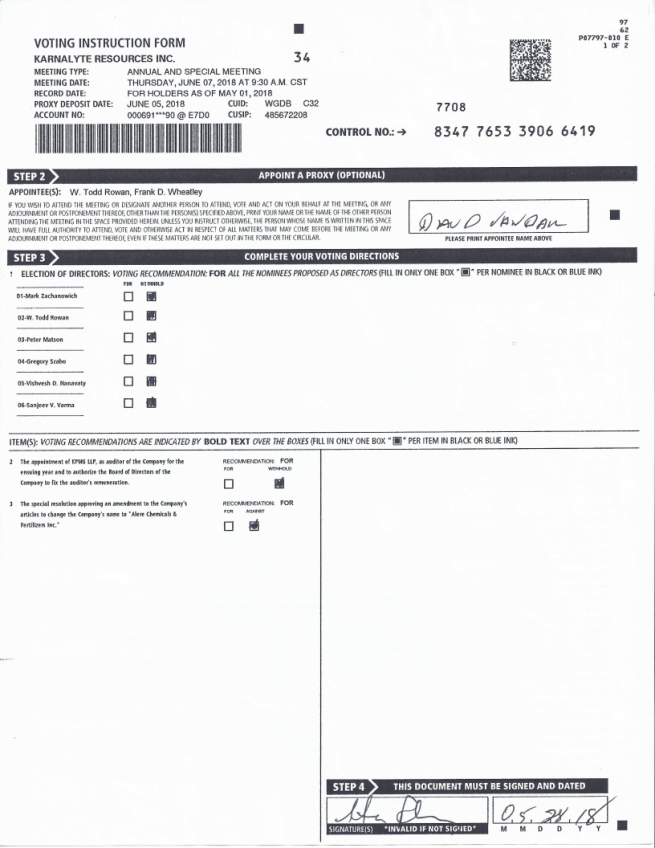
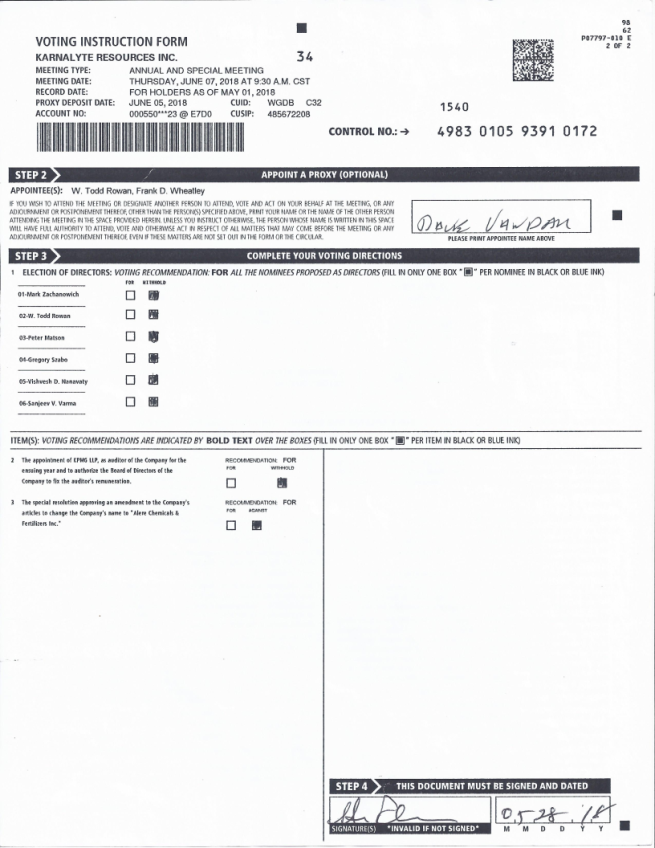
[EDIT : With Wheatly's Affidavit, Mr. Van Dam's 1,350,013 votes ALONE, Flip the voting to Karnalyte Losing the entire vote in the First scenario.
And in the 2nd scenario, only approx. 500,000 votes away from Karnalyte Completely losing.
Gee, I wonder if we can find an additional 500,000 votes to have Karnalyte completely lose in any formula?
Let us leave the Regulators to Answer that question????
Not really as they have done NOTHING about voter Fraud. We will provide more evidence.
| Today's Vote Totals the Karnalyte changed (abstained) | 1,350,013 | ||||
| Election of Directors | (2018 Results) | (From Sedar.com) | |||
| Name | Votes For | %Votes For | Votes Withheld | %Votes Withheld | |
| Mark Zachanowich | 9,697,555 | 55.31 | 7,837,010 | 44.69 | |
| W. Todd Rowan | 9,639,041 | 54.97 | 7,895,524 | 45.03 | |
| Peter Matson | 9,680,555 | 55.21 | 7,854,010 | 44.79 | |
| Gregory Szabo | 9,697,555 | 55.31 | 7,837,010 | 44.69 | |
| Vishvesh D. Nanavaty | 9,594,051 | 54.72 | 7,940,514 | 45.28 | |
| Sanjeev V. Varma | 9,579,051 | 54.63 | 7,955,514 | 45.37 | |
| Diff of votes | New votes removed | New Voted For % | New votes added | Today's Diff | New Votes Witheld NOW |
| -1,860,545 | 8,347,542 | 47.61% | 9,187,023 | 839,481 | 52.39% |
| -1,743,517 | 8,289,028 | 47.27% | 9,245,537 | 956,509 | 52.73% |
| -1,826,545 | 8,330,542 | 47.51% | 9,204,023 | 873,481 | 52.49% |
| -1,860,545 | 8,347,542 | 47.61% | 9,187,023 | 839,481 | 52.39% |
| -1,653,537 | 8,244,038 | 47.02% | 9,290,527 | 1,046,489 | 52.98% |
| -1,623,537 | 8,229,038 | 46.93% | 9,305,527 | 1,076,489 | 53.07% |
| And even to give the benefit of doubt Original KRN Values NOT Changed | |||||
| not removing votes Orginal Values | New Voted For % | New votes added | Today's Diff | New Votes Witheld NOW | |
| 9,697,555 | 51.35% | 9,187,023 | -510,532 | 48.65% | |
| 9,639,041 | 51.04% | 9,245,537 | -393,504 | 48.96% | |
| 9,680,555 | 51.26% | 9,204,023 | -476,532 | 48.74% | |
| 9,697,555 | 51.35% | 9,187,023 | -510,532 | 48.65% | |
| 9,594,051 | 50.80% | 9,290,527 | -303,524 | 49.20% | |
| 9,579,051 | 50.72% | 9,305,527 | -273,524 | 49.28% | |
[EDIT : The following is an Affidavit from Frank Wheatly filed with the Alberta Court of Queens Bench. The Full Affidavit is linked here This is 108 pages and 3MB in size.
We are highlighting the pages that are relevant to vote fraud (page 86-87). In Whealtly's own submission, Mr. Van Dam's votes were already submitted and recorded as "Withheld". So after this date, Karanlyte, including Wheatly who was part of the management of KRN, Change the legally binding vote of Mr. Van Dam. over 1.3 MILLION Share Recorded as WITHHELD - But Ultimately changed by Karnalyte to Abstain!!
Regulators - Is this not enough evidence of huge Voter Fraud?
Wait there s more for you to chew on!
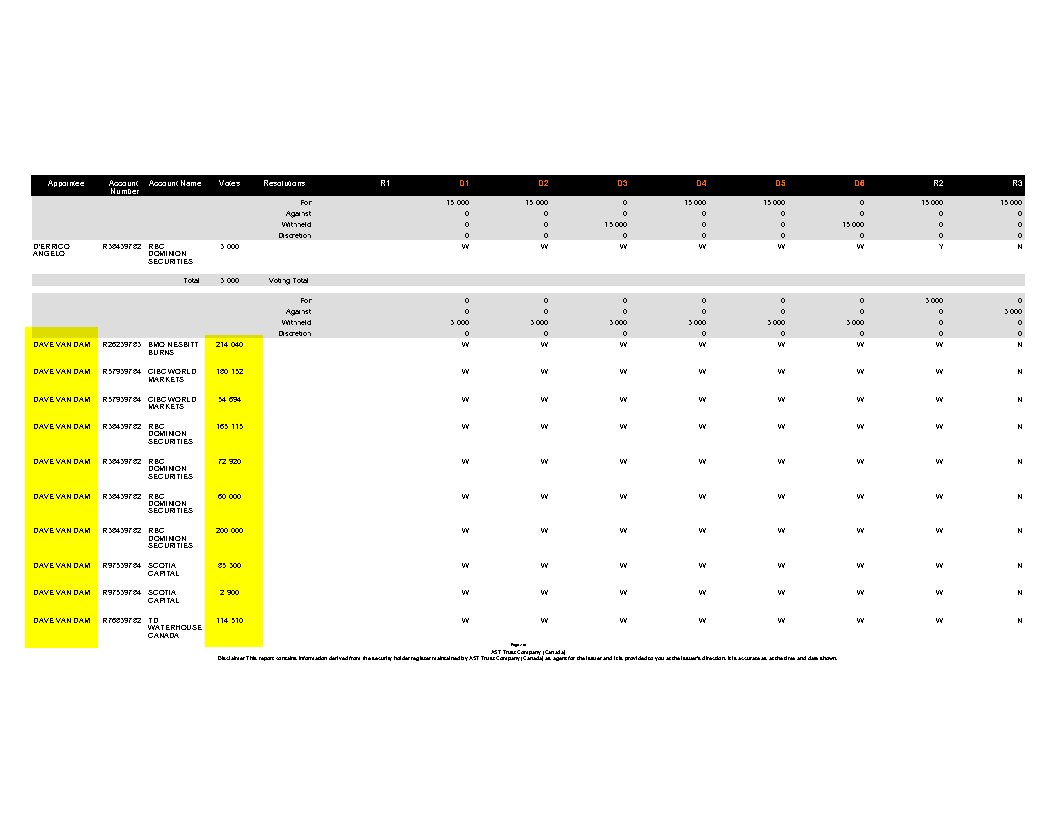
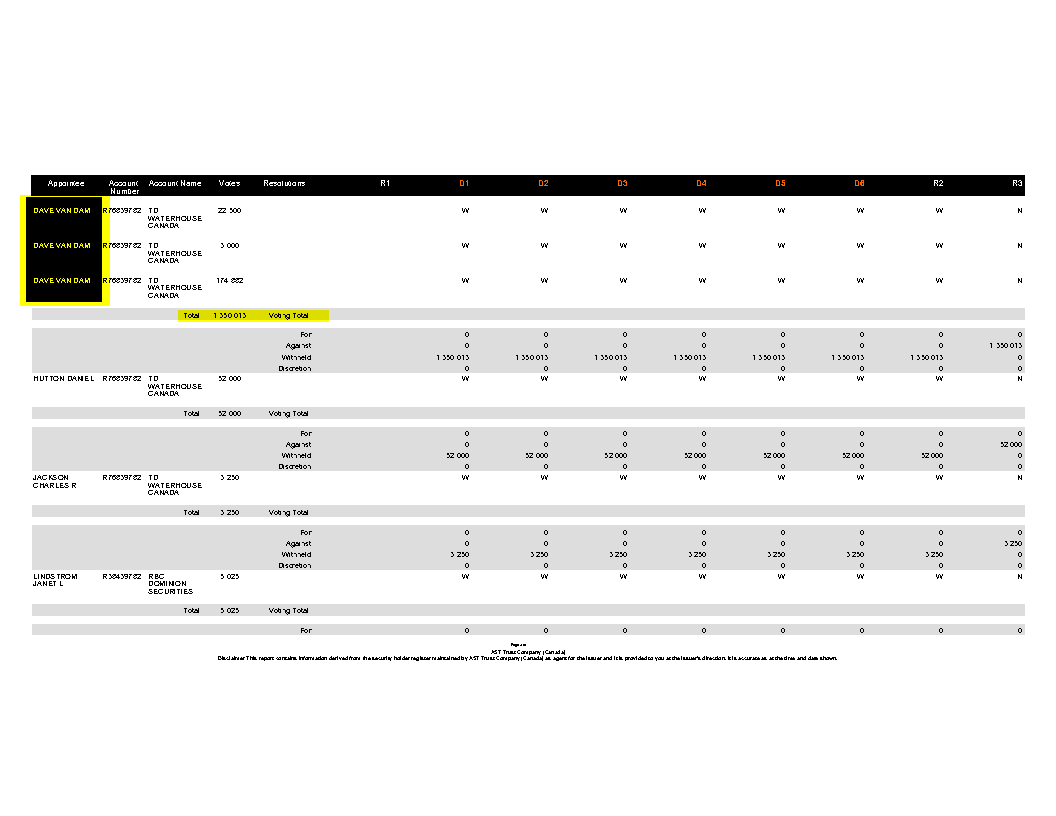
[EDIT : We are now keeping a running total of the Shares needed to turn the from Karnalyte Voter Fraud of turning Shareholders votes to Abstain. As you can see with numbers it does not take a lot to change the outcome of the election. After only 3 hard pieces of evidence of 3 shareholders' vote changes, you can see the results. there are 37 more vote changes to come.]
| Today's Vote Totals the Karnalyte changed (abstained) | 573,539 | ||||
| Election of Directors | (2018 Results) | (From Sedar.com) | |||
| Name | Votes For | %Votes For | Votes Withheld | %Votes Withheld | |
| Mark Zachanowich | 9,697,555 | 55.31 | 7,837,010 | 44.69 | |
| W. Todd Rowan | 9,639,041 | 54.97 | 7,895,524 | 45.03 | |
| Peter Matson | 9,680,555 | 55.21 | 7,854,010 | 44.79 | |
| Gregory Szabo | 9,697,555 | 55.31 | 7,837,010 | 44.69 | |
| Vishvesh D. Nanavaty | 9,594,051 | 54.72 | 7,940,514 | 45.28 | |
| Sanjeev V. Varma | 9,579,051 | 54.63 | 7,955,514 | 45.37 | |
| Diff of votes | New votes removed | New Voted For % | New votes added | Today's Diff | New Votes Witheld NOW |
| -1,860,545 | 9,124,016 | 52.03% | 8,410,549 | -713,467 | 47.97% |
| -1,743,517 | 9,065,502 | 51.70% | 8,469,063 | -596,439 | 48.30% |
| -1,826,545 | 9,107,016 | 51.94% | 8,427,549 | -679,467 | 48.06% |
| -1,860,545 | 9,124,016 | 52.03% | 8,410,549 | -713,467 | 47.97% |
| -1,653,537 | 9,020,512 | 51.44% | 8,514,053 | -506,459 | 48.56% |
| -1,623,537 | 9,005,512 | 51.36% | 8,529,053 | -476,459 | 48.64% |
| And even to give the benefit of doubt Original KRN Values NOT Changed | |||||
| not removing votes Orginal Values | New Voted For % | New votes added | Today's Diff | New Votes Witheld NOW | |
| 9,697,555 | 53.55% | 8,410,549 | -1,287,006 | 46.45% | |
| 9,639,041 | 53.23% | 8,469,063 | -1,169,978 | 46.77% | |
| 9,680,555 | 53.46% | 8,427,549 | -1,253,006 | 46.54% | |
| 9,697,555 | 53.55% | 8,410,549 | -1,287,006 | 46.45% | |
| 9,594,051 | 52.98% | 8,514,053 | -1,079,998 | 47.02% | |
| 9,579,051 | 52.90% | 8,529,053 | -1,049,998 | 47.10% | |
[Edit - This section includes the running totals:
525,958 - Previous Post total
47,581 - this post
-----------
573,539 - Total Votes Changed to support KarnalytE against the vote by these shareholders (Stay Tuned, A Lot More to come!)
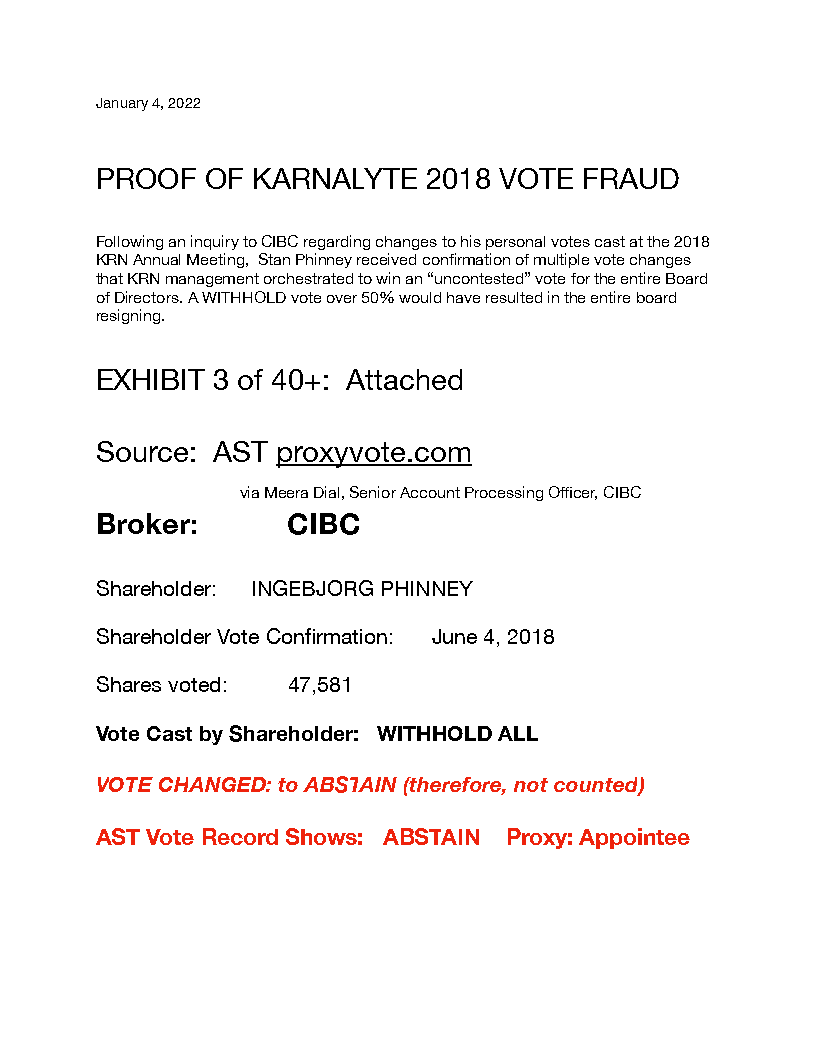
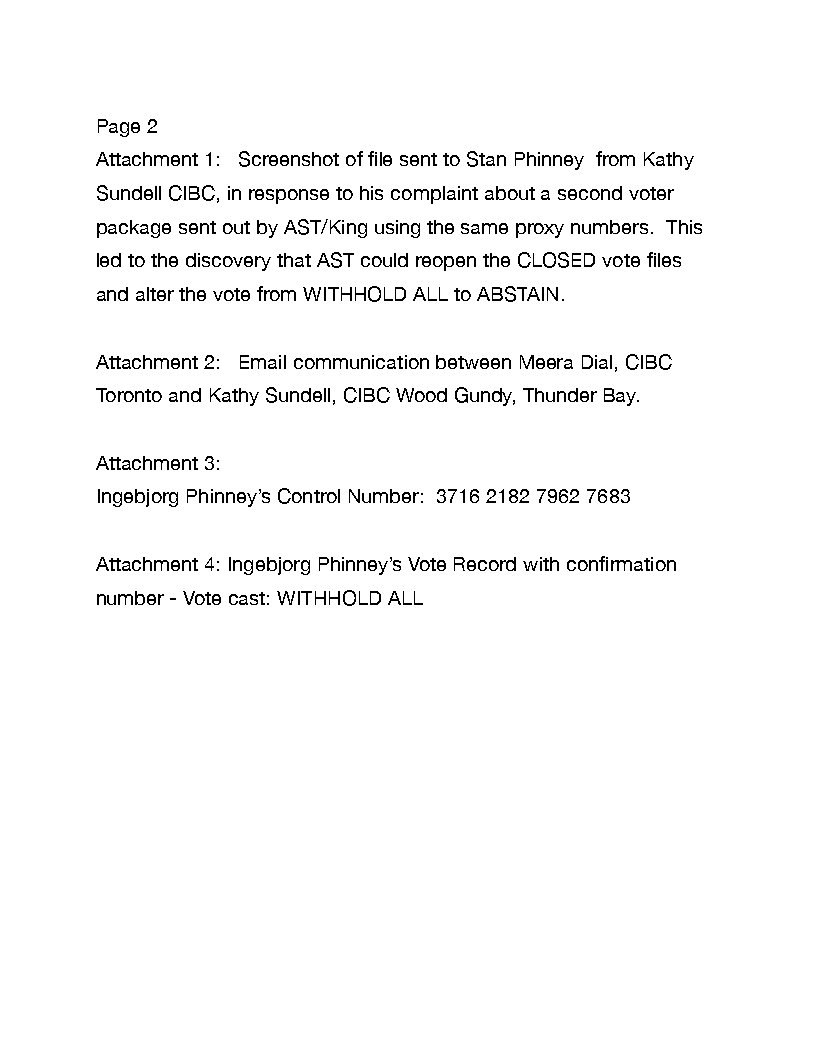
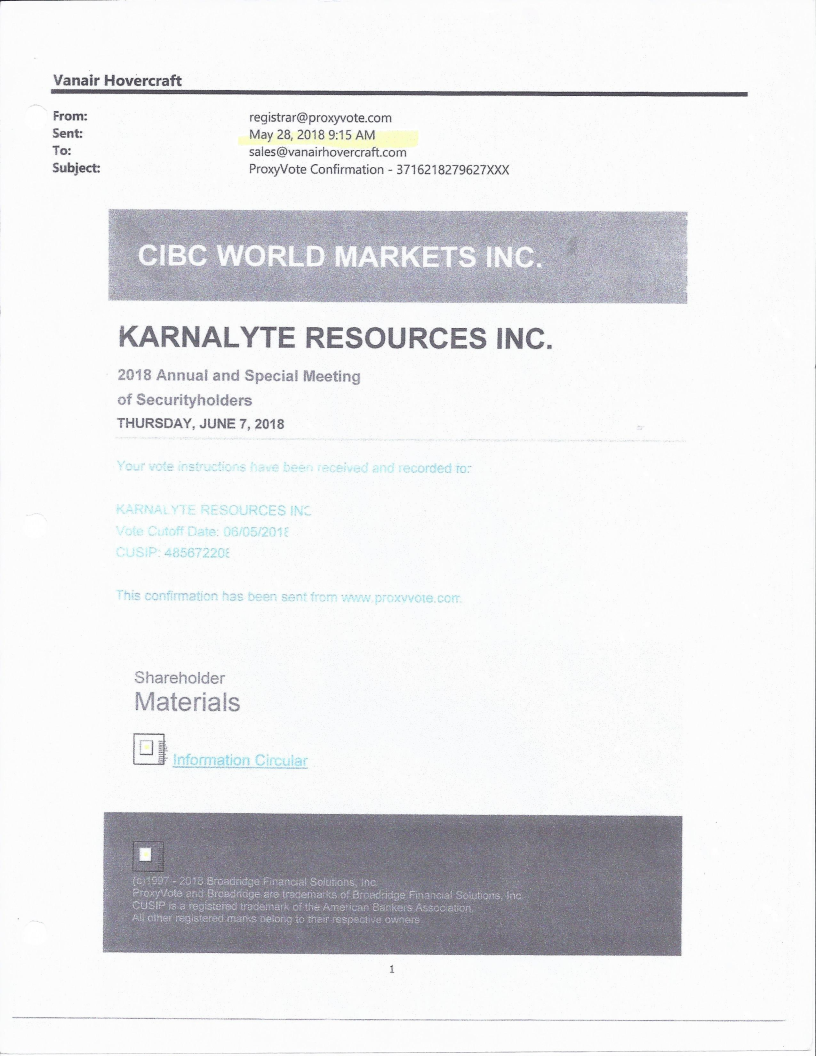
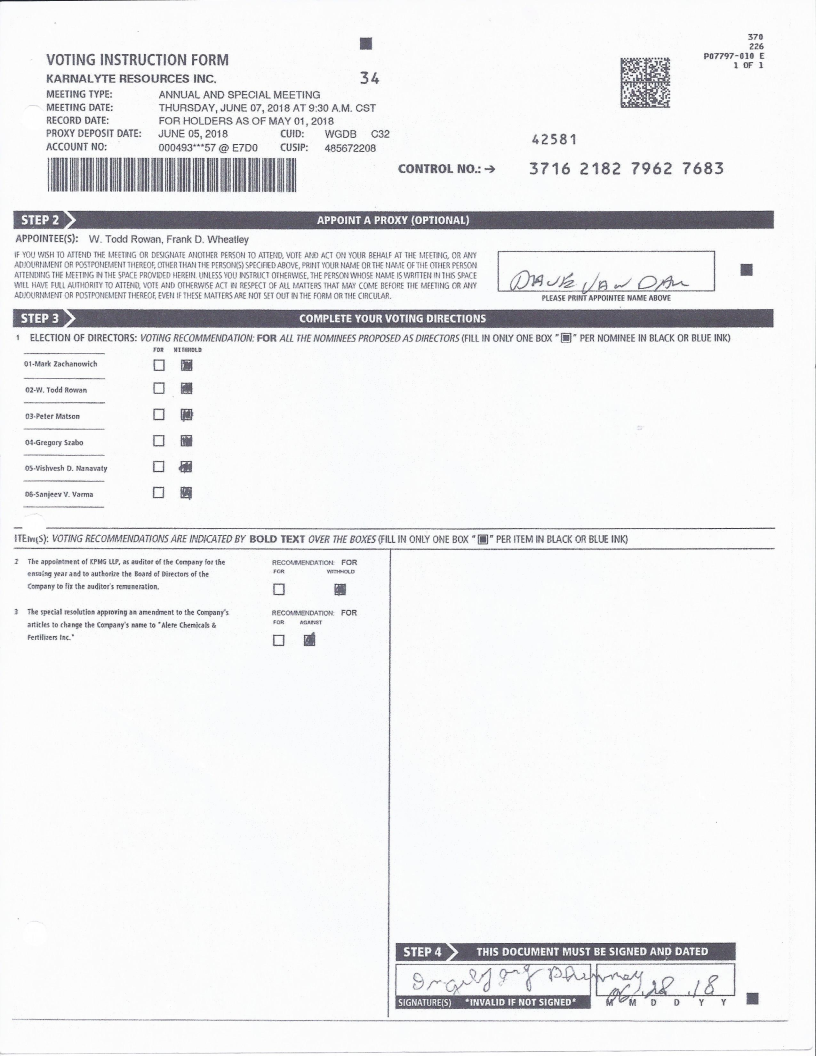
From: [email protected]
To: [email protected]; [email protected]; [email protected]; [email protected]; [email protected]; [email protected]; [email protected]; [email protected]; [email protected]; [email protected]; [email protected]; [email protected]; [email protected]; [email protected]; [email protected]; [email protected]; [email protected]; [email protected]; [email protected]; [email protected]; [email protected]; [email protected]; [email protected]; [email protected]; [email protected]; [email protected]; [email protected]; [email protected]; [email protected]; [email protected]; [email protected]; [email protected]; [email protected]; [email protected]
Sent: Tuesday, January 11, 2022 10:47 AM
Subject: Fwd: krn fraud
We the shareholders of Karnalyte want an answer
------ Original Message ------
From: [email protected]
To: [email protected]
Sent: Tuesday, January 11, 2022 10:43 AM
Subject: krn fraud
https://stockhouse.com/companies/bullboard/t.krn/karnalyte-resources-inc?postid=34302093
Looks like krnshareholders.com have had enough!
http://localhost:63342/
I am absolutely stunned at the number of regulator contacts that
have been advised of concerns regarding DF Kings involvement in the
Karnalyte 2018 election results, and yet it appears there has been
very little satisfaction for those shareholders to date.
What is it going to take for agencies designed to protect Canada's
shareholders to get the lead out of their back pockets, and start
protecting these shareholders?
Would it not be considered a huge conflict of interest if DF King
was hired to provide the following services a week or so before an
AGM, but also hired as the corporations Tabulation Agent to oversee
the final votes?
"“The Company has engaged the services of D.F. King, a division of
AST Investor Services Inc. (Canada), as its proxy solicitation and
information agent. Engaging a proxy solicitor is very common for
publicly traded – companies as it helps facilitate shareholder
engagement in the governance of the company. Initiating a targeted
shareholder engagement effort supports shareholder democracy by
ensuring that all shareholders, despite the size of their holdings,
receive timely, current, and comprehensive information about the
Company and the matters to be voted on at its shareholder
meetings. D.F. King has been engaged at an anticipated cost of $125,000 consisting of a base fee of $50,000 and an additional fee of $35,000, if management's nominees are elected and
each of the resolutions recommended by management is
passed, and a further $40,000, based on the number of votes cast in favour of, or withheld from voting for, each of management's nominees. The
total potential cost will be borne by the Company"
So how in the world could DF King be hired as Tabulation Agent
considering DF King would have direct access to every shareholders
proxy control number?
Even more of a kick in the teeth to shareholders, DF King got paid 6
figures for their services!
There appears to be a real fundamental system flaw in a Canadian
corporations shareholders democratic right to vote, if those votes
can be changed at the whim of a Transfer Agent hired to ensure
victory of incumbent directors.
Even worse, a couple years later the TMX Group acquires AST and in
doing so, also DF King when the TMX had already been advised of
fraud concerns, according to the folks at
krnshareholders.com.
https://www.tmx.com/newsroom/press-releases?id=973
https://www.tsx.com/contact/other-inquiries
Unbelievable!
From: [email protected]
To: [email protected]
Cc: [email protected]; [email protected]; [email protected]; [email protected]; [email protected]; [email protected]; [email protected]; [email protected]; [email protected]; [email protected]; [email protected]; [email protected]; [email protected]; [email protected]; [email protected]; [email protected]; [email protected]; [email protected]; [email protected]; [email protected]; [email protected]; [email protected]; [email protected]; [email protected]; [email protected]; [email protected]; [email protected]; [email protected]; [email protected]; [email protected]
Sent: Monday, January 10, 2022 1:16 PM
Subject: krn fraud and securities breaches
To whom it may concern:
This is my third contact to you showing the votes at Karnalyte AGM were changed. We are posting the details on www.krnshareholders.com.
Your site tells us how honesty and integrity are how you build your business.
YOUR SYSTEM WAS BREACHED BY AST / D. F. King and no one seems to give a damn.
I suggest you follow our website closely as the info will shock everyone. I suggest your legal people read ALL very closely. The truth is coming out.
The shareholders of Karnalyte deserve an answer.
Yours Truly
Stan Phinney
Shareholders of Karnalyte Resources
[Edit - This section includes the running totals:
50,000 - From Previous Posting
185,621 - Previous Post total
290,337 - this post
-----------
525,958 - Total Votes Changed to support KarnalytE against the vote by these shareholders (Stay Tuned, A Lot More to come!)
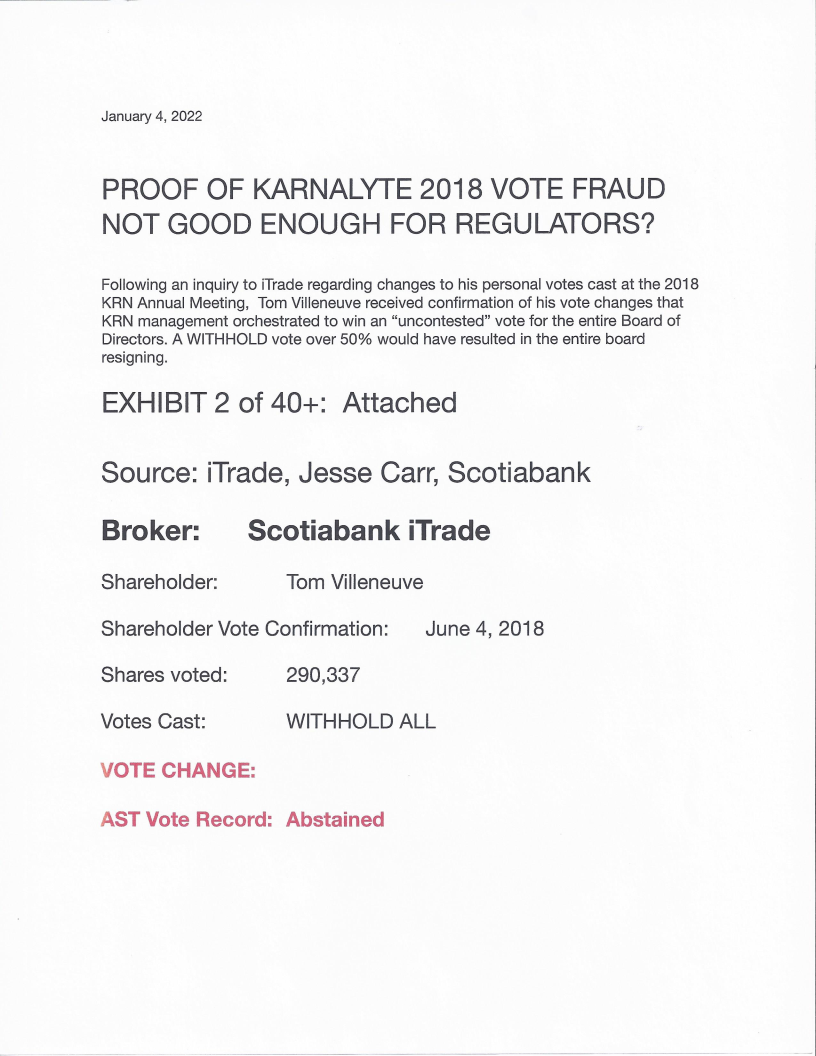
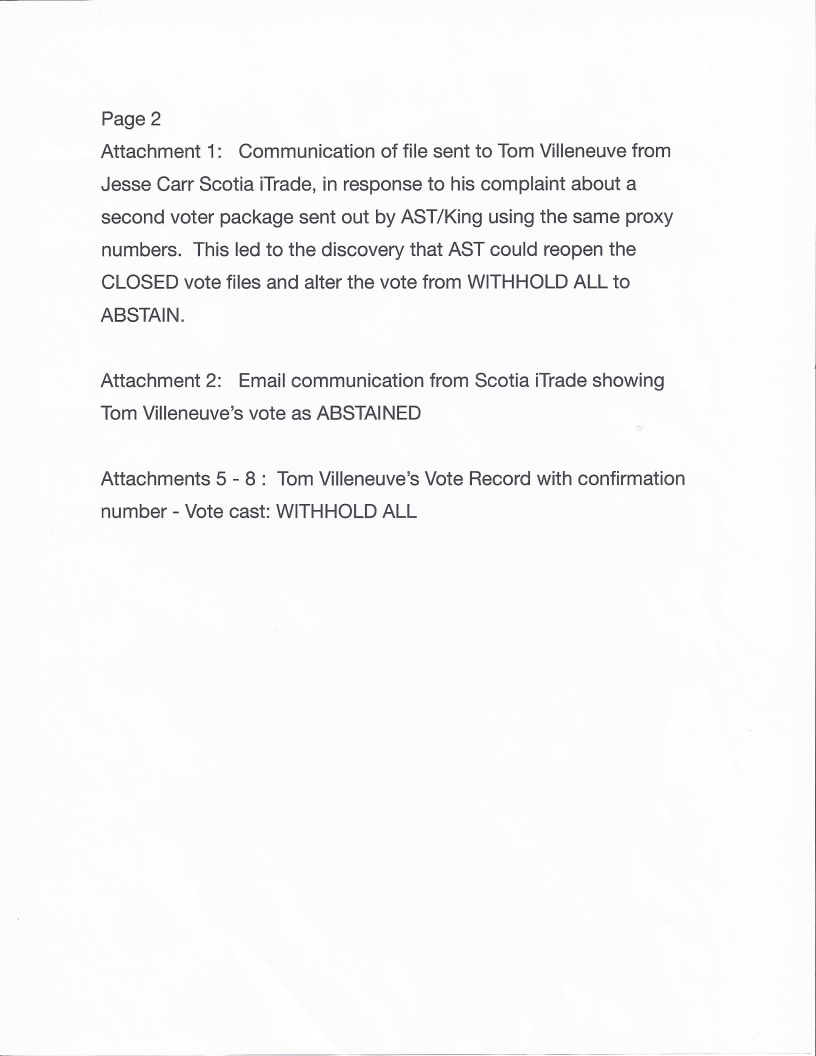

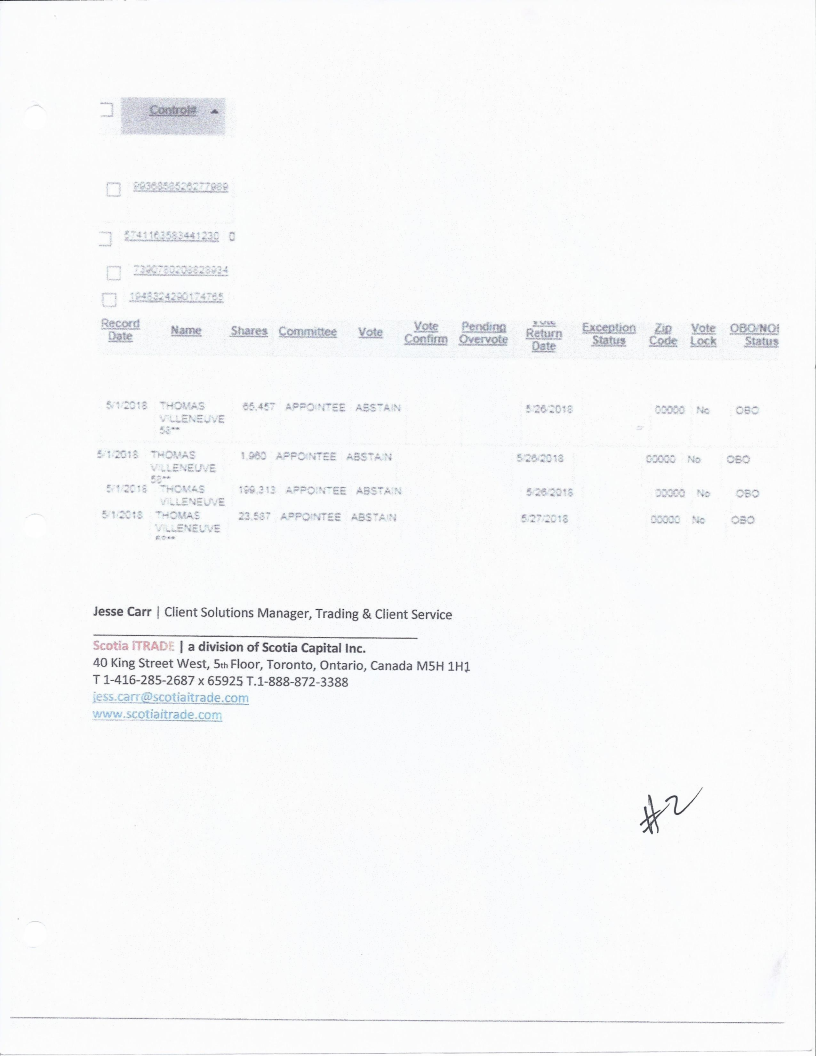
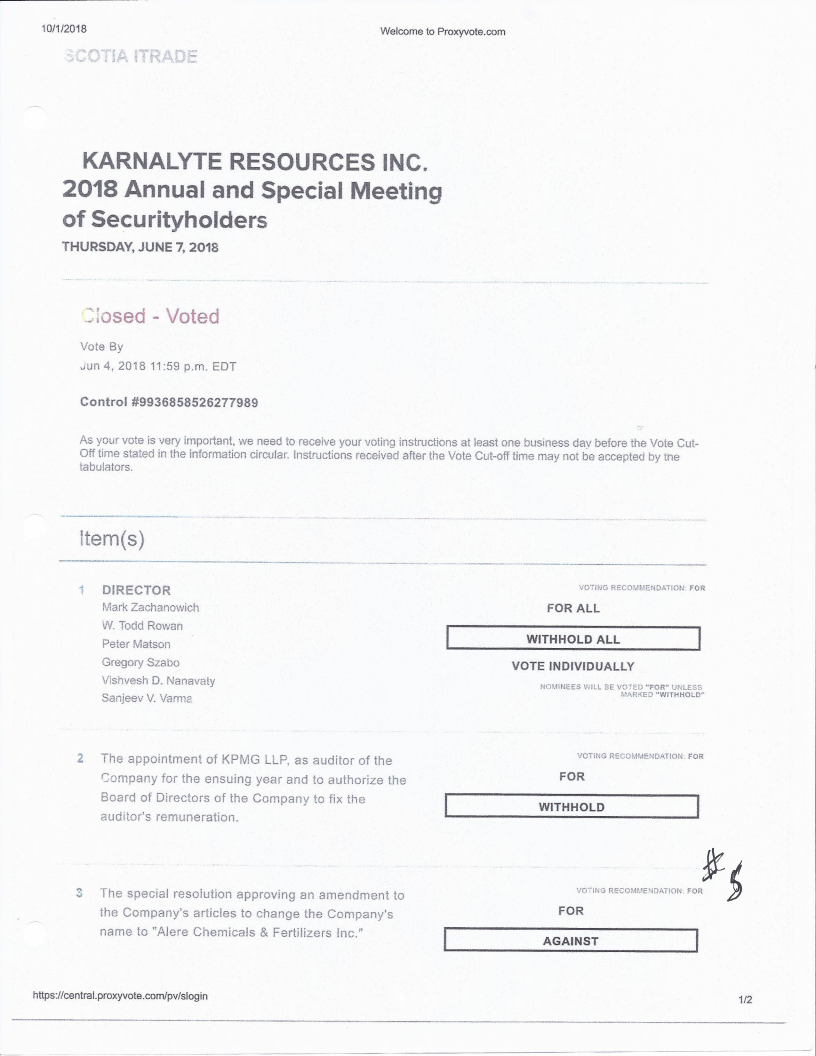
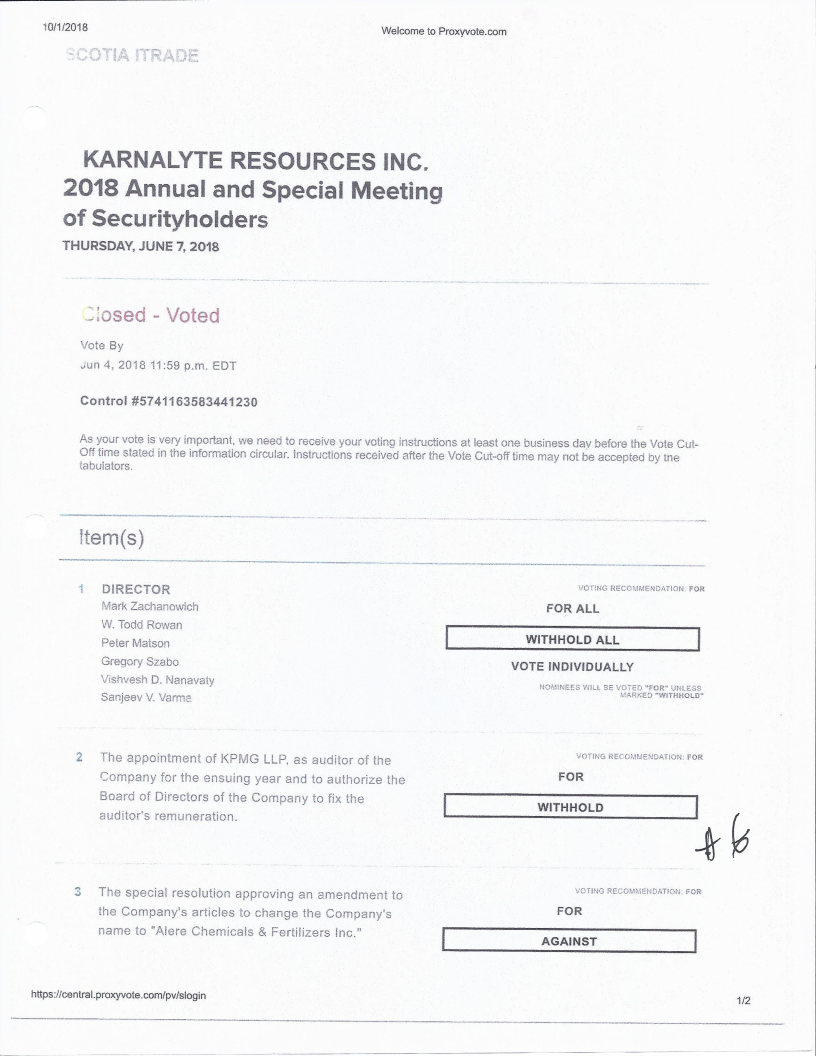
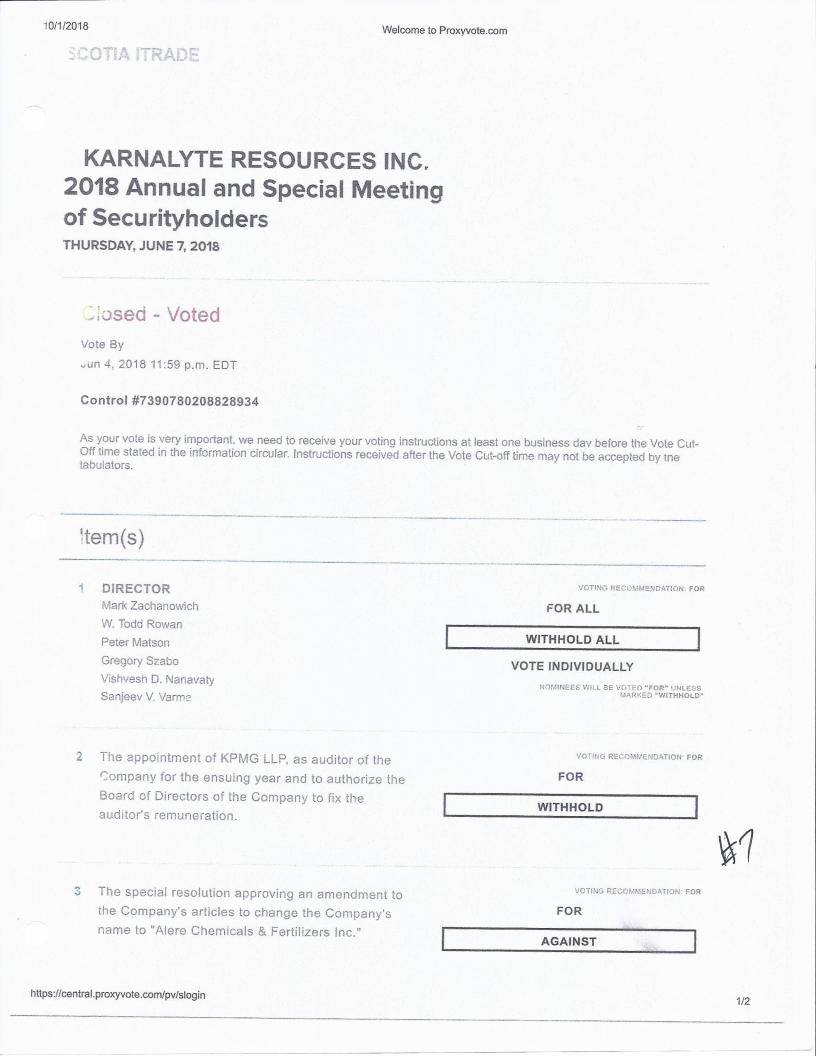
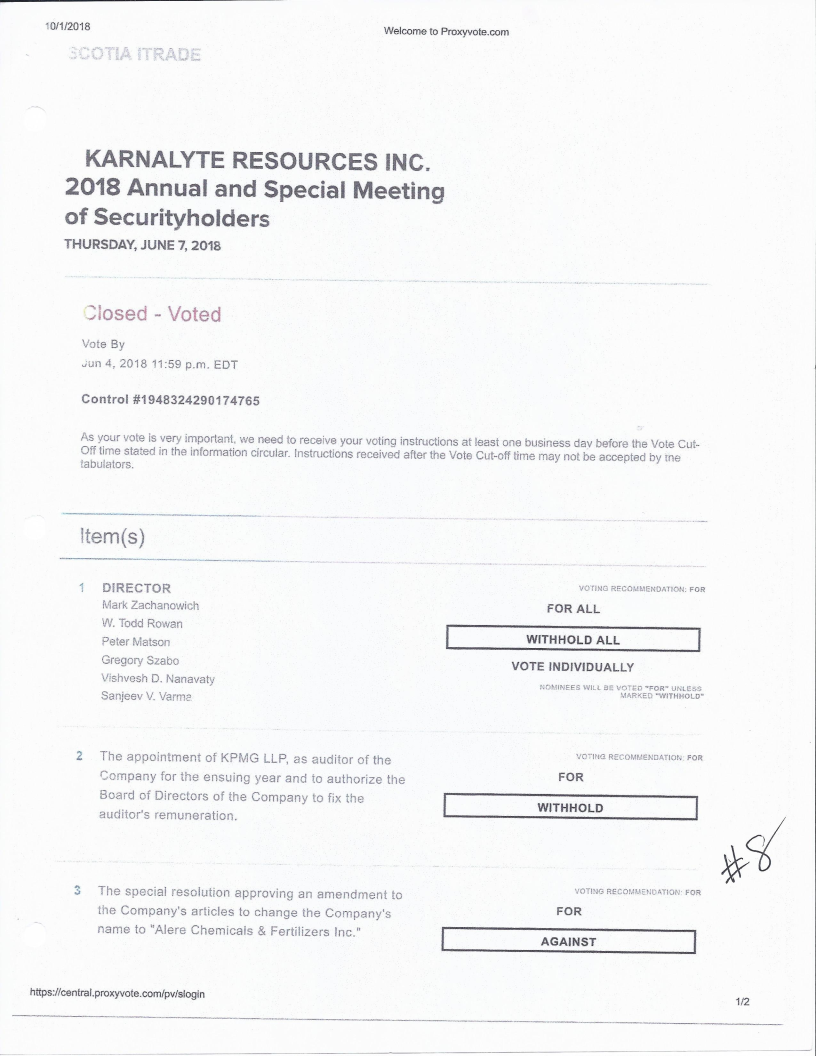
[EDIT : This information below has not been modified except for the Account numbers of the individuals who have been blacked out (actuallyly red ) The "vote" column have all words of "Abstain" 90% of these have a last name of "Phinney" and would never have abstained!
As the votes do not need much to tip the balance of the vote, We will be keeping a running total of the votes not counted.
This batch has a total votes not counted of 185,621
Total : 185,621 so far]
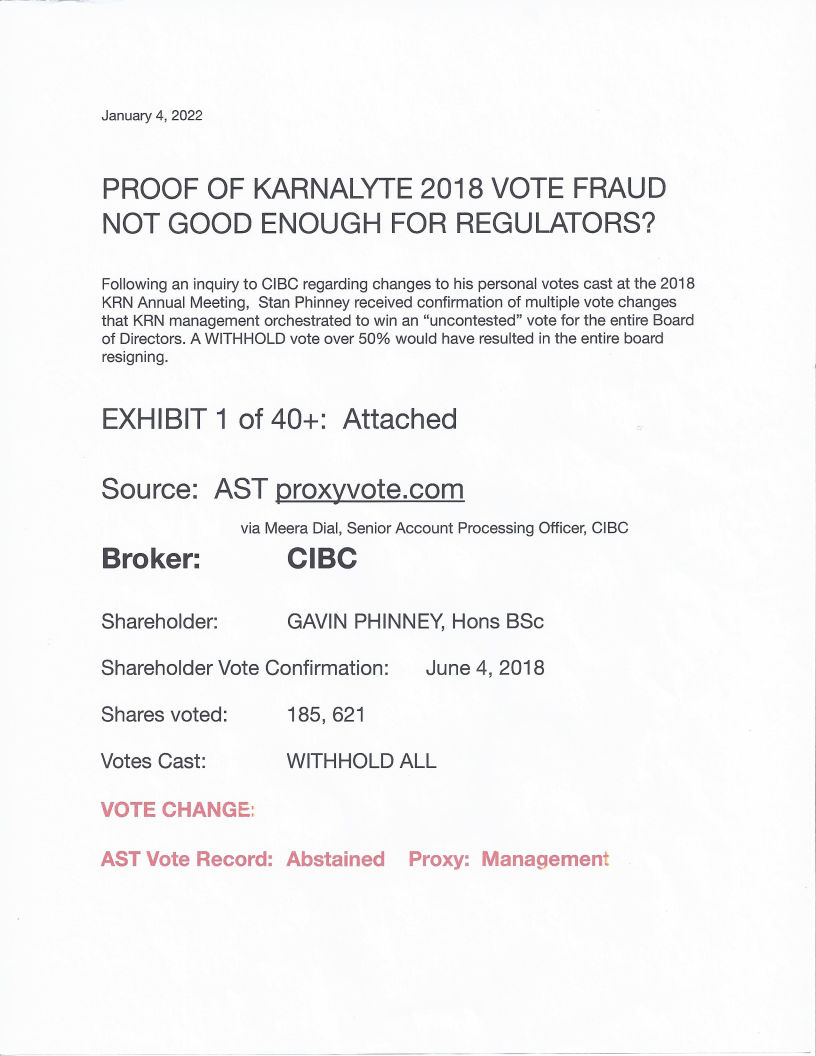
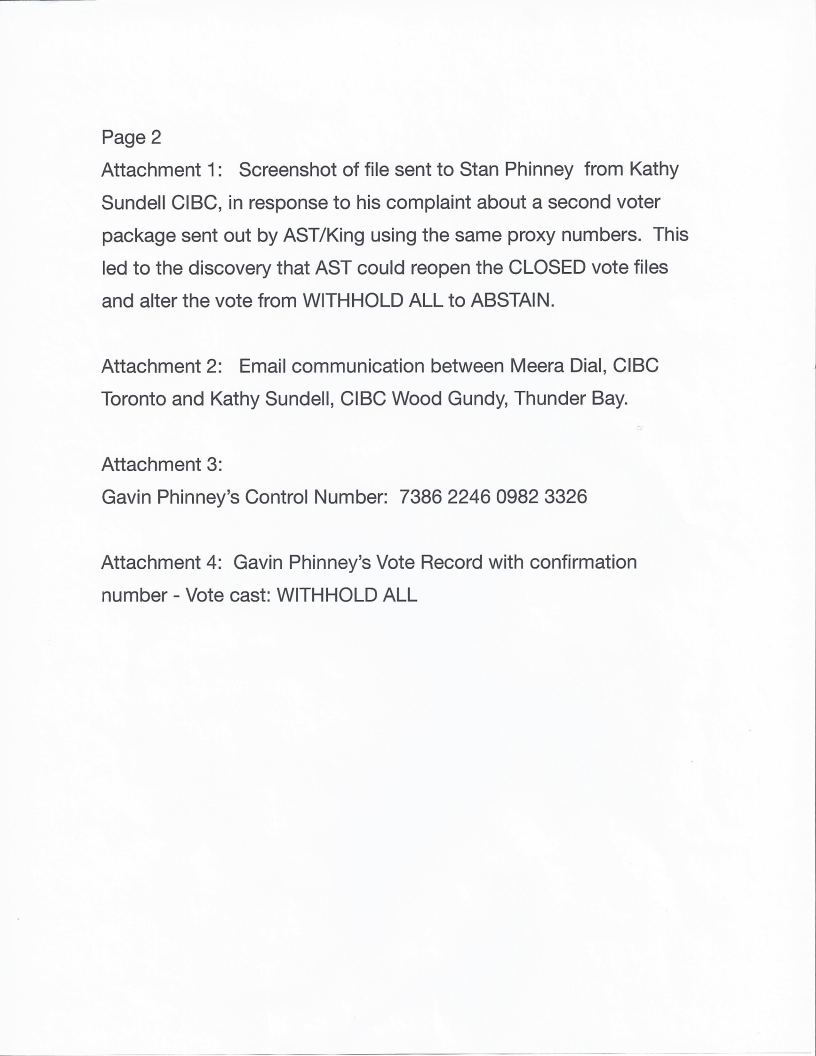
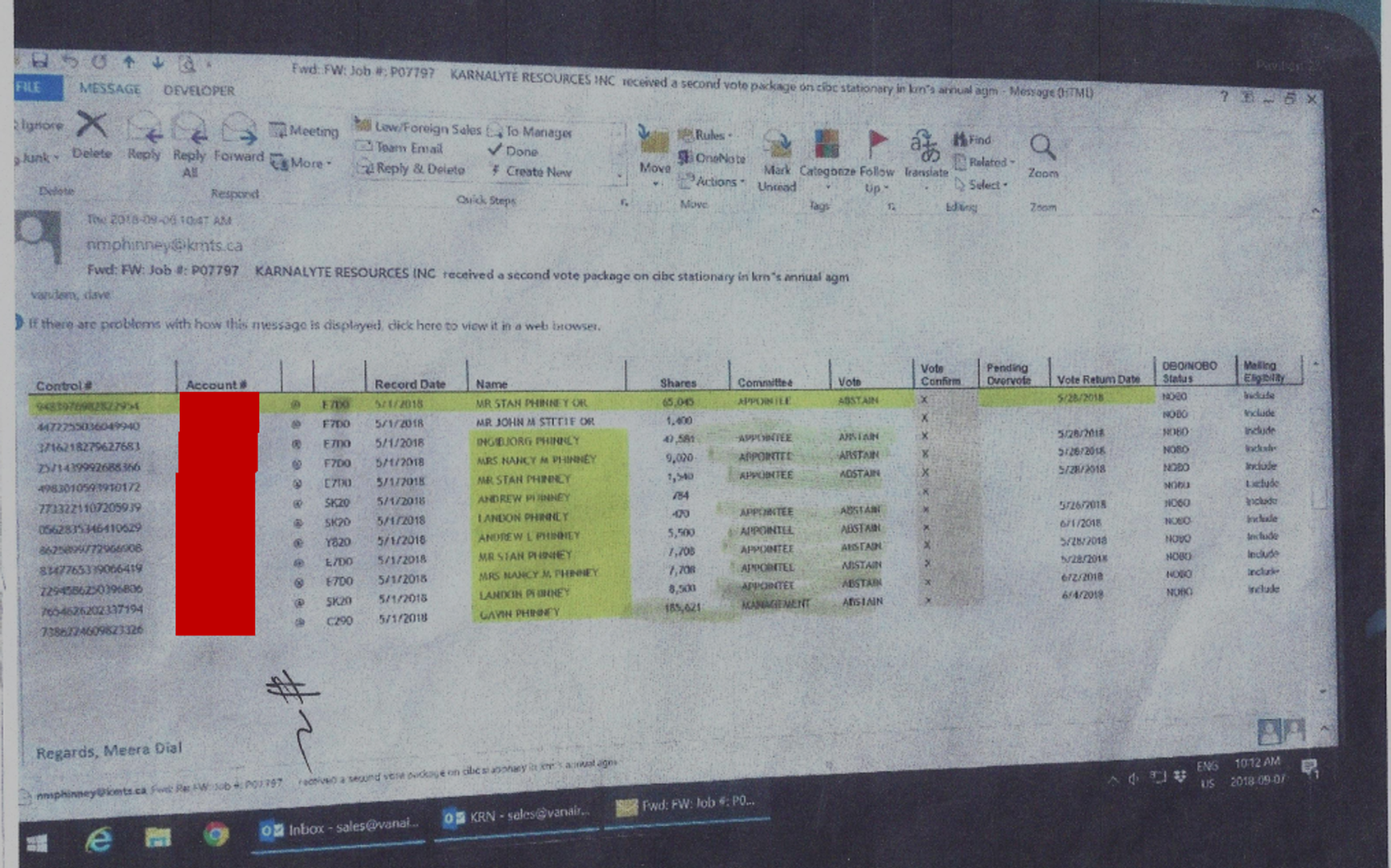
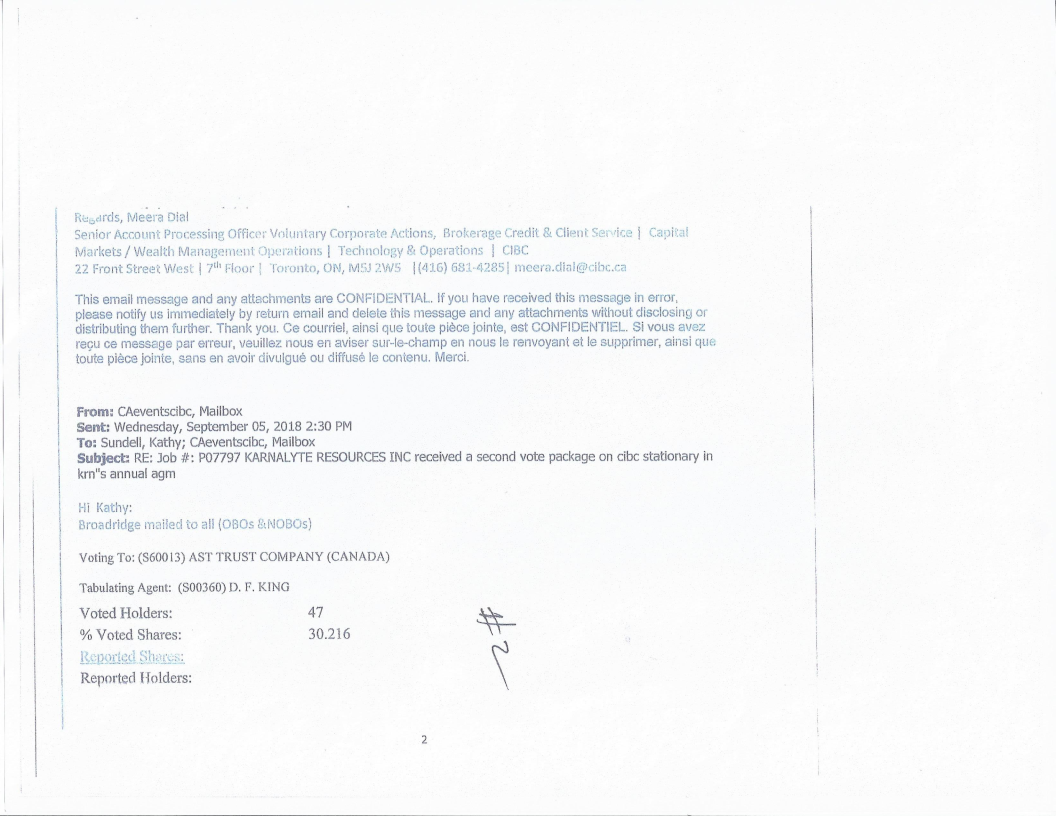
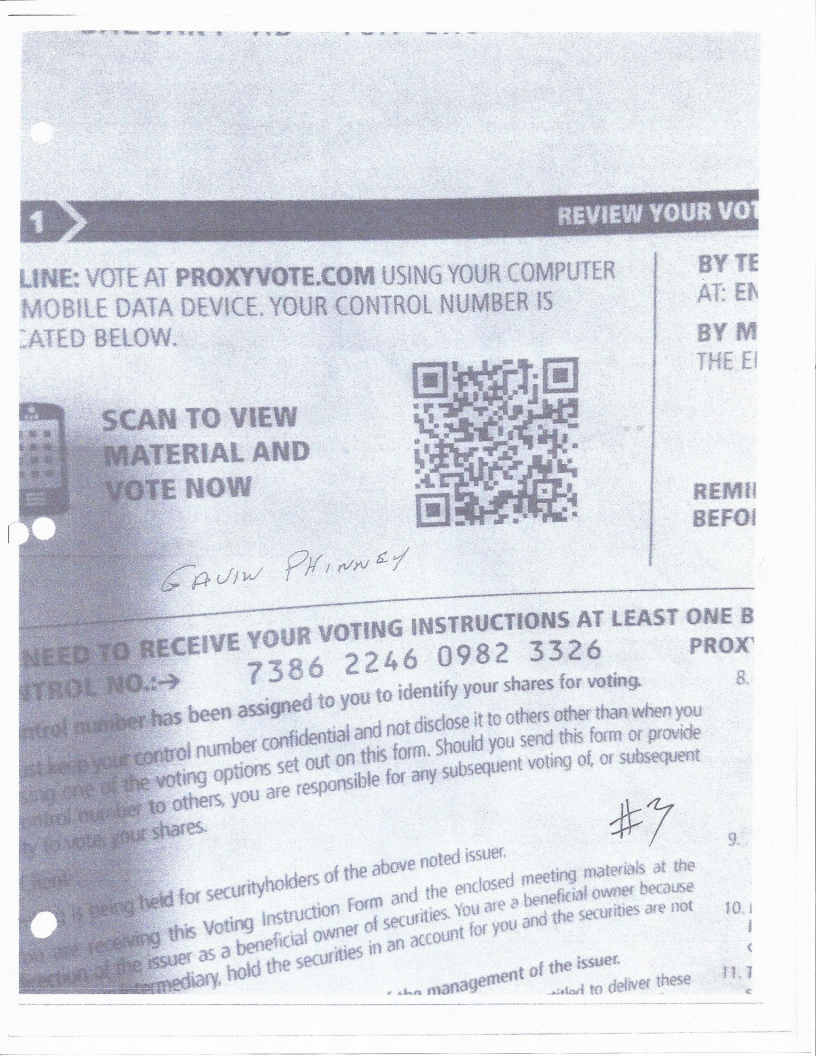
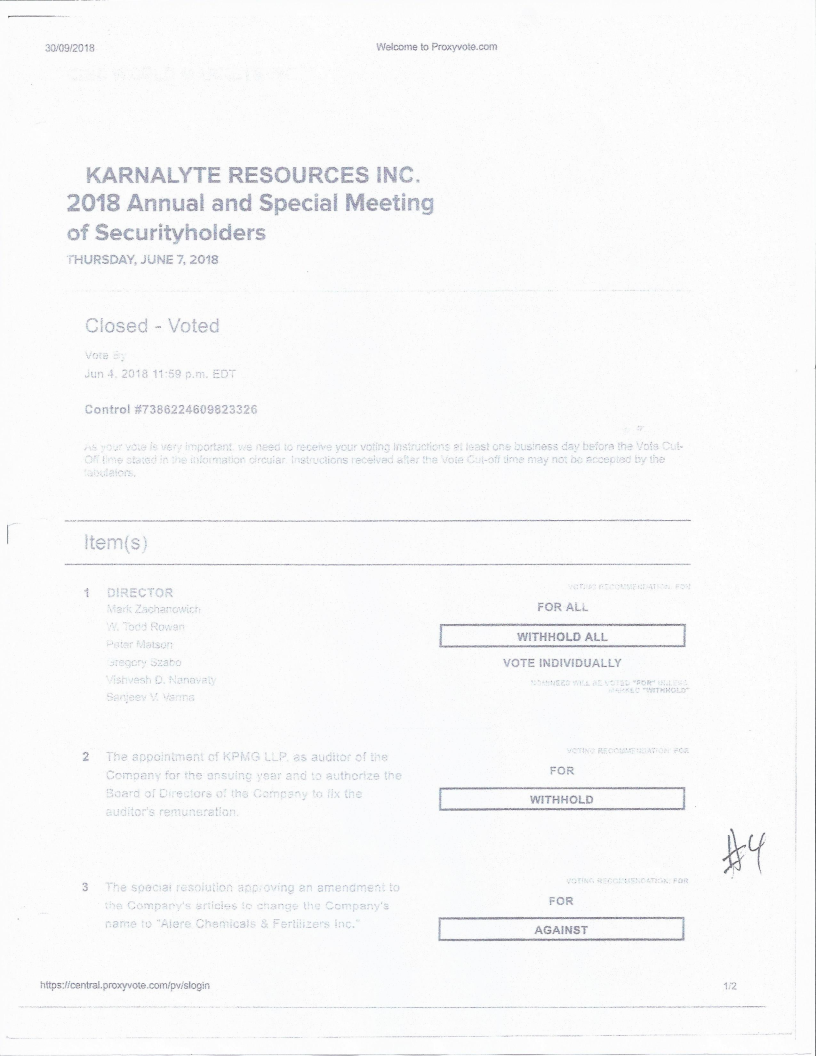
[EDIT: The following 4 affidavits from the previous management of Karnalyte are very telling. These four individuals are personally responsible for the decision, of what we believe is voter fraud, in 2018. But here they are 1 year later "complaining" about GSFC that they are bad actors ( very similar to "The Pot calling the Kettle Black")
As they all were involved in the decision in what we believe 2018 voter fraud, they all have conveniently left out what they did in 2018 and ONLY focused on events AFTER 2018, in 2019-2020, when GSFC "Screwed them".]
[EDIT : Peter Mason affidavits states that one of the issues with GSFC
"I am informed by Todd Rowan (“Rowan”), a former director, Interim CEO and consultant to KRN, and by Frank Wheatley (“Wheatley”), the former President and CEO of KRN, and verily believe, that on more than one occasion, Varma and Nanavaty has to consult with and seek instructions from their boss, the GSFC MD, on matters in front of the KRN Board for consideration. I verily believe that if the GSFC Nominees have to consult with, and seek instructions from, their boss as how to decide on matters relating to the business and affairs of KRN, then they are not exercising “independent judgement”."
[But conveniently does not mention that he was involved in decisions in we believe the Fraud in 2018 Vote]
[EDIT : Frank Wheatly affidavits states that one of the issues with GSFC
Independence of GSFC Nominees on the KRN Board
- I verily believe that none of the GSFC Nominees are independent, either by definition, or by conduct.
- Independent by Definition
- Nanavaty and Varma are employees of GSFC. Anjaria was a director of GSFC for at least 10 years before he retired in September 2020. Attached and marked as Exhibit “L” to the FDW Affidavit is a copy of GSFC’s notice of Ocober (sic) 1, 2020."
.
[But conveniently does not mention that he was involved in decisions in we believe the Fraud in 2018 Vote]
[EDIT : Gregory Szabo affidavits states that one of the issues with GSFC
- I verily believe that none of the GSFC Nominees are independent.
- Nanavaty and Varma are employees of GSFC, and Anjaria was a director of GSFC for at least 10 years before he resigned in September 2020. Attached and marked as Exhibit “L” to the FDW Affidavit is a copy of GSFC’s notice of October 1, 2020.
- I verily believe that being an employee of a major shareholder is a material relationship. I also verily believe that an employee is going to do what is in the best interests of his employer, as his primary responsibility and duty is to his employer. I verily believe that it impossible for an employee of a major shareholder to choose to act in the best interests of all shareholders, rather than in the best interests of his employer.."
.
[But conveniently does not mention that he was involved in decisions in we believe the Fraud in 2018 Vote]
[EDIT : Todd Rowan affidavits states that one of the issues with GSFC
- I verily believe that:
-
-
- each of Nanavaty, Varma and Anjaria:
-
-
-
- are nominees of GSFC; and
-
-
-
-
- have a material relationship with GSFC;
-
-
-
- none of Nanavaty, Varma, or Anjaria are independent, either by definition, or by their actions;
-
-
- each of Nanavaty, Varma and Anjaria are acting in bad faith and lying to the Canadian capital markets when they state that they are independent; and
- their actions do not support a determination of independence"
.
[But conveniently does not mention that he was involved in decisions in we believe he Fraud in 2018 Vote]
A posting from Stockhouse BullBoards about Karnalyte 2018 Voter Fraud - from Dan Brown
Forgot to add for those interested
I find it extremely telling that a week before the 2018 AGM proxy voting deadline date of June 5, 2018, Karnalyte Resources already filed an Originating Application to the courts requesting a declaration to annul any votes held, controlled, or designated by either Mr. Phinney, Mr. Van Dam.
[EDIT : This is the lawsuit that Mr. Phinney / Mr. Van Dam won 100% against Karnalyte]
On May 28, 2018, Karnalyte filed an Originating Application with the
Alberta Court of Queens Bench seeking amoung other things, a court
declaration against Mr. Phinney, and Mr. Van Dam to annul any
proxies in their control.
So why would any corporation file a declaration request to annul
voting privileges until they at least knew the actual voting results
to support their concerns. and why were shareholders not notified of
this lawsuit at the time it was initiated?
During the previous years election in 2017, 15,445,232 shares were
voted.
Karnalyte already knew in early 2018 that the number of shareholders
voting against management was likely to increase from the year
previous, due to the huge support behind the 6 nominee requests to
be added to the 2018 ballot by Mr Phinney and Mr Van Dam
Shareholders may not be aware of this, but corporations can monitor
proxy vote activity through daily tabulation reports.
By May 29th 2018, management would have already seen growing Against
and Withhold proxies coming in suggesting their May 14th Nitrogen
plan announcement was not as popular as first hoped so they released
the following press release to encourage support.
May 29, 2018 - Karnalyte Welcomes Support from Largest Shareholder
as Momentum Builds Behind Management Slate and Resolutions at
AGM
“Accordingly, a total of 7,187,523 shares or 25.5% of all
Karnalyte's shares have been voted in support of a clean break from
the past and a brighter future to the benefit
of all shareholders.”
http://karnalyte.com/news/press-releases/karnalyte-welcomes-support-from-largest-shareholder-as-momentum-builds-behind-management-slate-and-resolutions-at-agm/
Of the 7,187,523 shares announced in support of management, every
single one of those shares were owned by insiders vying for
re-election, which would reasonably suggest that by May 29, 2018 no
other proxies had been voted in support of management, or they would
have promoted them.
If 2017 proxy numbers were any indication in comparison, the 7.2
million shares supporting management would not be enough to hold 50%
shareholder approval. Terrifying right!
In the same press release way down in the fine print, it was also
announced DF King was engaged by Karnalyte.
“The Company has engaged the services of D.F. King, a division of
AST Investor Services Inc. (Canada), as its proxy solicitation and
information agent. Engaging a proxy solicitor is very common for
publicly traded – companies as it helps facilitate shareholder
engagement in the governance of the company. Initiating a targeted
shareholder engagement effort supports shareholder democracy by
ensuring that all shareholders, despite the size of their holdings,
receive timely, current, and comprehensive information about the
Company and the matters to be voted on at its shareholder meetings.
D.F. King has been engaged at an anticipated cost of $125,000
consisting of a base fee of $50,000 and an additional fee of
$35,000, if management's nominees are elected and each of the
resolutions recommended by management is passed, and a further
$40,000, based on the number of votes cast in favour of, or withheld
from voting for, each of management's nominees. The total potential
cost will be borne by the Company.”
According to DF King every shareholder despite the size of their
holdings receives the same timely, current, and comprehensive
information about the Company and the matters to be voted on at its
shareholder meeting.
Is that really true when several smaller shareholders I know were
never contacted before the proxy voting deadline at 9:30 a.m. on
Tuesday, June 5, 2018
A heavily fortified AGM was held June 7, 2018 where shareholders in
attendance learned that 18,249,487 shares were voted with approx 10
million of those shares in support of managements slate.
The number of withhold votes in 2018 by the corporations’
shareholders was greater than all the combined insider’s
shareholding of 7,187,523 shares, which would clearly indicate that
the approx. 3 million mystery shares voted in favor of the unpopular
incumbents was the difference maker in the election
It would take just a few minutes for regulators or Karnalyte to
request the number of shares voted for managements slate, and
identify those shareholders not deemed as insiders in the 2018
election.
This information appears easily obtained in AST records, as very
similar data was presented in the Originating Application evidence
againt the defendants to identify every shareholder who designated
proxies to Mr Phinney and Mr Van Dam during that same election.
If there is nothing to hide this seems like a very easy, inexpensive
solution to disprove fraud allegations, so what’s the hold up?
From: Wain Peters <[email protected]>
Sent: Tuesday, November 30, 2021 3:16 PM
To: [email protected]; [email protected]; [email protected]; [email protected]; [email protected]; [email protected]; [email protected]; [email protected]; [email protected]; [email protected]; [email protected]; [email protected]; [email protected]; [email protected]; [email protected]; [email protected]; [email protected]; [email protected]
Subject: KRN 2018 Vote Fraud and Inaction by the ASC and FCAA
When We first contacted Mr. Foster with the Saskatchewan FCAA, and asked why 50.000 shares of my holdings were not allowed to be voted, the only reply was that if we didn’t like the results of the 2018 Karnalyte AGM was to go hire our own lawyer and pursue this your self. The ASC and the SASKATCHEWAN FCAA refused to look into this and now 38 months we are still being ignored by the lead investigator Mr. Ken Foster.
We believe that Canada is a land of laws and the Governing bodies that are put in place to protect Canadian Citizens should do their job.
The Alberta Court of Queen Bench has stated that there were votes changed and suppressed in the 2018 election resulting in a number of illegal activities by the board but
appears that the regulators have done nothing in response.
As you can see at https://ca.finance.yahoo.com/quote/KRN.TO/history?p=KRN.TO there is a significant number of shares changing hands daily (approx. 200,000 daily on the retail TSX market) so I believe we need to act quickly and as a group, if we want to salvage our investment. The Alberta Court of Queen’s Bench has stated that there were votes changed and suppressed in the 2018 election resulting in a number of illegal activities by the board but it appears that the regulators have done nothing in response.
As an active shareholder in Karnalyte Resources, I am requesting that you take whatever action is required to investigate the vote fraud and suppression that took place at the KRN 2018 annual meeting Election of Directors.
Dec 16, 2021, A Shareholder’s Perspective: Karnalyte Resources 2018 Vote Fraud Results in Complete Foreign Takeover of Premier Canadian Resource for a token $44 M investment.
[EDIT : Updated for clarity]
A Shareholder’s Perspective: Karnalyte Resources 2018 Vote Fraud Results in Complete Foreign Takeover of Premier Canadian Resource for a token $44M investment. C R Jackson, Shareholder
Company Overview:
KRN is a highly advanced Magnesium and Potash surface-facility solution-mining development at the construction-ready stage. It has the capability of producing over 2 million tons of high grade granular Potash plus 100,000 tons of high purity Magnesium Chloride brine and Hydromagnesite annually. Karnalyte is positioned to be the poster child for greenfield potash mining offering a premium product with the lowest environmental impact and no salt tailings or tailing ponds.
Securities Regulators Fail To Act:
In 2018, the Board of Directors staged what appears to be a well planned corporate takeover by the East Indian Government company Gujarat State Fertilizer and Chemicals Ltd (GSFC). The Alberta Court of Queen’s Bench has described this action as Corporate Terrorism. The Saskatchewan FCAA (Investigative Branch) and the Alberta Securities Commission have received hundreds of complaints from KRN Shareholders but, to date, have done nothing to address any of the complaints. Instead, by failing to act, they have encouraged the GSFCcontrolled KRN Board to continue its efforts to undermine share value and allow the company to write off its multi-billion dollar asset.
Targeted Attack
GSFC is an Indian state government owned chemical and fertilizer manufacturer. They appear to have set their sites on their sister province, Saskatchewan. They appear to have targeted KRN, making a significant investment in 2013 for 19% of the company with the promise to buy 350,000 tons of potash annually and provide an additional $700 million in development financing. GSFC was introduced to KRN by the Saskatchewan Government, the sister province to the Gujarat Province in India. Canada’s wealthiest potash resource is now fully controlled by a foreign government company for the meagre investment of $44 million dollars.
The Final Straw:
Leading up to the 2018 vote fraud (actual changes to shareholders votes), the board apparently used a variety of tactics to suppress share values (which fell from $7 in 2013 to $0.17 in 2018), authorized the suppression of votes and they thwarted the rights of shareholders to run for office at the AGM enabling the corporate coup. This illegal process allowed GSFC to gain voting control without any further investment. The Financial Statements indicate that they have apparently drained the company kitty of millions as well.
“Winning” an “unchallenged” election in 2018, the GSFC-controlled board approved a Rights Offering scheme that watered down the price of shares and enabled GSFC and board members to purchase an additional 18% of the newly available shares (16 million) at $0.17 or less. These were apparently paid for by an IOU to the company due in 2038. The Board has, over the past 3 years, violated so many securities regulations that the shareholders have lost count.
The Next Step:
The shareholders need to rock the boat and rock it hard. If shareholders want to see this fabulous resource returned to Canadian ownership and finally developed, they need to expose this fraud and corrupt corporate highjacking at every opportunity.
Dec 12/21. Update to KRN Shareholders
Dear Fellow Shareholders,
Thank you, thank you, thank you. Your actions have brought the KRN vote fraud issues to the forefront in all regulatory agency offices and banks in Canada, USA and G7 globally. Wow!
Since my request for complaints from other shareholders who may have registered complaint(s) to the appropriate regulatory authorities, I can confirm that over 139 complaints have been filed this week representing more than 225 shareholders. Keep them coming.
As you read this week’s postings on KRNShareholders.com, the complainants are painting a very clear picture of regulatory agencies simply not doing their job. My cousin best described their responses as a modern day replica of the famous Abbott and Costello “Who’s On First” sketch or better yet, Seinfeld’s George Costanza and the “Penske Files”.
All of the regulatory agencies have received proof of the actual votes changed at the 2018 AGM. This information will be posted on the website shortly.
Our situation has been described by the court as “Corporate Terrorism” and needs to be brought to the attention of those we elected. The provincial governments oversee the provincial regulatory bodies entrusting them to protect us against fraud and corruption in the securities markets.
All that we are seeking is a fair and complete investigation by a neutral third party. The courts have the ability to correct this entire mess in minutes.
Please email this link: www.krnshareholders.com to your federal and provincial members of Parliament and use REPLY ALL to as you include your Federal and Provincial members of Parliament on your email so that all agencies are on the same page.
Watch the website regularly to ensure that you are up on the latest posts and happenings. Thank you again!….......................... Let’s keep the ball rolling.
Stan Phinney
[EDIT: The following pages from a shareholder of KRN shares are the request of Infomation from Karnalyte Resources and other areas in regards to vote count and why they did not add up.
To this date ( 2021-12-12 ) there has been ZERO follow-ups from the request from letters below. ]
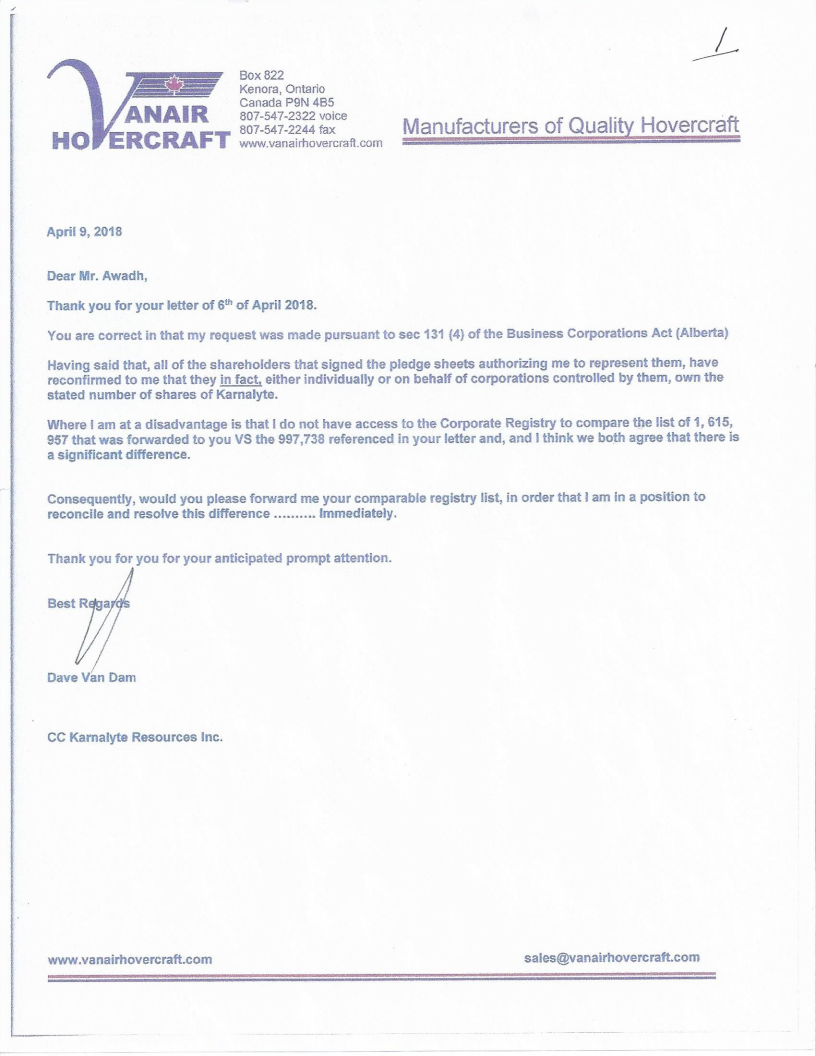
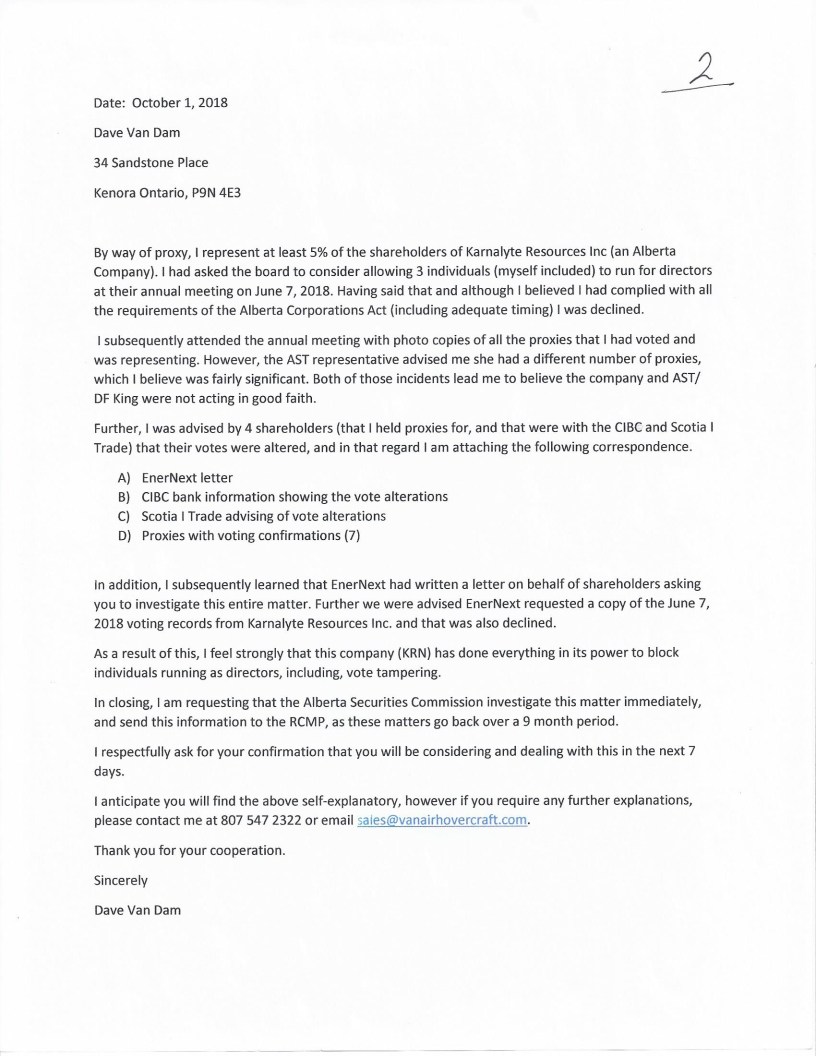
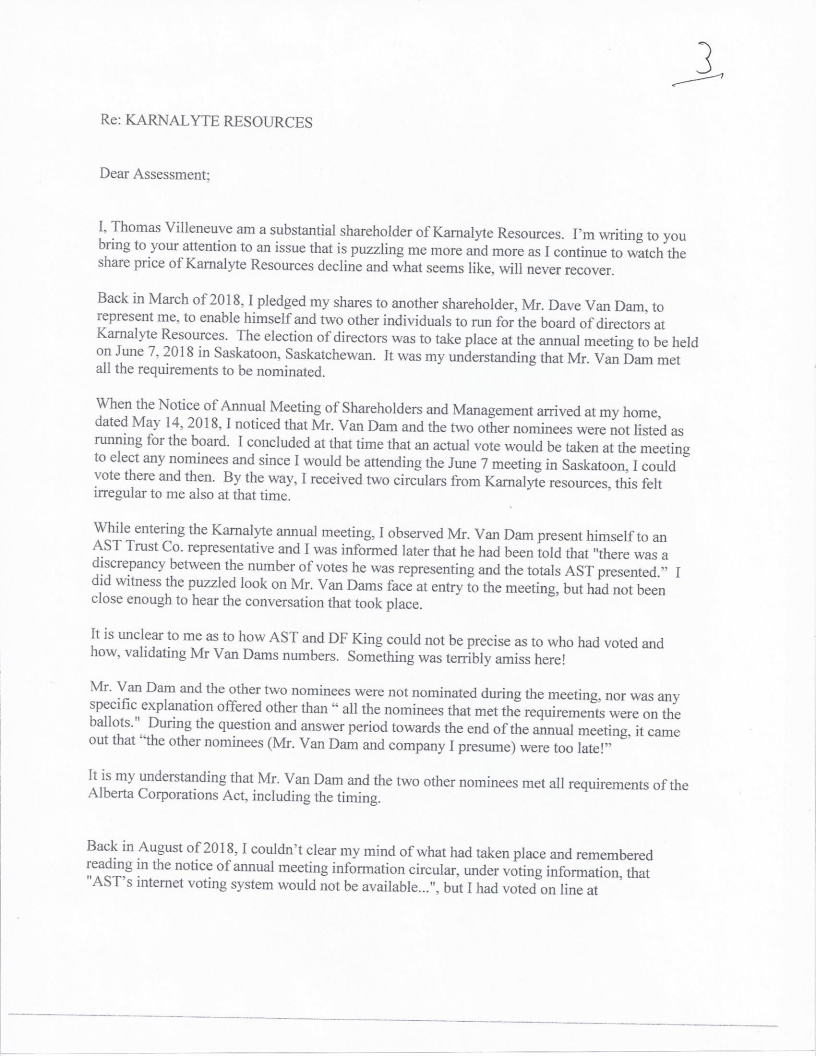
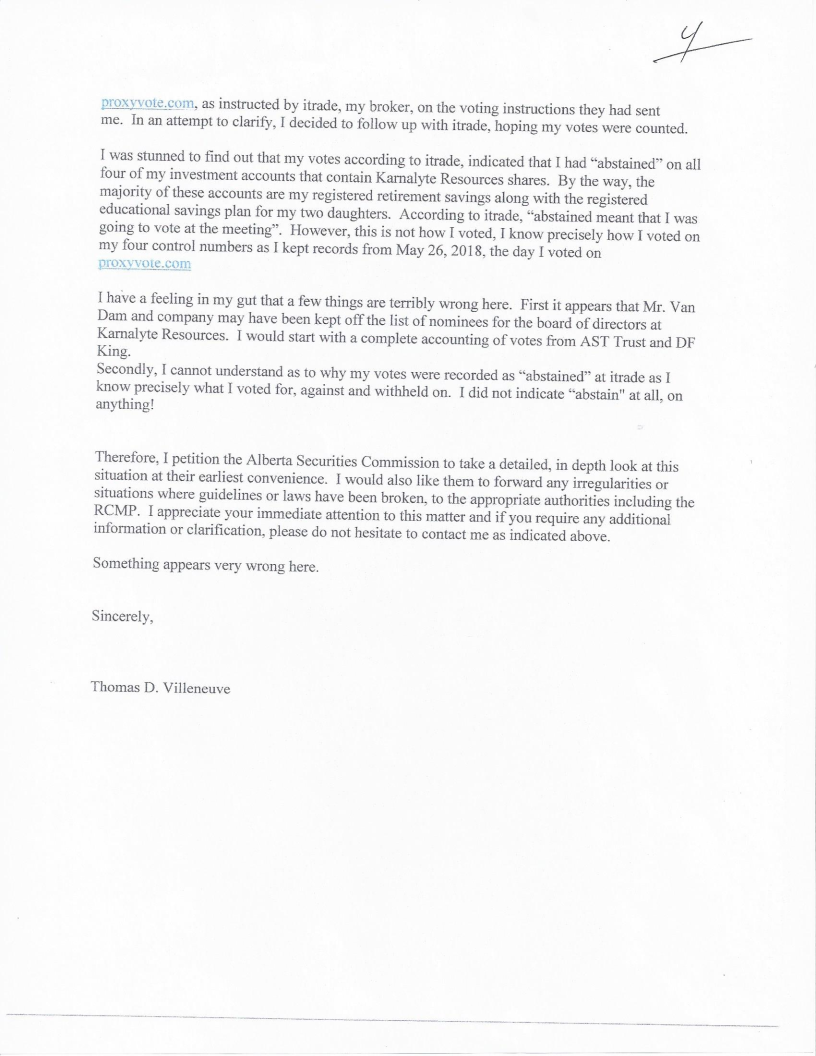
March 26, 2020 - Legal Letter and Reasons for Judgment of the Honourable Madam Justice B.E. Romaine - Against Karnalyte Resources Inc. Applicant - and - Robin Phinney, Dave Van Dam, and Dan Brown Respondents
------ Original Message ------
From: [email protected]
To: [email protected]
Sent: Thursday, April 2, 2020 12:42 PM
Subject: Fwd: Karnalyte Resources
---------- Original Message ----------
From: robin phinney <[email protected]>
To: Dave Van Dam <[email protected]>
Cc: Stan Phinney <[email protected]>
Date: March 26, 2020 at 12:54 PM
Subject: Fwd: Karnalyte Resources
Robin Phinney
From: Peter Yates <[email protected]>
Sent: Thursday, March 26, 2020 9:44 AM
To: robin phinney
Subject:FW: Karnalyte Resources
FYI
From: Peter Yates
Sent: Thursday, March 26, 2020 9:41 AM
To: 'Denise Weeres' <[email protected]> 'Tracy Clark' <[email protected]>
'Gillian Findlay' <[email protected]>
'[email protected]' <[email protected]>
Subject: Karnalyte Resources
Denise/Traci/Gillian/Sonne,
As you are likely aware, we are counsel to Robin Phinney, who is both a concerned shareholder of Karnalyte Resources (TSX: KRN) as well as a former officer and director and the founder of that company. He asked me to send along the attached letter addressing some of his concerns with activities at the company, many of which have come to light as a result of a filed affidavit by another shareholder named Dan Brown, as part of a court action in which both Dan Brown and Robin Phinney are involved (along with a third shareholder named Dave Van Dam).
I am attaching a copy of the decision of the court in that action, which is referred to in our letter, pursuant to which the court dismissed all of the claims against the respondents made by Karnalyte. I am also attaching the main body of the Dan Brown affidavit (not attaching many of the exhibits due to the file size), and am sending this separately due to file size.
This letter does reiterate many of our concerns which were previously raised but does also address some new concerns as a result of the rights offering which was undertaken by Karnalyte in late 2018.
Please review and let me know if you would like to discuss.
Many thanks
Pete
Peter W. Yates, Barrister and Solicitor
Roslyn Building
Suite 800, 400 – 5thAvenue SW
Calgary, AB T2P 0L6
Direct: (403) 971-9104
Cell: (403) 540-9104
www.enernext.ca
This email may be confidential and protected by applicable privacy law. If you are not the intended recipient, disclosure, copying, distribution and use are prohibited; please notify us immediately and delete this email from your systems. EnerNext Counsel is a law firm providing legal advice primarily to the energy and cleantech industry in Alberta.
June 12, 2018 -
Legal Letter - Voting Irregularities at Annual General and Special
Meeting of Karnalyte Resources Inc. held on June 7,
2018 in Saskatoon, Saskatchewan
---------- Original Message ----------
From: "[email protected]" <[email protected]>
To: shannon <[email protected]>, Chisato <[email protected]>
Cc: "ontario, osc" <[email protected]>,
"[email protected]" <[email protected]>
Date: February 24, 2020 at 12:14 PM
Subject: Fwd: very confidential
---------- Original Message ----------
From: "[email protected]" <[email protected]>
To: "white, harvey" <[email protected]>, "ontario, osc"
<[email protected]>, "[email protected]" <[email protected]>,
"[email protected]" <[email protected]>, ab legislature <[email protected]>
Date: February 23, 2020 at 12:02 PM
Subject: Fwd: very confidential
Please do not pass buck. my votes were changed and i have been contesting this from the meeting on. I have been drawn into a fake lawsuit by these people from krn., who have all quit because they know what they did was wrong. The osc job is to protect ONTARIO investors from these kind off matters.. Please do your job. You need to call for a audit of the 2018 election. The results of that vote and the launching of the lawsuit was done to allow them to do a unlawful share issue to secure their control of the krn asset.I have given you copies of my and 8 other accounts which were actually blocked or changed.I have since had other shareholders who said this happened to them also and have got the same run around. I know you have their info. They have copied me all their correspondence.They also went through their banks.
I am a ontario resident as are several other ontario residents. I cannot believe that i have given you proof of the the voting fraud and everyone has continued to give me the run around.. The law suit they just loss shows exactly what they were doing. This letter i received from legal
shows from day one something was wrong.
If I do not get a real answer i will be contacting the ombudsman from each province and will not stop till I get the the bottom of this.
THE VOTES WERE CHANGED AND THE VOTE COUNT FIXED.
---------- Original Message ----------
From: finn finn <[email protected]>
To: Stan Phinney <[email protected]>
Date: September 22, 2018 at 9:00 PM
Subject: Fwd: very confidential
Robin Phinney
---------- Forwarded message ----------
From: " [email protected]" <[email protected]>
Date: Tue, Sep 4, 2018 at 3:05 PM -0600
Subject: Fwd: very confidential
To: "vandam, dave" <[email protected]>, "finn, finn" <[email protected]>
---------- Original Message ----------
From: "[email protected]" <[email protected]>
To: "sudell, kathy" <[email protected]>
Date: September 4, 2018 at 12:42 PM
Subject: very confidential
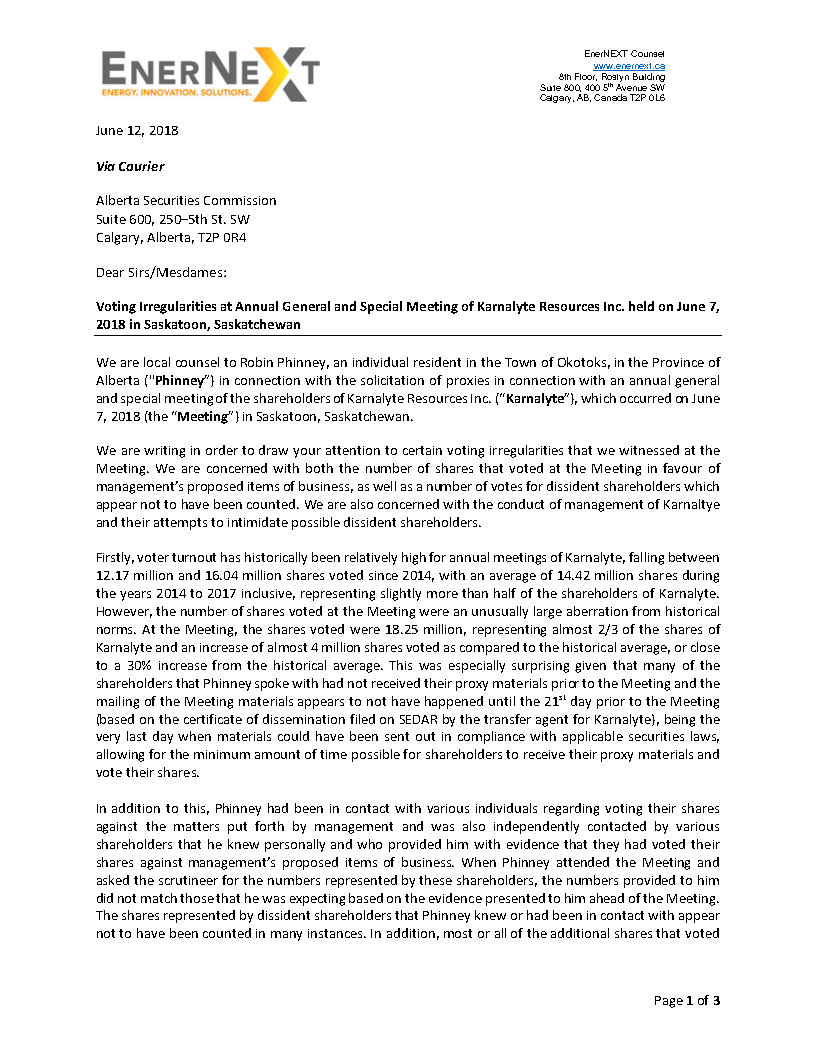
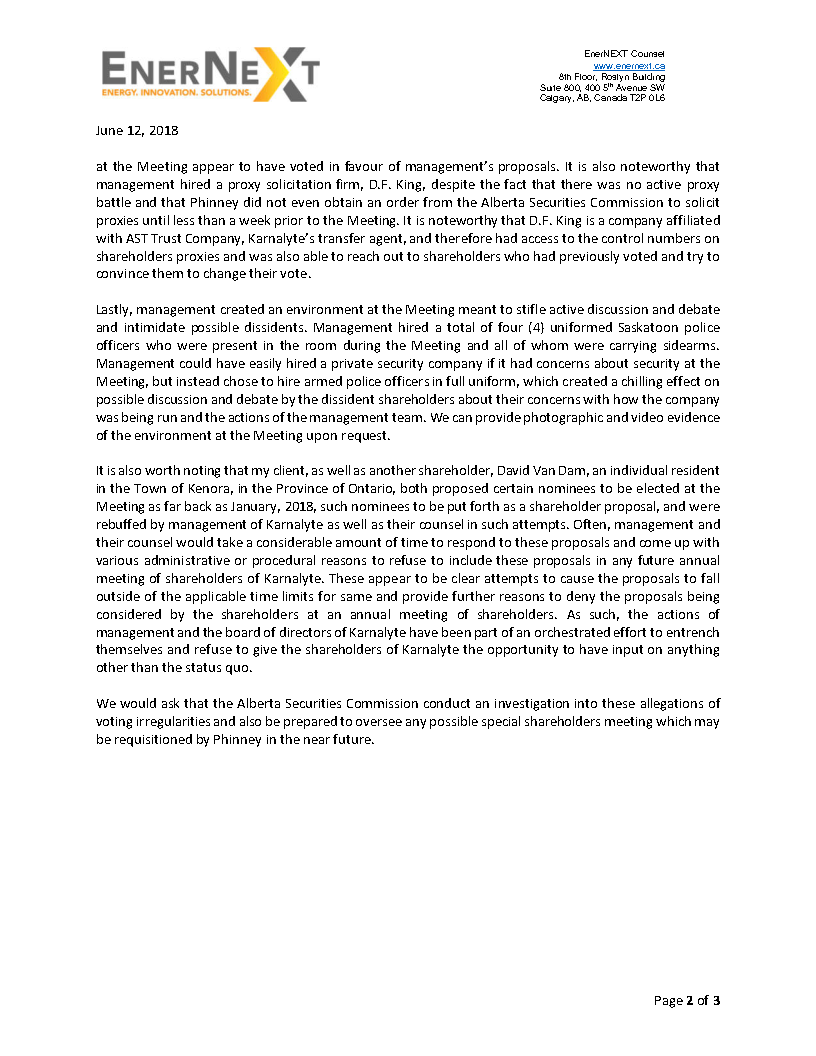
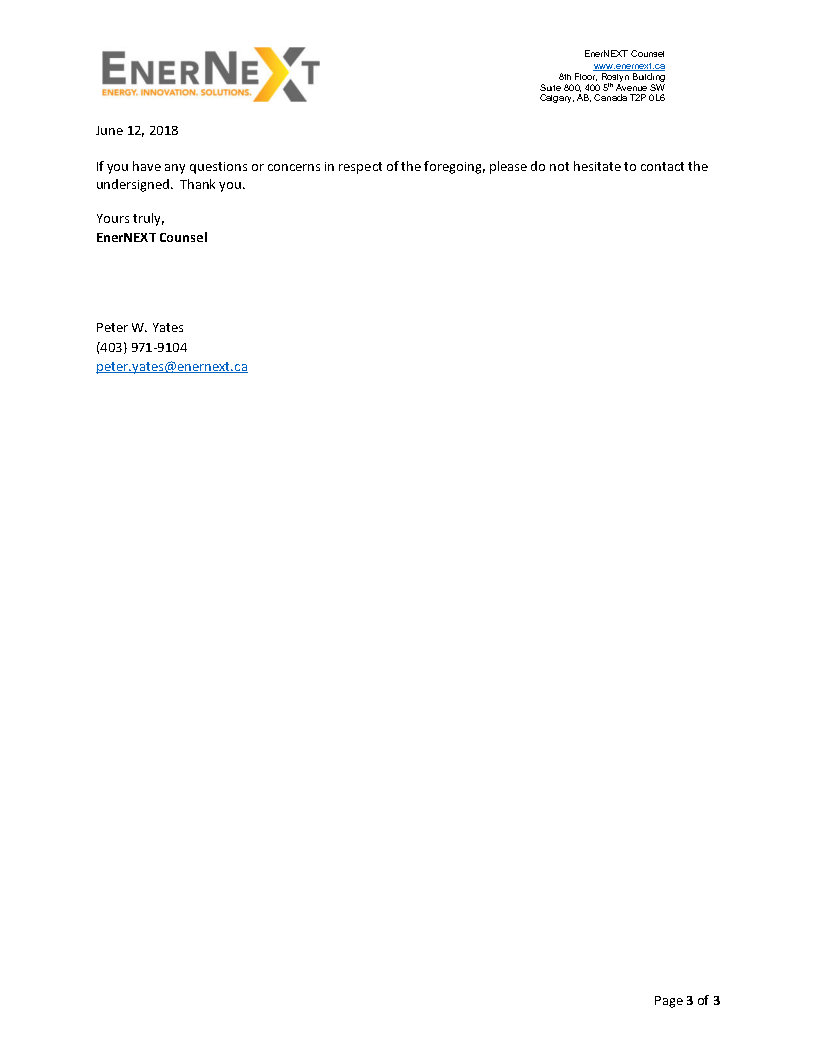
------ Original Message ------
From: [email protected]
To: [email protected]; [email protected];
[email protected]; [email protected];
[email protected]
Sent: Tuesday, April 20, 2021 11:28 AM
Subject: Fwd: PDF attached
Subject: PDF attached
PLEASE READ, How many laws have to be broken
STAN PHINNEY
[EDIT : Click Picture to enlarge]
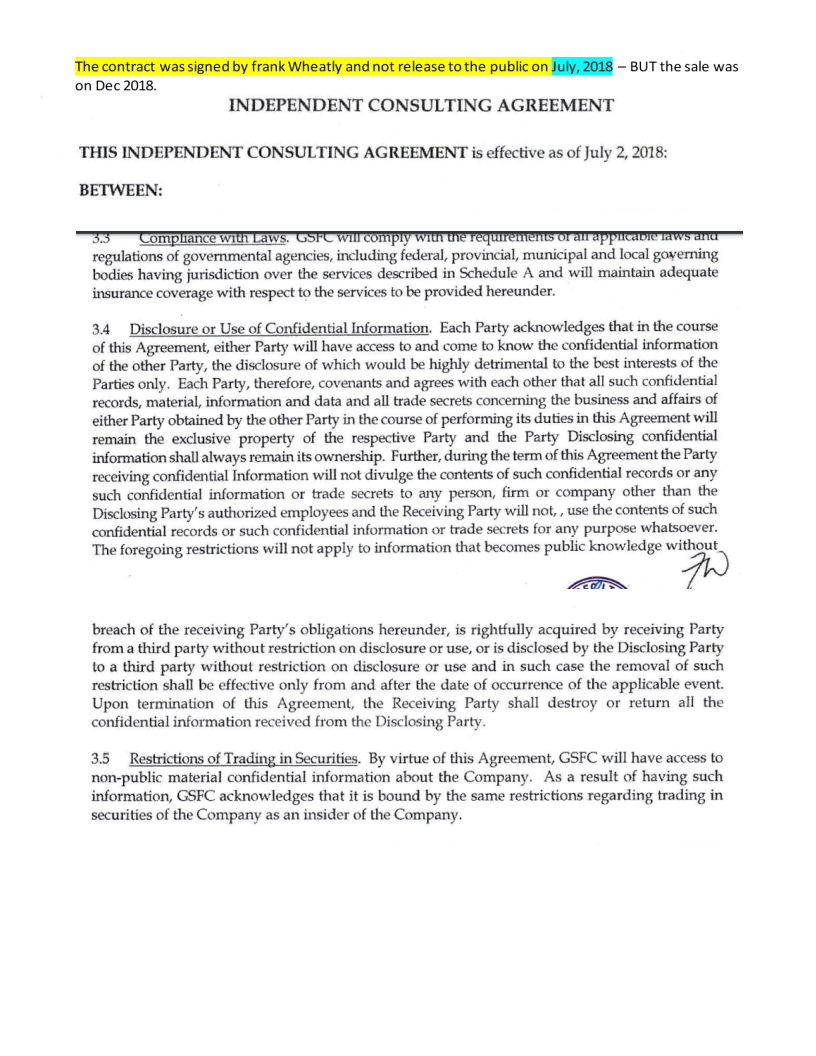
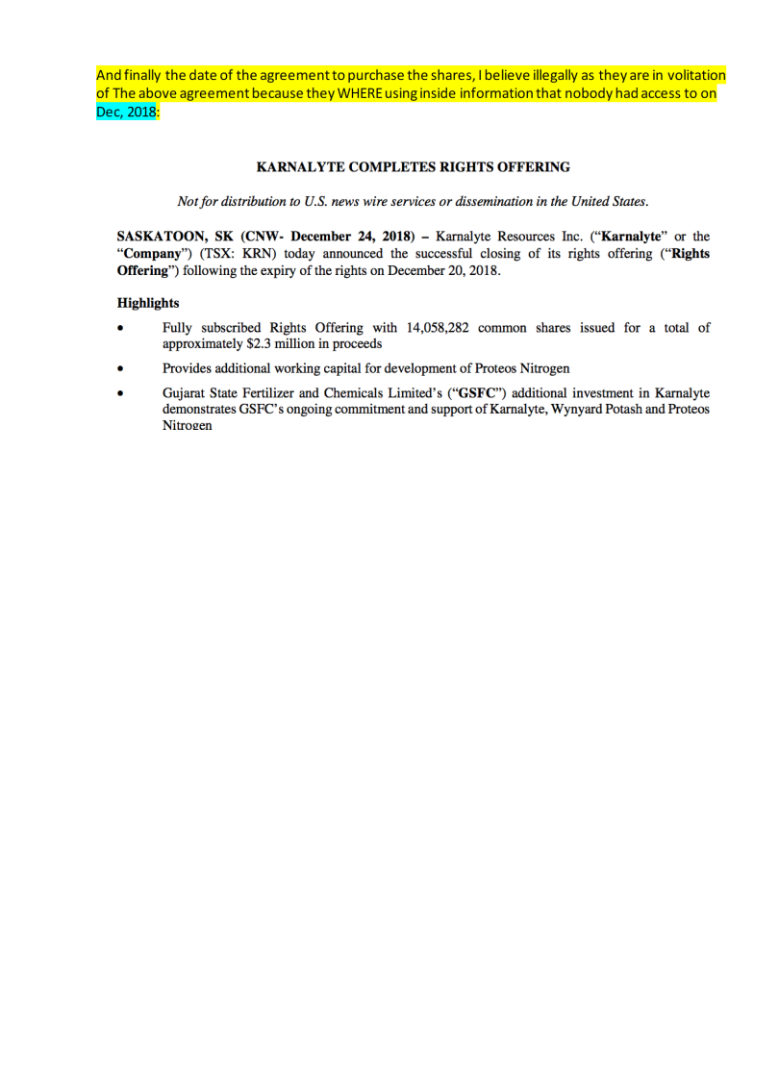
[EDIT : Dear Mr Foster - This is one of lawyer(s) that wrote you and the ASC]
[EDIT2 : No action has ever been received in regards to the below letter as of 2021-Dec-9]
March 30, 2020
VIA EMAIL
Alberta Securities Commission Financial and Consumer Affairs Authority Suite 600, 250 – 5th Street SW 1919 Saskatchewan Drive
Calgary, A.B. T2P 0R4 Regina, S.K. S4P 4H2 Dear Sirs and Madams:
|
Re: |
Potential Proxy Solicitation at the Annual General and Special Meetings of Karnalyte Resources Inc. (“Karnalyte”) held on May 5, 2017 and June 7, 2018 |
We are counsel for David Van Dam, a resident of Kenora, Ontario and a shareholder of Karnalyte. It has come to our attention that, among other things, improper proxy solicitation and other irregularities may have occurred in connection with Karnalyte’s annual general meeting that took place on May 5, 2017 (the “2017 AGM”), as well as its special meeting of shareholders that took place on June 7, 2018 (the “2018 Meeting”). Both of these meetings took place in Saskatoon, Saskatchewan.
This information came to Mr. Van Dam’s attention through documents filed in connection with a Court action—Court of Queen’s Bench of Alberta Action No. 1801-07487—that Karnalyte commenced against Mr. Van Dam and certain other shareholders, namely Robin Phinney and Dan Brown. Of specific interest is the affidavit sworn by Mr. Brown on November 23, 2018, which we understand has been provided to you by Peter Yates, counsel for Mr. Phinney, in his letter of March 30, 2020. Our concerns arising from these documents and the related events are similar to those expressed by Mr. Yates, and include the following:
- Improper Proxy Solicitation: Mr. Brown swore an affidavit in the course of Karnalyte’s action against its shareholders in which he alludes to meetings, phone calls and text messages between himself and nominees for the board of directors of Karnalyte at the 2017 AGM. Among these nominees were directors of Gujarat State Fertilizer and Chemicals (“GSFC”), one of Karnalyte’s substantial shareholders. It appears that neither the Alberta Securities Commission (“ASC”) nor the Financial and Consumer Affairs Authority (“FCAA”) granted these nominees an exemption from the proxy solicitation requirements of applicable securities laws, nor was there any dissident proxy circular filed in respect of these nominees. As such, they were not in a position to solicit
{FLG-00376125;1}
proxies from shareholders, and we are concerned that there may have been improper and possibly illegal proxy solicitation by these nominees that had a significant impact on the results of the 2017 AGM.
- Considerable Entrenchment Efforts by Karnalyte and Voting Irregularities: Mr. Brown also alludes in his affidavit to voting irregularities and efforts by Karnalyte to exclude board nominees for non- substantive and/or trivial procedural irregularities. Mr. Van Dam himself was subjected to this type of oppressive conduct leading up to the annual general meeting in 2018. After he began formally communicating with Karnalyte in January 2018, he was first told to nominate directors for election at the upcoming annual general meeting. Then he was told that his proposal to nominate directors did not comply with the applicable form requirements, and that the company would not comply in any event. Then he was told that he did not in fact represent over 5% of Karnalyte’s shareholders, which he did. Finally, after proving that he represented over 5% of Karnalyte’s shareholders, he was told that it was too late to nominate directors and that his nominees would not be included. These actions show a concerted effort by Karnalyte’s current board to frustrate shareholder democracy. It also appears that their actions may include things as malicious as tampering with shareholder votes. We understand that the concerns regarding vote tampering in connection with the 2018 annual general meeting have been raised by Mr. Yates in his letter and we echo those concerns.
Similar concerns arise regarding the rights offering that took place in late 2018, at a significantly discounted price as compared with Karnalyte’s share price at the time and with GSFC as the standby guarantor. Through the rights offering, GSFC increased its ownership stake to 38.8%, diluting all other shareholders, and now has effective control of the company. Most troubling of all, we understand that GSFC may not have paid for the shares acquired on this offering, and instead was loaned over $2,000,000 by Karnalyte to purchase the shares. We understand that this concern has been described in full by Mr. Yates in his letter. These circumstances point toward a concerted effort to consolidate the power of the current board at the expense of the shareholders.
Karnalyte’s action was recently dismissed in its entirety with costs to the defendant shareholders in reasons indexed at 2020 ABQB 119. The above concerns regarding the current board’s entrenchment efforts are enhanced by the reports that Karnalyte spent a substantial sum of money, likely over
$1,000,000, unsuccessfully prosecuting that action against its own shareholders.
In light of the foregoing, we respectfully ask that the ASC and/or the FCAA conduct an investigation into the conduct of Karnalyte’s board and the potential violations of the law and shareholder rights. We also ask that the results of the 2018 rights offering be reversed until a shareholder vote can be held on the issuance of shares pursuant to that offering, and/or the financial results from the standby guarantee can be reviewed in greater detail. Finally, we ask that the ASC and/or the FCAA order a new meeting of the shareholders to be held in order for a fair and democratic voting of the shares of the company to take
place, with nominees from all interested parties being considered and voted on. Yours truly,
Fraser / Batkin / Hanson / Tribe LLP
Per:
Oliver C. Hanson
* Incorporated Partner
[ EDIT : The documentation was provide in 100's of item sent directly to IIROC]
------ Original Message ------
From: [email protected]
To: [email protected]; [email protected]; [email protected]; [email protected]; [email protected]; [email protected]; [email protected]; [email protected]; [email protected]; [email protected]; [email protected]; [email protected]; [email protected]; [email protected]
Sent: Friday, November 5, 2021 5:12 PM
Subject: Fwd: RE: KRN - voter fraud
---------- Original Message ----------
From: Investor Inquiries <[email protected]>
To: "[email protected]" <[email protected]>
Date: June 4, 2020 at 11:05 AM
Subject: RE: KRN - voter fraud
Dear Mr. Phinney,
Thank you for your follow-up written complaint and additional documentation regarding potential voter fraud in relation to shares held at CIBC World Markets Inc.
Based on our preliminary review of the documentation provided, there is insufficient evidence to warrant further review by IIROC of this matter at this time.
One of IIROC’s primary objectives when reviewing any complaint is to determine whether there is sufficient evidence that supports a potential breach of IIROC Rules, warranting further investigation and potential regulatory action. If there are no indications of any rule violations by IIROC registrants, we would close the file with no action taken or forward the matter to the appropriate regulator for their consideration. Where there are indications of potential rule violations by IIROC registrants, IIROC would take appropriate action against those registrants. For further information on IIROC’s complaint process, please see our website here.
KRN’s Principal Regulator, the Financial and Consumer Affairs Authority of Saskatchewan (FCAA), who you have already been in contact with is in the process of investigating your complaint. Should their review conclude that an IIROC registrant played a role in the scenario you have described, they will either take action directly or forward the matter to IIROC for our consideration.
Please note that IIROC does not have regulatory jurisdiction over the general public, public companies or their officers, directors or employees. They fall under the regulatory jurisdiction of the provincial securities commissions.
Regards,
Harry Apostolatos
Sr. Complaints & Inquiries Specialist
Investment Industry Regulatory Organization of Canada
121 King St. W., Ste. 2000, Toronto, Ontario M5H 3T9
Toll free: 1-877-442-4322 | Fax: 416-364-0753
IIROC: Protecting Investors and Fostering Fair and Efficient Capital Markets across Canada.

This message is intended only for the use of the intended recipients, and it may contain information that is privileged and confidential. If the reader of this message is not the intended recipient, or an employee or agent responsible for delivering this message to the intended recipient, such reader is hereby notified that any review, retransmission, conversion to hard copy, copying, circulation or other use of this message is strictly prohibited and may be illegal. If you have received this communication in error, please immediately notify us by replying to the message and deleting it from your computer. Thank you.
Le présent message s'adresse uniquement au(x) destinataire(s) envisagé(s) et peut renfermer des renseignements privilégiés et confidentiels. Si le lecteur de ce message n'est pas le destinataire envisagé, ou s'il n'est pas un employé ou un mandataire chargé de remettre ce message au destinataire envisagé, le lecteur est par les présentes mis en garde contre le fait que l'examen, la retransmission, le transfert sur support papier, la copie, la diffusion ou toute autre utilisation de ce message est formellement interdit et peut être illégal. Si cette communication vous a été transmise par erreur, veuillez nous en aviser immédiatement en y répondant, puis supprimez le message de votre ordinateur. Merci
From: Investor Inquiries
Sent: Tuesday, May 12, 2020 12:19 PM
To: [email protected]
Subject: KRN - voter fraud
Dear Mr. Phinney,
IIROC is in receipt of your complaint referencing voter fraud with Karnalyte Resources Inc. (“KRN”:TSX) and CIBC World Markets.
IIROC is the national self-regulatory organization that oversees all investment dealers and their trading activity in Canada’s debt and equity markets. IIROC sets high quality regulatory and investment industry standards, protects investors and strengthens market integrity while supporting healthy Canadian capital markets. IIROC carries out its regulatory responsibilities through setting and enforcing rules regarding the proficiency, business and financial conduct of more than 170 Canadian investment dealer firms and their more than 29,000 registered employees, the majority of whom are commonly referred to as investment advisors. IIROC also sets and enforces market integrity rules regarding trading activity on Canadian debt and equity marketplaces.
IIROC’s jurisdiction
• IIROC does not have regulatory jurisdiction over public companies or the officers, directors or employees of those companies, or the general public. They fall under the regulatory jurisdiction of the provincial securities commissions in Canada.
• IIROC does have regulatory jurisdiction over IIROC dealer members and their registered employees (i.e. the firm where you have your brokerage account and the registered individuals that work there). Here is a list of the firm’s IIROC regulates: http://www.iiroc.ca/industry/Pages/Dealers-We-Regulate.aspx
Should a review by IIROC detect trading violations by individuals not under our jurisdiction (noted above), we refer those matters to the applicable provincial securities commission for further review and enforcement.
Please Note: IIROC does not regulate AST Trust Company (Canada), or the Board of Directors of KRN.
KRN’s principal regulator is the Financial and Consumer Affairs Authority of Saskatchewan who (if you have not already done so) you may contact using the following link:
https://fcaa.gov.sk.ca/regulated-businesses-persons/businesses/securities-industry-participants
That said, your allegation also mentions CIBC World Markets Inc. [CIBC] (an IIROC registrant). Please elaborate on what role CIBC played in this matter, and provide any further information/evidence [by return email] regarding CIBC’s involvement in the alleged fraud.
Also, you mention that this event took place in September 2018. Please explain why/how this matter is only currently a concern.
Regards,
Harry Apostolatos
Sr. Complaints & Inquiries Specialist
Investment Industry Regulatory Organization of Canada
121 King St. W., Ste. 2000, Toronto, Ontario M5H 3T9
Toll free: 1-877-442-4322 | Fax: 416-364-0753
IIROC: Protecting Investors and Fostering Fair and Efficient Capital Markets across Canada.

This message is intended only for the use of the intended recipients, and it may contain information that is privileged and confidential. If the reader of this message is not the intended recipient, or an employee or agent responsible for delivering this message to the intended recipient, such reader is hereby notified that any review, retransmission, conversion to hard copy, copying, circulation or other use of this message is strictly prohibited and may be illegal. If you have received this communication in error, please immediately notify us by replying to the message and deleting it from your computer. Thank you.
Le présent message s'adresse uniquement au(x) destinataire(s) envisagé(s) et peut renfermer des renseignements privilégiés et confidentiels. Si le lecteur de ce message n'est pas le destinataire envisagé, ou s'il n'est pas un employé ou un mandataire chargé de remettre ce message au destinataire envisagé, le lecteur est par les présentes mis en garde contre le fait que l'examen, la retransmission, le transfert sur support papier, la copie, la diffusion ou toute autre utilisation de ce message est formellement interdit et peut être illégal. Si cette communication vous a été transmise par erreur, veuillez nous en aviser immédiatement en y répondant, puis supprimez le message de votre ordinateur. Merci
From: [email protected] <[email protected]>
Sent: Tuesday, May 12, 2020 10:14 AM
To: Investor Inquiries <[email protected]>
Cc: Arseneault, Marc <[email protected]>
Subject: Fwd: RE: InquiryForm - Fraud - Complaint Our reference: 855-387746
[EXTERNAL EMAIL / COURRIEL EXTERNE]
[EXTERNAL EMAIL / COURRIEL EXTERNE]
---------- Original Message ----------
From: "Info (FCAC/ACFC)" <[email protected]>
To: "[email protected]" <[email protected]>
Date: May 11, 2020 at 11:43 AM
Subject: RE: InquiryForm - Fraud - Complaint Our reference: 855-387746
Our reference: 855-387746
PROTECTED A
Dear Stan Phinney:
Thank you for contacting the Financial Consumer Agency of Canada (FCAC) with your concerns about an investment account with the Canadian Imperial Bank of Commerce (CIBC).
In the context of consumer complaints, FCAC ensures that banks comply with certain consumer protection measures. If there are no consumer provisions that apply, we give you information about how to deal with your complaint. For more information about our mandate, click here.
It is important to note that FCAC does not regulate securities or the securities divisions of the CIBC; therefore, the matter you have raised falls outside of our Agency’s jurisdiction.
As you may already know, the securities industry in Canada is overseen by provincial and territorial governments.
Since you have already contacted the Financial and Consumer Affairs Authority (FCAA) and they are looking into the matter, for further possible assistance, you may also wish to contact the Investment Industry Regulatory Organization of Canada (IIROC). IIROC is the self-regulatory body that oversees all investment dealers and trading activity on debt and equity marketplaces in Canada. You can contact IIROC by phone at 1-877-442-4322 (toll-free), by fax at 416-364-0753, or by email at [email protected].
You can also visit its website at www.iiroc.ca.
That being said, FCAC has developed key principles to assist federally regulated financial institutions (FRFIs) in establishing their internal dispute resolution policies and procedures.
For example, according to the Commissioner’s Guidance CG-12, FRFIs should find the most efficient and effective ways of resolving complaints, particularly when complaints are simple and may be easily addressed.
Therefore, FRFIs should have policies and procedures in place that seek to achieve the following:
- Resolve consumer complaints as soon as possible. In their policies and procedures, FRFIs should outline the actions and time frames that:
- provide the consumer with an acknowledgement of receipt of their complaint without delay once the complaint reaches the first level in the FRFIs complaint escalation process;
- within 90 days or less when possible, provide the consumer with a substantive written response to his or her complaint
If you believe that the CIBC may not be following the regulations as described above according to the Commissioner’s Guidance CG-12, please provide our Agency with further details, including any communications you've had with the bank about the matter so that we may review further.
In the meantime, since FCAC is not a dispute-resolution agency for consumers in their individual dealings with financial institutions and is unable to provide redress or compensation, consumers must continue to raise their concerns with their bank directly by using its complaint-handling process. All banks must have a process to help resolve disputes with their customers. This process includes an independent external complaints body to which you can appeal. You must follow all steps of the process in sequential order.
FCAC has the complaint-handling process for CIBC on the Canada.ca website here.
You may have questions about the impact of the current COVID-19 pandemic on your finances. For more information, please visit our website here.
Again, on behalf of the FCAC, thank you for writing to us. I trust the information I have given you will be helpful.
Sincerely,
Samantha Leclerc
Consumer Service Representative
Financial Consumer Agency of Canada / Government of Canada
[email protected]/ Tel: 1-866-461-3222 / TTY: 1-866-914-6097
Représentante de service aux consommateurs
Agence de la consommation en matière financière du Canada / Gouvernement du Canada
[email protected] / Tél. : 1-866-461-2232 / ATS : 1-866-914-6097

From: [email protected] <[email protected]>
Sent: April 19, 2020 5:22 PM
To: Info (FCAC/ACFC) <[email protected]>
Subject: InquiryForm - Fraud - Complaint
Subject:
voter fraud on cibc world market voting on Karnalyte resources
FirstName:
stan
LastName:
phinney
Email:
Telephone Number:
8074677109
Organization:
CIBC Bank
Financial Institution:
Canadian Imperial Bank
Location:
Ontario
Topic:
Fraud
Comments:
In agm of krn resources , ast / king changed the votes on my accounts and others. cibc hold the shares and and allowed the accounts to be changed. I gave them the proof of the fraud in sept 5th 2018 and have had major complaints with them. I would suggest you call breana ferra at cibc. and ask them for all the info. They are completely ignoring. I have successfully got the saskatchewan FCC investigating this. If you give me a e-mail account I can forward all the legal documents. Yours truly Stan phinney
RequestType:
Complaint
Dec. 7, 2021 - Financial Consumer Agency of Canada - reference number 855-408255 response to KRN Fraud
From: "Info (FCAC/ACFC)" <[email protected]>
Date: December 7, 2021 at 11:19:01 AM EST
To: Tom Villeneuve <[email protected]>
Subject: RE: KRN 2018 Vote Fraud Our reference: 855- 408255
PROTECTED A
Dear Thomas Villeneuve:
Thank you for contacting the Financial Consumer Agency of Canada (FCAC) regarding your concerns with the 2018 annual Election of Directors meeting that was held by Karnalyte Resources Inc.
Before addressing your specific concerns, I would like to outline who we are and what we do.
FCAC protects consumers by:
- Making sure that federal financial institutions such as banks, federal loan and trust companies, and federal insurance companies obey certain laws that protect consumers called consumer provisions.
- Monitoring agreed-upon codes of conduct and public commitments made by these same institutions and by network operators.
- Informing Canadians about financial services and products and about their rights.
For more information about our mandate, click here.
While we appreciate how concerning this is for you, it is important to note that Karnalyte Resources Inc. is not a federally regulated financial institution. Therefore, the matter you raise does not fall within our Agency’s jurisdiction.
That said, we note that Karnalyte Resources Inc. is incorporated in Alberta under the Alberta Business Corporations Act. Information about the Alberta Business Corporations Act can be found here.
You may also wish to contact the Alberta Securities Commission (ASC), which is responsible for regulating the province’s investment sector. There may be rules with respect to the corporate governance of the Boards of provincially incorporated companies that they oversee.You can contact ASC by phone at 1-877-355-0585 (toll free), by fax at 403-297-6156, by email at [email protected]. You can also visit its website at www.albertasecurities.com.
[Edit : Consistently Wrong information presented to shareholders -One agency says ASC is responsible for KRN other party says FCCA(Sask.) - Please make up your mind. this email comes from Dec, 2021]
To learn more about FCAC or the federal laws that protect financial consumers, or to use our tools and calculators online, you can visit our website at www.Canada.ca/fcac. If you have any questions, please call us at 1-866-461-3222 (toll-free).
Again, on behalf of the FCAC, thank you for writing to us. I trust the information I have given you will be helpful.
Sincerely,
Samantha
Senior Consumer Services Representative | Public Affairs
Financial Consumer Agency of Canada
[email protected] / Tel: 1-866-461-3222 / TTY: 1-866-914-6097
Principale représentante du service aux consommateurs | Affaires publiques
Agence de la consommation en matière financière du Canada
[email protected] / Tel: 1-866-461-3222 / ATS: 1-866-914-6097
From: Tom Villeneuve <[email protected]>
Sent: November 29, 2021 6:26 PM
To: [email protected]; [email protected]; [email protected]; [email protected]; [email protected]; [email protected]; [email protected]; Info (FCAC/ACFC) <[email protected]>; [email protected]; [email protected]; [email protected]; [email protected]; [email protected]; [email protected]; [email protected]; [email protected]; [email protected]; [email protected]; [email protected]; Valerie Douville <[email protected]>; Chris Bittle <[email protected]>; Jennie Stevens <[email protected]>
Subject: KRN 2018 Vote Fraud
[ATTENTION] This email originated outside of FCAC. Do not click links or attachment unless you recognize the sender and know the content is safe. / Ce courriel provient de l’extérieur de l’ACFC. Ne cliquez pas sur les liens ou pièces jointes à moins que vous reconnaissiez l’émetteur et que vous savez que le contenu est sécuritaire.
As an active shareholder in Karnalyte Resources, I am requesting that you take whatever
action is required to investigate the vote fraud and suppression that took place at the
KRN 2018 annual meeting Election of Directors.
Yours sincerely
Thomas Villeneuve
28 Cole Farm Blvd.,
St. Catharines, ON L2N7E5
905-980-4590
Sent from Mail for Windows
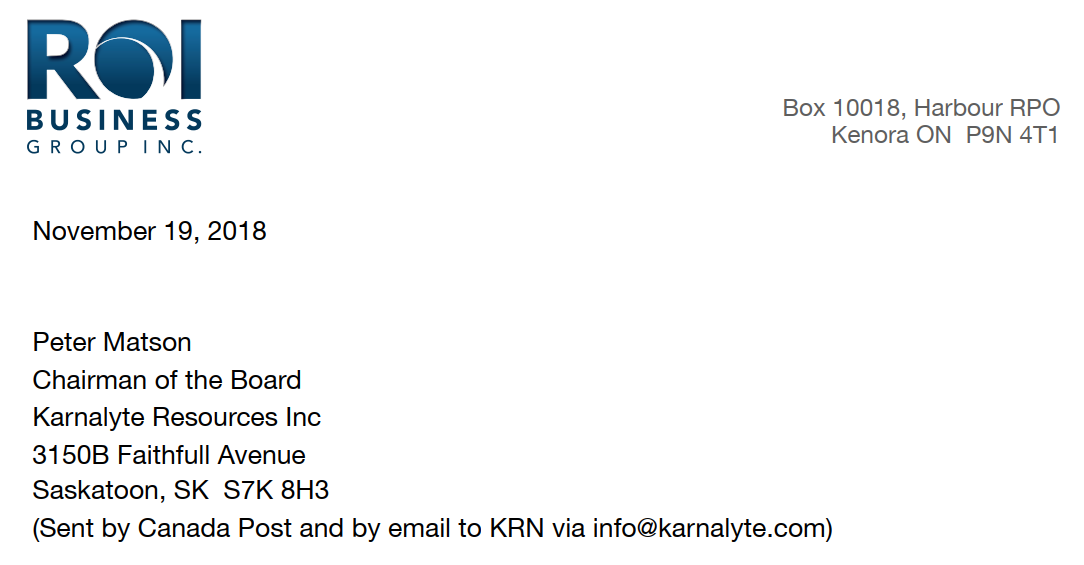
Dear Mr Matson,
As a shareholder of Karnalyte Resources Inc,, I would like to file a complaint and request your immediate action to stop what appears to be manipulative and deceptive undertakings of the Board of Directors over the past 18 months.
I believe that your Board has committed a number of securities law contraventions in the past 18 months that may include, but are not limited to:
- Deceptive and purposeful shareholder vote manipulations at 2018 General Annual Meeting of Karnalyte Resources resulting in fraudulent results being reported
- Fiduciary Duty failure of the Board to reveal offers to finance development to shareholders
- Fiduciary Duty failure of the Board to provide quarterly financial reports to shareholders
- Fiduciary Duty failure of the Board to provide Year End Financial Statements to shareholders until 15 minutes ahead of Annual Meeting
- Fiduciary Duty failure of the Board to accept nominations to the Board of Directors from shareholders with support of more than 5% of the shareholders
- Fiduciary Duty failure of the board by manipulative and deceptive activities to write off the primary assets of the corporation (Valued at more than $100 Billion dollars)
- Fiduciary Duty failure by way manipulative and deceptive activities by Board of Directors to deliver increased value for the shareholders through what appears to be short selling to drive share price down, share dilution through supposed cash grab scam on November 14 with no notice delivered to shareholders.
- Fiduciary Duty failure by way manipulative and deceptive activities to enable foreign government shareholder to increase shareholding to 47.5% thus enabling current board to take full control of company without any shareholder discussion or input.
- Fiduciary Duty failure by way manipulative and deceptive activities to change the direction of the company without shareholder discussion or input
- Fiduciary Duty and Duty of Care failure by way presenting a plan to exhaust all company cash with in 18 months, including funds raised in the current rights offer, while ignoring current valid offers to finance and failing to draw on the original financial plan that enabled a foreign company to take a significant role in this Canadian resource, a clear conflict of interest.
In Canada, Corporate Directors owe Fiduciary Duties to the corporation that they serve. Directors must ensure the corporation’s interests are paramount. It is the fiduciary duty of the director to act honestly and in good faith, with a view to the best interests of the corporation. The Fiduciary Duty also prevents directors from pursuing, for their own benefit, business opportunities that belong to the corporation. The prohibition may extend even further, creating a duty whereby directors must bring to the attention of the corporation, including shareholders, opportunities of which they become aware and in which the corporation may be interested.
Canadian corporation statutes require that when directors act, they exercise the care, diligence and skill that a reasonably prudent person would exercise in comparable circumstances - a Director’s Duty of Care.
It would appear, as a shareholder, that both Fiduciary responsibilities and Duty of Care obligations are being blatantly ignored by the current, self-appointed board.
The board of directors' key purpose is to ensure the company's prosperity by collectively directing the company's affairs, whilst meeting the appropriate interests of its shareholders and stakeholders.
That being said, please explain to me, in writing, before 5 pm on November 21, 2018 how your current “Rights Offer” and plan to completely drain the treasury within 18 months meets the appropriate interests of its shareholders and stakeholders? Email your response to [email protected] and CC the attached complaint recipients.
It would appear that you and the board are making a blatant move to give GSFC an opportunity to walk away with the company’s $100 B asset along with control of the corporation, which I believe was their original intent with their involvement with Karnalyte. I strongly urge you to stop this action immediately.
Best regards,
Charles R Jackson President
CC: David Linder, Exec Dir,. ASC, (mailed)
Delores Ivany-Fagan, Complaints, ASC, [email protected]
RCMP - Alberta Headquarters Joint Serious Offences Team (mailed)
IIROC - [email protected]
Saskatchewan Securities Commission Acting Deputy Director of Enforcement - [email protected]
Ontario Securities Commission - [email protected]
Bob Nault MP BOB.NAULT@PARL.GC.CA
Wayne Anderson MLA Highwood AB [email protected]
March 19, 2021 - Criminal Law Division (CLD) Ministry of the Attorney General (MAG)
MAG CLD Response - M-2021-4502
From: [email protected]
To: [email protected]
Sent: Sunday, November 7, 2021 2:09 PM
Subject: Fwd: MAG CLD Response - M-2021-4502
---------- Original Message ----------
From: "[email protected]" <[email protected]>
To: tmx <[email protected]>, "shufelt, tim" <[email protected]>, "ontario, osc" <[email protected]>, "ontario, attorygeneral" <[email protected]>, "of Justice, Ministry" <[email protected]>, "Leclerc (FCAC/ACFC), Samantha" <[email protected]>, iirock <[email protected]>, gov of canada <[email protected]>, geoffrey morgan <[email protected]>, "Foster, Ken FCAA" <[email protected]>, "[email protected]" <[email protected]>, enforcement <[email protected]>, "Arseneault, Marc" <[email protected]>, alberta ombudsman <[email protected]>, ab legislature <[email protected]>
Date: November 7, 2021 at 12:11 PM
Subject: Fwd: MAG CLD Response - M-2021-4502
still waiting for my answer????? voter fraud
---------- Original Message ----------
From: "MAG-Crim-Law (MAG)" <[email protected]>
To: "[email protected]" <[email protected]>
Date: March 19, 2021 at 12:20 PM
Subject: MAG CLD Response - M-2021-4502
Our Reference #: M-2021-4502
Stan Phinney
Dear Mr. Phinney:
Thank you for your correspondence of March 17, 2021 which has been referred to this office for response on behalf of the Ministry of the Attorney General.
Please be advised that the Ministry of the Attorney General is not an investigative agency.
As your concerns relate to a publicly-traded corporation, we suggest that you relay them to the enforcement branch of the Ontario Securities Commission, which can be reached at [email protected] .
Thank you for bringing this matter to our attention.
Respectfully yours,
Criminal Law Division
Ministry of the Attorney General
please do not reply directly to this message. this email account does not accept replies.
further inquiry, quoting reference # in the subject line, may be addressed to: [email protected]
The contents of this communication, including any attachment(s), are confidential and may be privileged. If you are not the intended recipient (or are not receiving this communication on behalf of the intended recipient), please notify us immediately by sending an e-mail to: [email protected] and then delete or destroy this communication without reading it, and without making, forwarding, or retaining any copy or record of it or its contents. Note: We have taken precautions against viruses, but take no responsibility for loss or damage caused by any virus present.
············································································································································
Ce message et ses pièces jointes, s'il y en a, sont de nature confidentielle et pourraient renfermer de l'information privilégiée. Si vous n'êtes pas la personne à qui ils sont destinés (ou ne les recevez pas au nom de leur destinataire), veuillez nous le dire tout de suite en transmettant un courriel à [email protected] puis les effacer de votre ordinateur sans les avoir lus et sans en avoir fait, transmis ou gardé une copie. À noter : Nous avons pris des précautions contre les virus, mais rejetons toute responsabilité relativement aux pertes ou dommages causés par la présence d'un virus quel qu'il soit.
From Orginal Article Link Here
From: [email protected]
To: [email protected]; [email protected]; [email protected]; [email protected]; [email protected]; [email protected]; [email protected]; [email protected]; [email protected]; [email protected]
Sent: Thursday, December 2, 2021 10:41 AM
Subject: Fwd: Toronto Star Article - proof of OSC incompetence
------ Original Message ------
From: [email protected]
To: [email protected]
Sent: Thursday, December 2, 2021 9:56 AM
Subject: Toronto Star Article - proof of OSC incompetence
TORONTO - Ontario’s auditor general has found the province’s securities regulator has not alerted the public to many potentially risky investments and failed to collect the majority of fines it imposed over the last decade.
Bonnie Lysyk says in her annual report that her office looked closely at 35 of the 2,029 cases between 2016 and 2021 that the Ontario Securities Commission took limited or no action on after being alerted to problems by other regulators and whistleblowers.
Lysyk’s office found that in almost half of the cases it analyzed, the OSC had sufficient information to issue a warning about potentially harmful activity to investors, but didn’t.
When the OSC did find wrongdoing and imposed fines in other cases, the auditor general found the regulator often failed to collect money.
Lysyk says another audit carried out by her office revealed the OSC imposed $525 million in fines between 2011 and 2021, but only collected 28 per cent of that money.
She says the OSC’s collection rate is so poor in part because it lacks the power to seize assets from those with unpaid fines, which is a tactic used in B.C.
This report by The Canadian Press was first published Dec. 1, 2021.
--
Randy Jackson
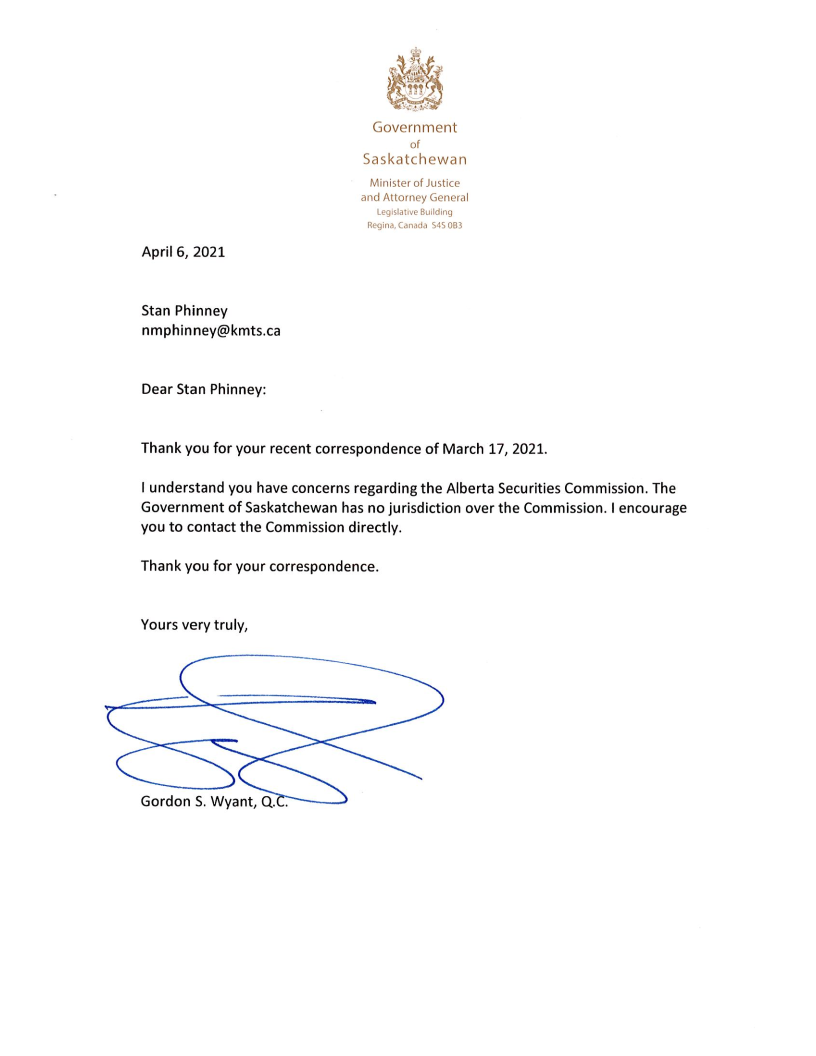
------ Original Message ------
From: [email protected]
To: [email protected]
Sent: Tuesday, April 6, 2021 2:18 PM
Subject: FW: COURT VERDICT KRN
Dear Stan Phinney:
Thank you for your email. Attached is the response from Honorable Gordon S. Wyant Q.C., Minister of Justice and Attorney General.
If you are unable to open this document, please contact us by email and we will send you the original by mail.
Regards,
Heather Filazek
Junior Administrative Assistant to the
Honourable Gordon Wyant, Q.C.
Minister of Justice and Attorney General
2405 Legislative Drive
REGINA SK S4S 0B3
Phone: (306) 787-5353 Fax: (306) 787-1232
P Please consider the environment before printing this e-mail
2021-116
From: [email protected] <[email protected]>
Sent: Wednesday, March 17, 2021 3:38 PM
To: Minister JU <[email protected]>
Subject: COURT VERDICT KRN
Hon Gordon Wyant:
This has gone to tmx and iirock and every securities , bank and federal agency. I require you to ask your agency why nothing has been done. They have copies of judgement of case 1801-07487 Court of Queens Bench Alberta..
If you have trouble getting documents which your gov agency"s have , i can have them sent.
My name is Stan Phinney
Thank You
STAN
March 15, 2021
Julieanne Head
Analyst - Compliance & Disclosure
Capital Formation
TMX
Toronto ON
Dear Julieanne,
In response to your concern: What specifically are your claims with respect to the rights offering?
My claim is that the 2018 KRN AGM vote manipulation, executed by AST/D.F. King and the resulting fraudulent election of officers enabled the illegal, self-serving Rights Offering (Dec 2018) which allowed an illegal foreign take-over of KRN by way of “Corporate Terrorism” (See Madam Justice Romaine’s judgement decision)
I also believe that at least six qualified prospective board members were intentionally blocked from the 2018 AGM election ballot, several of whom were unsuccessfully sued by KRN ahead of the 2018 election (Frank Wheatley’s sworn Affidavit claims that he intentionally blocked at least six potential board members from appearing on the 2018 AGM ballot),
I also believe that AST/D.F. King was instructed by KRN to manipulate the votes at the KRN 2018 AGM to enable the existing board to be re-entrenched. (See vote change fraud evidence already provided and verified by Madam Justice Romaine’s judgement decision, page 1),
I also believe that all shareholder complaints to AST/D.F. King and the ASC went unanswered, even after complaints were reported and filed with the Ontario Provincial Police, RCMP and Calgary Police upon advice from a Crown Attorney,
I also believe that votes at the 2018 AGM were intentionally suppressed by the board and CEO by presenting intimidating public press releases and intimidation by police presence at the AGM,
I also believe that by manipulating the votes and blocking new board members from running, the fraudulent re-election of the 2017 board resulted in further fraudulent actions and securities act violations: including, but not limited to the 2018 Rights Offering by the fraudulently elected board that led to the ultimate take-over of the company and its assets by the foreign state-owned-enterprise Gujarat State Fertilizers & Chemicals (GSFC) of India. (See Wheatley Affidavit),
I also believe that GSFC initiated the total write-down of the potash and magnesium assets in 2014 as part of their long range plan to take over the company,
I also believe that there is no evidence that GSFC actually paid for their 10,288,697 Rights Offering shares by way of cash transfer of nearly $1.8 million, but paid by way of a note payable to KRN due in 2038. Using the company treasury to pay for any share purchase is illegal. (See the ASC for details),
I also believe that board members who purchased at least 3,022,930 Shares valued at over half a million dollars may have benefited from similar accounting actions utilized by GSFC,
I also believe the Rights Offering resulted in the 38.8% SOE foreign ownership of an extremely valuable Canadian natural resources (potash and magnesium),
I also believe that the Rights Offering results enabled GSFC to strategically reduce the number of directors by half to three to ensure that two foreign based (non-independent) GSFC senior employees now control 66% of any vote at the board level which I believe is in contravention or violation of Canadian Securities regulations,
I also believe that investment divisions of major Canadian banks are processing ballots of Canadian shareholders in KRN and other companies without seeking full approval or consultation with their investment clients on how they wish to cast their votes, resulting in questionable outcomes and ethics concerns in terms of adviser/client accountability and transparency,
I also believe that all or most of my concerns noted above are shared by a majority of Canadian KRN shareholders with the clear exception of those board members who, in 2018, set out to intentionally improve their own financial resources, ahead of the needs of the company,
All information disclosed here is available in the public domain now.
We are seeking to have the ASC - as already ordered by the Court of Queen’s Bench of Alberta - completely overturn the results of the 2018 AGM election and all subsequent board decisions and actions including the Rights Offering which you have asked us to elaborate on. Hopefully this is done before investigative journalists expose the inaction and incompetence on the part of the ASC and our alleged collusion between the KRN board and AST/ D.F. King in manipulating votes at the KRN 2018 AGM.
You clearly have a stake in the game here with the forthcoming acquisition of AST. The consequences of such an exposure are a potential liability, both financial and brand, for TMX. Scandals such as this lead to pervasive mistrust of the entire Canadian securities system and its ability to self regulate.
Best regards
Stan Phinney
KRN Shareholder
From: [email protected]
To: [email protected]; [email protected]
Sent: Tuesday, November 9, 2021 11:21 AM
Subject: Fwd: FW: illegal vote of krn shareholders
---------- Original Message ----------
From: "[email protected]" <[email protected]>
To: tmx <[email protected]>, "shufelt, tim" <[email protected]>, "saskatchewan, solicitor general" <[email protected]>, "ontario, attorygeneral" <[email protected]>, "of Justice, Ministry" <[email protected]>, "Leclerc (FCAC/ACFC), Samantha" <[email protected]>, iirock <[email protected]>, gov of canada <[email protected]>, geoffrey morgan <[email protected]>, "Foster, Ken FCAA" <[email protected]>, "Ferrara, breana" <[email protected]>, "[email protected]" <[email protected]>, enforcement <[email protected]>, "Arseneault, Marc" <[email protected]>, ab legislature <[email protected]>
Date: November 9, 2021 at 11:20 AM
Subject: Fwd: FW: illegal vote of krn shareholders
---------- Original Message ----------
From: "[email protected]" <[email protected]>
To: "ontario, osc" <[email protected]>, ab legislature <[email protected]>, "[email protected]" <[email protected]>
Date: February 19, 2020 at 3:30 PM
Subject: Fwd: FW: illegal vote of krn shareholders
Now that the court has ruled on the illegal act of krn. who will tell me why my vote and others were changed. I want an answer. They have violated multiple laws.
Stan Phinney
---------- Original Message ----------
From: Marc Arseneault <[email protected]>
To: "[email protected]" <[email protected]>
Cc: "[email protected]" <[email protected]>, Complaints <[email protected]>, Harvey White <[email protected]>
Date: December 20, 2018 at 1:28 PM
Subject: FW: illegal vote of krn shareholders
Mr. Phinney,
Thank you for your email regarding Karnalyte Resources Inc.
The ASC is responsible for administering Alberta securities laws, including investigating, prosecuting and sanctioning breaches. The ASC also refers complaints to other regulators or self-regulatory bodies when appropriate.
In Canada, securities regulation is governed provincially, with regulators cooperating and working together to protect investors as much as possible. Corporations that issue securities in Canada are primarily responsible to their “principal regulator”. With respect to your complaint, please note that the principal regulator of Karnalyte Resources Inc. is the Financial and Consumer Affairs Authority of Saskatchewan (FCAA). Therefore, FCAA would be responsible for evaluating concerns, investigating issues, and taking any actions against the company. The ASC has taken the liberty of forwarding your complaint by way of this email to the FCAA for assessment. If staff of the FCAA requires additional information or wish to follow up with you, they will contact you directly.
As for any allegations of criminal activity, I note that you have contacted a number of law enforcement agencies which are the proper authorities to consider that aspect of your complaint.
Regards
|
|
Marc Arseneault |
|
|
THIS MESSAGE IS INTENDED ONLY FOR THE USE OF THE ADDRESSEE AND MAY CONTAIN INFORMATION THAT IS PRIVILEGED AND CONFIDENTIAL. |
||
From: [email protected] <[email protected]>
Sent: December 18, 2018 4:01 PM
To: ontario, osc <[email protected]> Complaints <[email protected]>
Subject: illegal vote of krn shareholders
To whom it may concern:
I have called the RCMP in Calgary, Saskatchewan, Ontario. I have called the Saskatoon police, OPP, and the Toronto police. They have copies of the voting alteration by AST/king as supplied at KRN election. All said they can not charge them or follow up until one of you decide to give them a go
This is an absolute fraud and criminal. Do I need to hire a lawyer to force you to enforce the laws that you are paid to protect?
thanks for a positive response
Stan Phinney
Dear fellow friends and shareholders of KRN.
I would like to thank you for your outstanding response. I received over 125 complaints representing over
200 shareholders. We now have the website up and running and it is designed to get our message out to all parties responsible for this mess. I encourage you to post any serious complaint you have made from the start of Feb. 2018.
I would ask that you only make professional submissions and always identify yourself. The site is user-friendly. I have thousands of emails and correspondence that I and other shareholders will be posting. We have to keep the pressure on the agencies and financial institutions that are allowing this to continue.
Yours truly
Stan Phinney
Email from the Government of Saskatchewan - FCAA
From: [email protected]
To: [email protected]
Sent: Friday, December 3, 2021 6:22 PM
Subject: RE: Fwd: Saskatchewan passes new securities legislation to strengthen investor protection | IIROC
Mr. Phinney
The legislation referred to in the news release is 2019, CHAPTER 23, An Act to amend The Securities Act, 1988 (Assented to May 15, 2019), which I’ve attached. The specific amendments mention in the attached document are found in Section 151.2, 153 and 154 of The Securities Act, 1988. A link to The Securities Act, 1988, can be found on the FCAA’s website at https://fcaa.gov.sk.ca/regulated-businesses-persons/businesses/securities-industry-participants/securities-laws.
Ken Foster
Financial and Consumer Affairs Authority of Saskatchewan
Investigator
Securities Division
601-1919 Saskatchewan Drive
Regina, Canada S4P 4H2
Bus: 306-787-7840
Fax: 306-787-5899
This email (including attachments) was intended for a specific recipient, it is confidential and may contain information that is privileged or otherwise exempt from disclosure under applicable law. No waiver of confidentiality or privilege nor consent to disclosure may be inferred from the electronic nature or transmission of this communication. If you are not the intended recipient, your use, dissemination, copying or retention of this email is strictly prohibited. If you have received this email in error or are not a named recipient, please immediately notify the sender, by return email, and destroy all copies of this email in your possession.
|
|
Nov. 29, 2021 - The initial request for help with ongoing investigations
November 29, 2021
To All Friends and Family Shareholders of Karnalyte Resources
I am seeking your help on behalf of all of us !
For the past 38 months, I have been fighting to get each and every Canadian Securities regulator to investigate how and why AST/ D F King (now owned by the TSX) and the CIBC changed my votes along with well over 4,000,000 votes of 40 other shareholders in the 2018 KRN Election of Directors. I have proof of how I voted and how AST recorded different numbers prior to and at the 2018 annual meeting. To date, I have received no answers.
Perhaps your votes were changed too ????
As you can see at https://ca.finance.yahoo.com/quote/KRN.TO/history?p=KRN.TO there is a significant number of shares changing hands daily (approx. 200,000 daily on the retail TSX market) so I believe we need to act quickly and as a group, if we want to salvage our investment. The Alberta Court of Queen’s Bench has stated that there were votes changed and suppressed in the 2018 election resulting in a number of illegal activities by the board but it appears that the regulators have done nothing in response.
Please use the link below (copy and paste) to have your voice heard by the Attorney and Solicitor Generals of Alberta, Saskatchewan and Ontario, the heads of the Alberta Securities Commission and Ontario Securities Commission, the TSX, TSX Trust (formerly AST), IIROC, and the FCAC (Federal Consumer Agency of Canada) and other stakeholders. Please copy your provincial and federal Members of Parliament.
If you can fire off a request to investigate by Wed Dec 1, we might get things moving to have the regulators or courts overturn the 2018 election and move forward from there.
Thank you for your assistance. Please forward this to anyone you know with shares.
Stan Phinney - KRN Shareholder
File Link Dec 2012 Request
KRN Voter Fraud Request for Submitting letters to the government
(cut and paste to OutBox:)
[email protected]; [email protected]; [email protected]; [email protected]; [email protected]; [email protected]; [email protected]; [email protected]; [email protected]; [email protected]; [email protected]; [email protected]; [email protected]; [email protected]; [email protected]; [email protected]; [email protected]; [email protected]; [email protected]
(cut and paste) Suggested Subject Line: KRN 2018 Vote Fraud
(cut and paste) Suggested Request:
As an active shareholder in Karnalyte Resources, I am requesting that you take whatever action is required to investigate the vote fraud and suppression that took place at the KRN 2018 annual meeting Election of Directors.
Yours sincerely
Your Name







